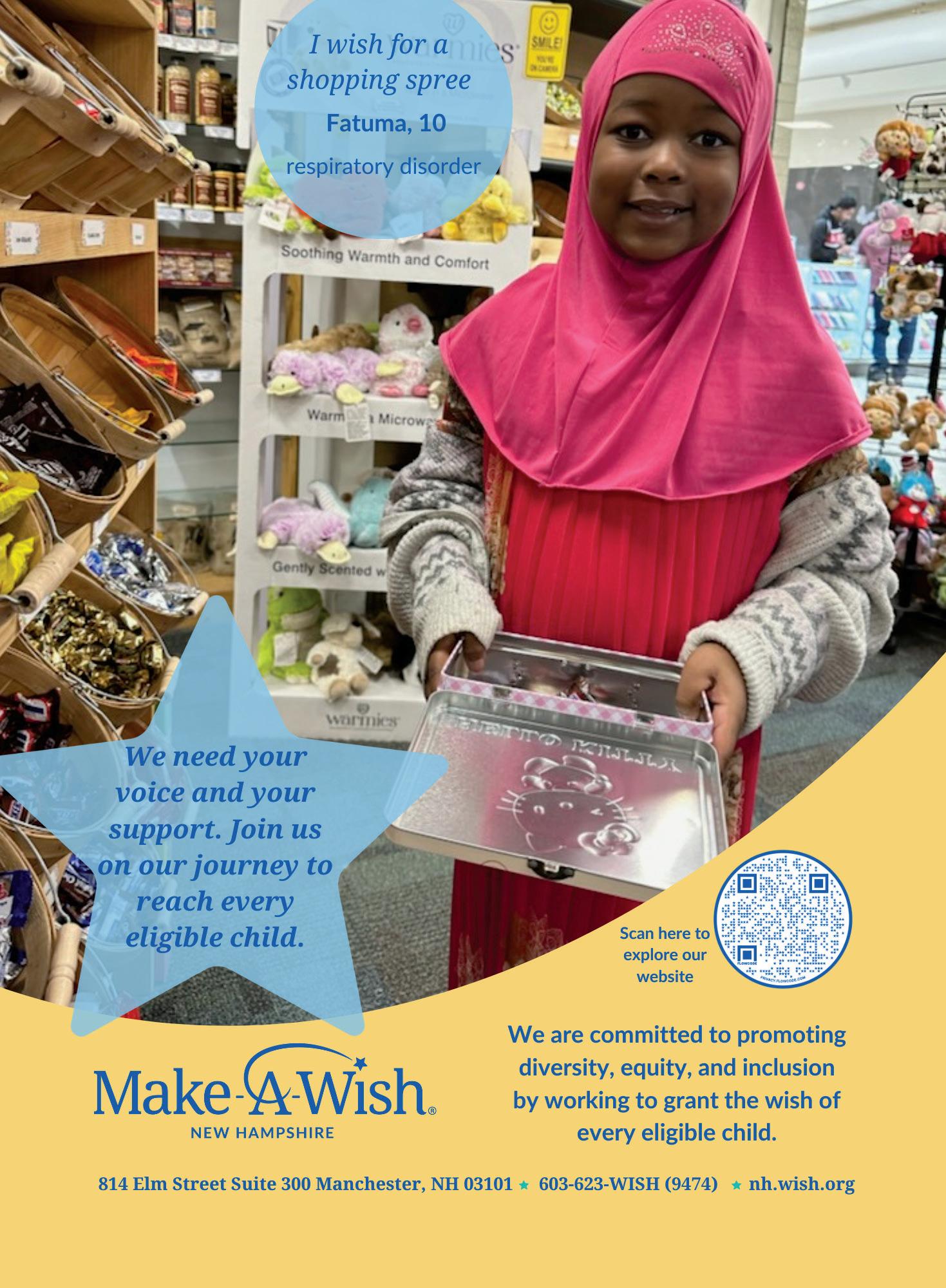ROLLER DERBY FINDS STRENGTH IN DIFFERENCES





Many of New Hampshire’s largest cities celebrated their LGBTQ+ communities in June, but for other areas, fall is the time for festivities.
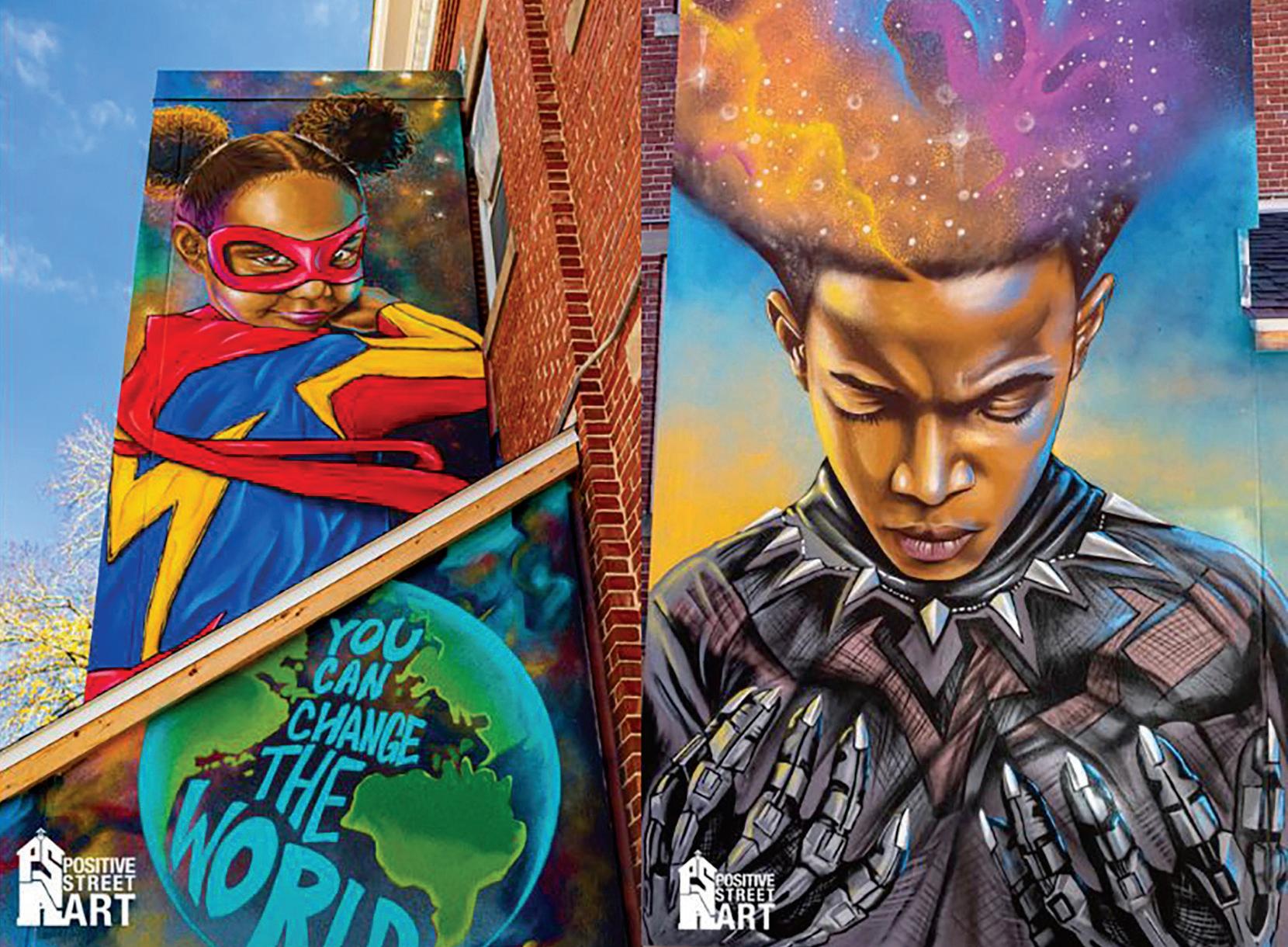


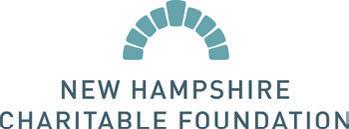
We’re pleased to offer several Pride-related items in this issue, which we’re putting the final touches on in early July, right after June’s Pride celebrations. Check out page 17 for a story on trans athletes finding welcome in roller derby in New Hampshire, a photo essay on page 20 highlighting the Pride festivities in Manchester, and a preview of two Pride events slated for early fall: the North Country Pride Ride and Keene Pride on page 22.
My fiancée and I attended the Pride event in downtown Manchester and were glad to see how much it has grown and the huge outpouring of community and corporate support it received.
While there, we ran into a good friend and incredible human being, Thomas Carter, regional director at Freedom Energy, and I was reminded of a post that Thomas had written on Facebook on June 2. It was such an eloquent, beautiful and powerful explanation of why Pride still matters. I’m going to share, with his permission, the whole thing here. It explains why we dedicate space to Pride issues far better than I could.
‘change’. Reading the description of Matthew as a ‘sensitive, sweet soul’ was startlingly similar to how I was always described. On so many levels, I identified with this young, gay 21-year-old who was brutally beaten and murdered.
“So my lifetime of religious dogma compounded this awful news break. I knew that to admit to my hardwiring would have me lose my home and community. Now I saw that, because God simply made me different, it could also lose me my life.
“It took me until age 37 to finally shake off the fear and confusion that came with growing up as a closeted gay millennial. It was a breathtakingly impossible crucible. The first months of 2021 held numerous dark days when it felt easier to end it all than to continue facing rejection from loved ones who had called me ‘friend.’
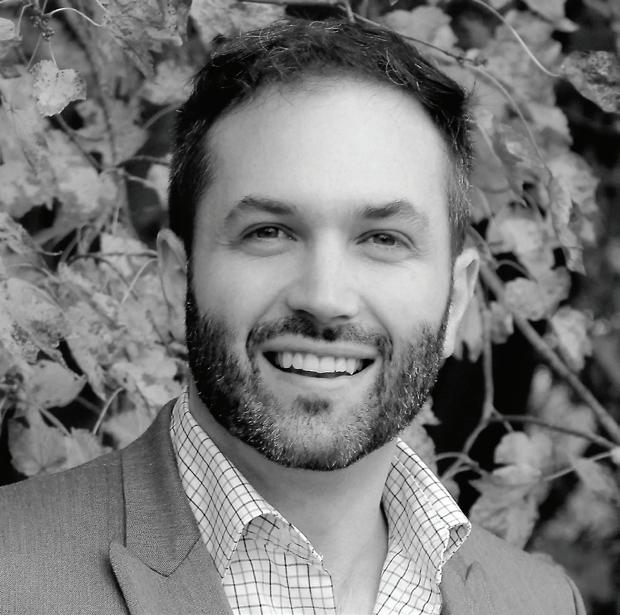
“Myriad Pride month posts abound. And I’ve been surprised at the response of many, even my queer folks, to the month of recognition. Some ambivalence and even annoyance at this rainbow month. Please, take a second to remind yourself why this recognition is critically necessary.
“I was 15 years old when I read about the murder of Matthew Shepherd in Newsweek magazine. As a homeschooled teen in a religious home, Newsweek was my only media insight into the ‘secular world’.
“It shook me. By my mid teens, I was already well aware that I had zero attraction to women and only to men. But I was taught that it could
“Two months ago, a friend of mine took his own life, at only 35 years old. I know dozens of men and women who remain in closets, because opening that door means losing their communities, their security ... even their family and their home. This still matters, folks.
“So please remember this as your life is inconvenienced this month by colorful posts and messages. It may not be visible to you, and you may think, ‘the work is done’, or ‘it’s accepted now, what’s the big deal?’ But please know that invisible closets still exist all around you. Pride month is vital for remembering those who have been forerunners in this struggle for acceptance. And it’s critical to encourage and celebrate our rainbow siblings who are still struggling to open closet doors.” 603




Contributing Writers
Alberto Ramos
Amara Phelps
Trisha Nail
James McKim
Will Arvelo
Lisa Carter
Karen Jamrog
Suzanne Laurent
Yasmin Safarzadeh
Contributing Photographers
Robert Ortiz
Jennifer Hauck
Contributing Artist
Richard Haynes
Editor/Publisher
Ernesto Burden x5117 ernestob@yankeepub.com
Managing Editor Mike Cote x5141 editors@603diversity.com
Managing Editor, Custom Publishing Sarah Pearson x5128 sarahekp@yankeepub.com
Creative Services Director Jodie Hall x5122 jodieh@yankeepub.com
Graphic Desinger Christian Seyster x5126 christians@yankeepub.com
Senior Production Artist Nicole Huot x5116 nicoleh@yankeepub.com
Sales Executive John Ryan x5120 johnr@yankeepub.com
Operations Manager Ren Chase x5114 renc@yankeepub.com
Digital Operations and Marketing Manager Morgen Connor x5149 morgenc@yankeepub.com
Billing Specialist/IT Coordinator Gail Bleakley x113 gailb@yankeepub.com
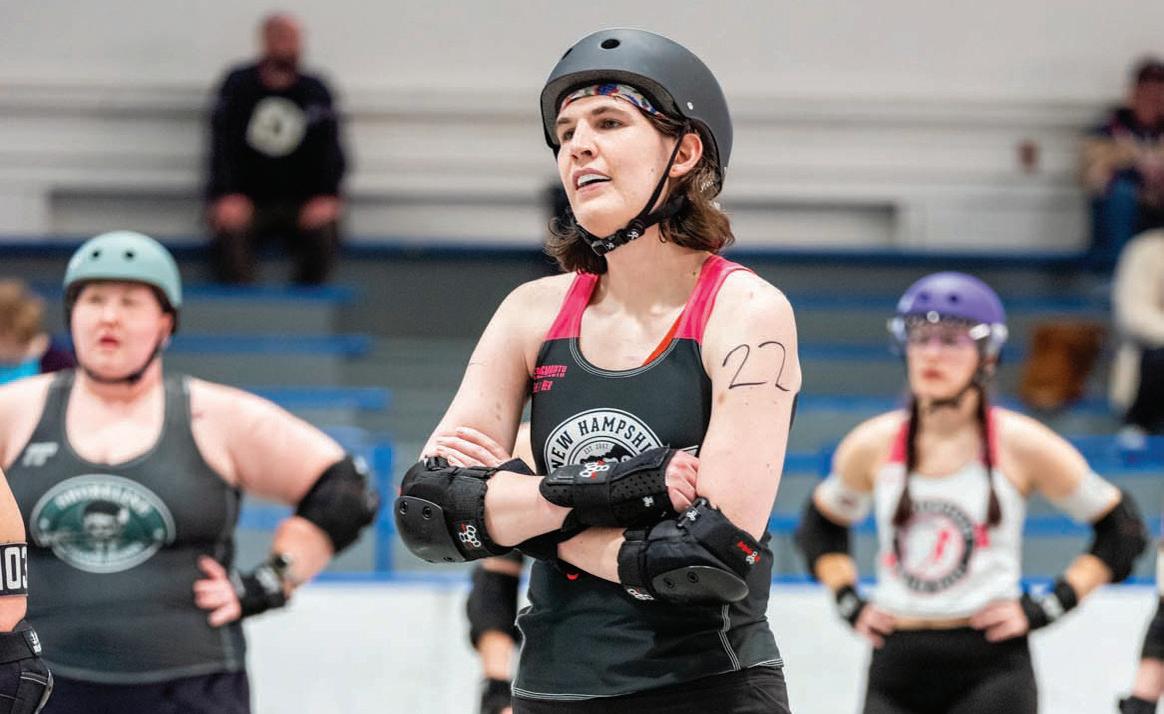
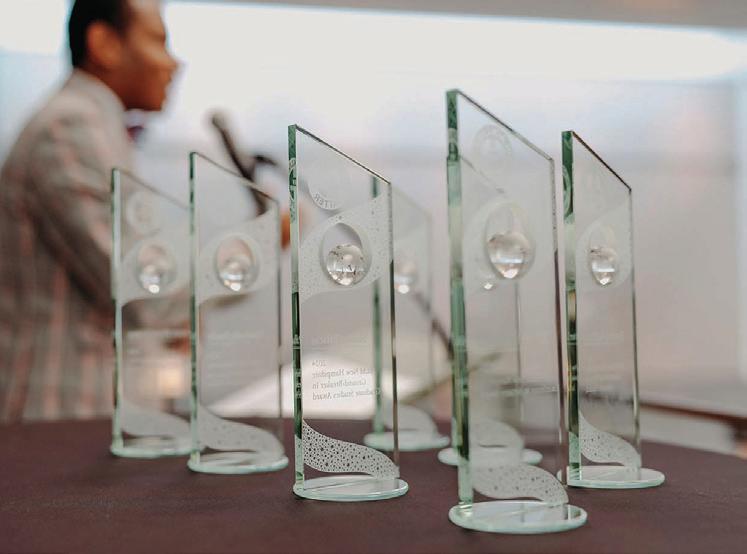
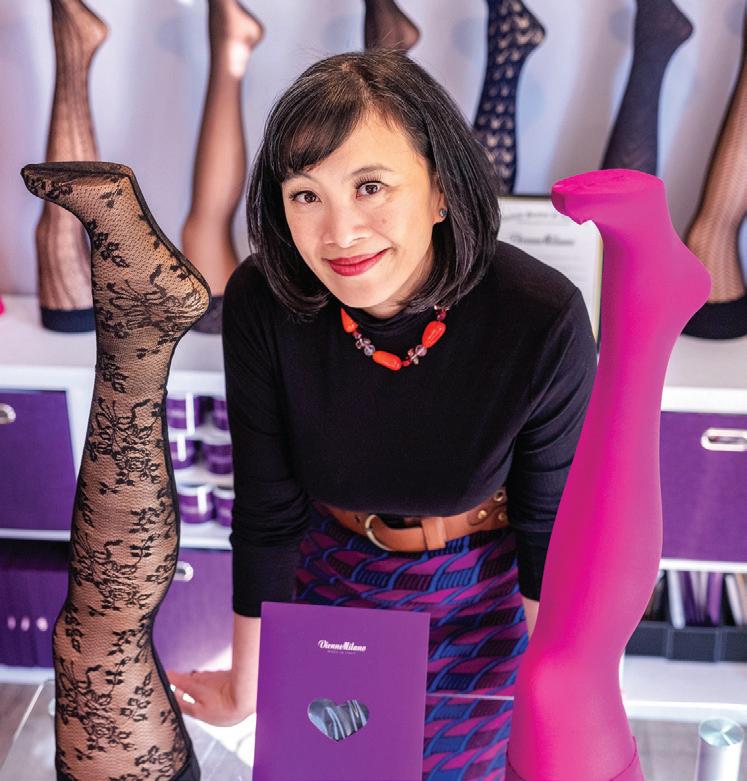
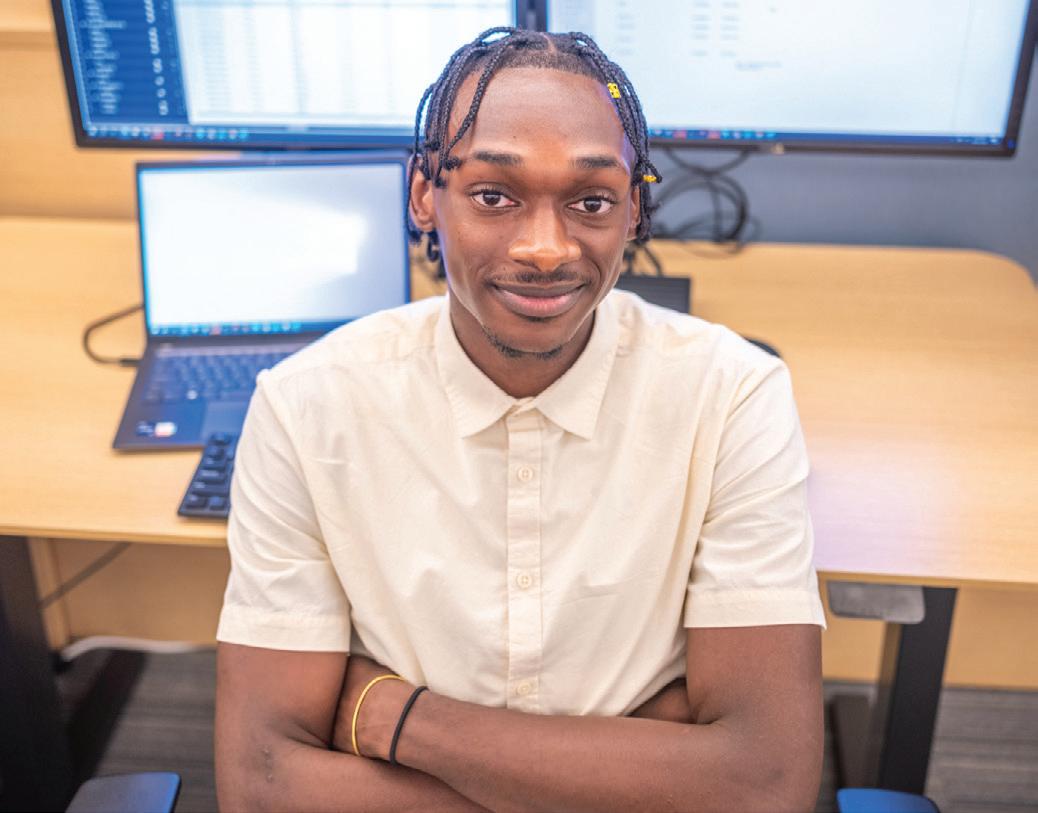


To illustrate the mission of 603 Diversity, Seacoast artist Richard Haynes has provided one of his recent designs to accompany our motto “Live Free and Rise.” We are selling T-shirts and other merchandise featuring Haynes’ design, or a design created by art student Chloe Paradis, to benefit the Manchester Chapter of the NAACP Visit 603Diversity.com to buy one today.





The 603 Diversity underwriters provide a significant financial foundation for our mission, enabling us to provide representation to diverse communities and for diverse writers and photographers, ensuring the quality of journalistic storytelling and underwriting BIPOC-owned and other diverse business advertising in the publication at a fraction of the typical cost. We’re grateful for our underwriters’ commitment to diversity, equity and inclusion in this magazine, their businesses and their communities.
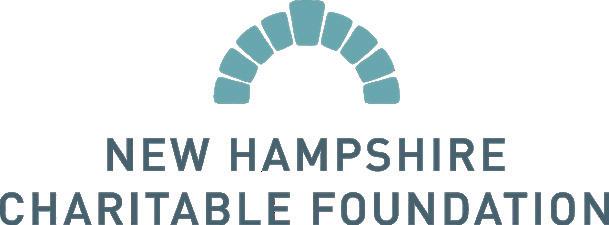








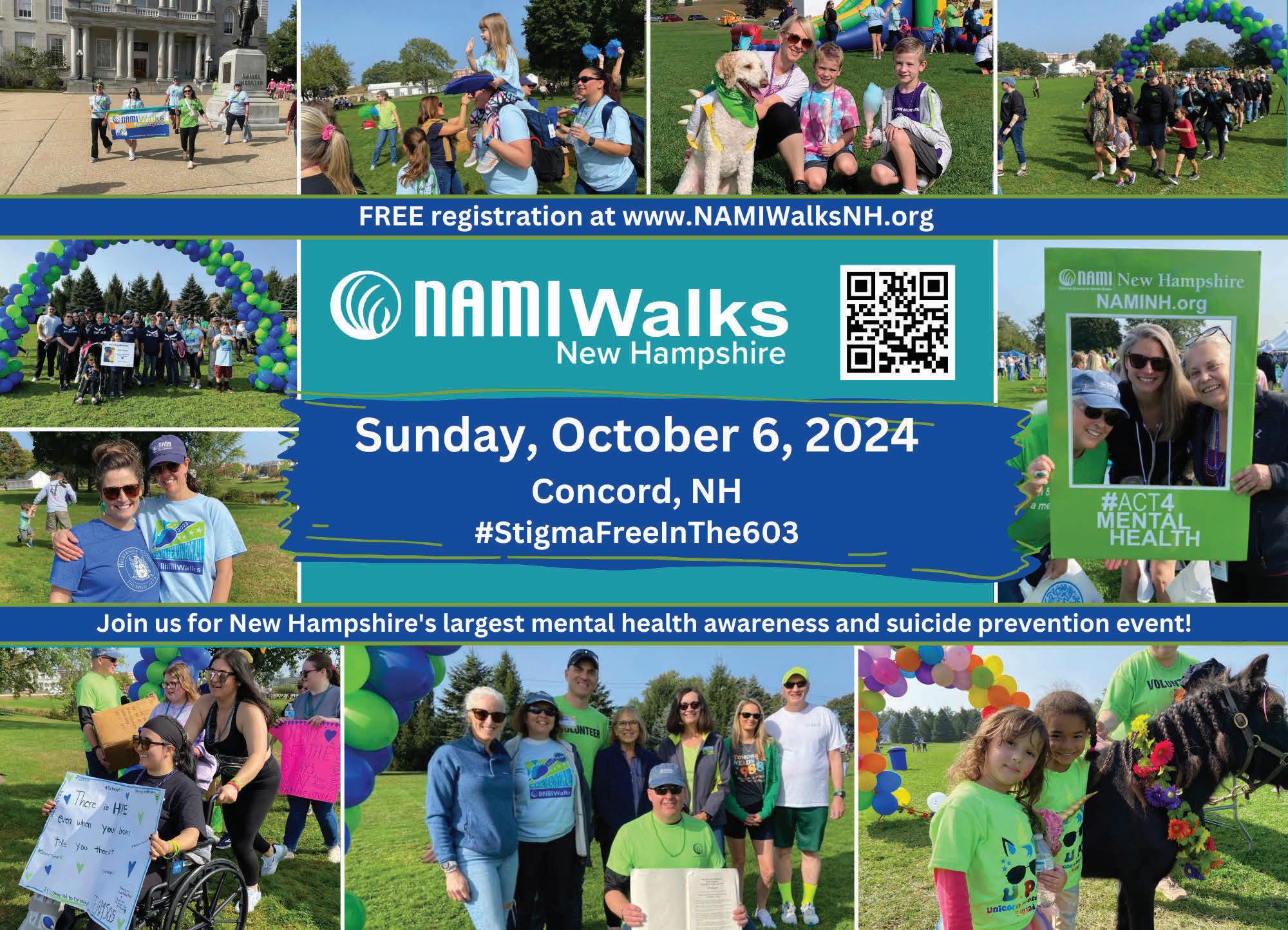

Lisa Carter is a serial entrepreneur with a passion for building brands. As the owner and chief engagement officer of Drinkwater Marketing and Productions, she works with small businesses and large enterprises to develop brand, digital and event marketing strategies to drive revenue. Prior to launching Drinkwater, she spent more than 20 years in the corporate sector building product and brand strategies for top Fortune 500 companies such as The Limited Corporation, Timberland Footwear and Staples Inc.
Mike Cote is the editor of the New Hampshire Group for Yankee Publishing, which includes New Hampshire Magazine, NH Business Review and 603 Diversity. Cote also co-hosts the weekly “Down to Business” podcast with Managing Editor Amanda Andrews. The Manchester native has worked for newspapers and magazines in New Hampshire, Colorado and Florida.

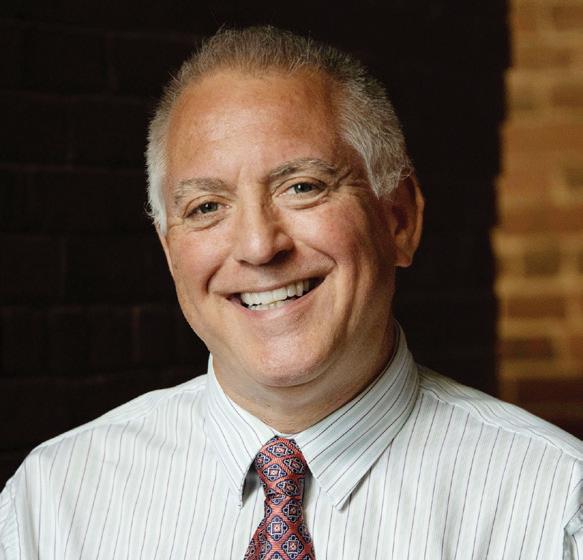
Musician and community organizer Amara Phelps loves to engage with her city of Manchester in more ways than one: fronting her popular local rock band Cozy Throne, teaching and sharing art in southern New Hampshire, and promoting community events and efforts for local publications, including Manchester Ink Link.
Dr. Wildolfo Arvelo is executive director of Cross Roads House, the second largest homeless shelter in New Hampshire. Prior to Cross Roads House, Arvelo served as director of the Division of Economic Development for New Hampshire. From 2007-2017, he served as president of Great Bay Community College in Portsmouth. Arvelo has a doctorate in educational leadership from the University of Massachusetts–Boston.
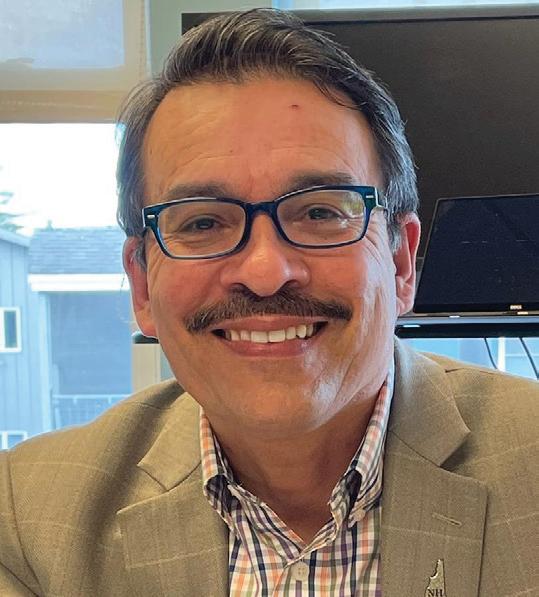
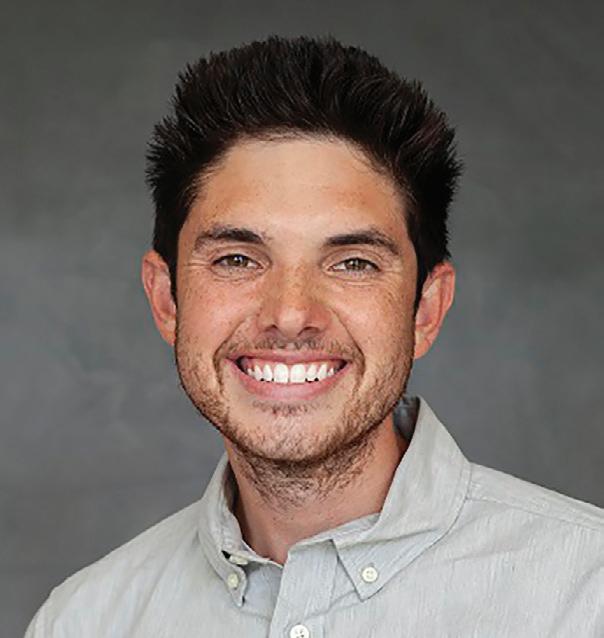
Alberto Ramos heads the recently formed Center for Inclusion, Diversity, Equity and Access at Plymouth State University. He serves as the chief diversity officer and affirmative action officer. He has partnered with PSU Black and Latinx student unions, PSU Pride, the Multicultural Club, faculty and staff to form a council of principal advisors and launched a Student Leadership Program. Ramos holds an M.A. in teaching English as a second language, and a B.A. in communication studies and travel and tourism.
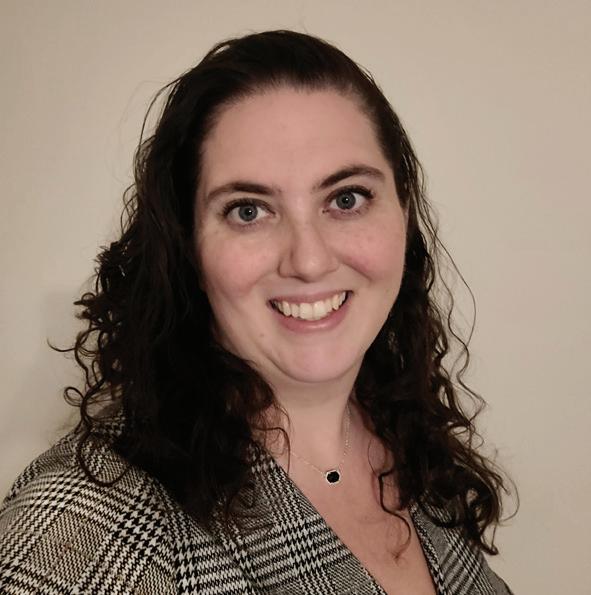
Sarah Pearson is managing editor of custom publications for Yankee Publishing, which produces 603 Diversity and many other titles. She is an awardwinning editor and journalist who previously worked for a newspaper. She is a lifelong New Hampshire resident and mother of two boys.
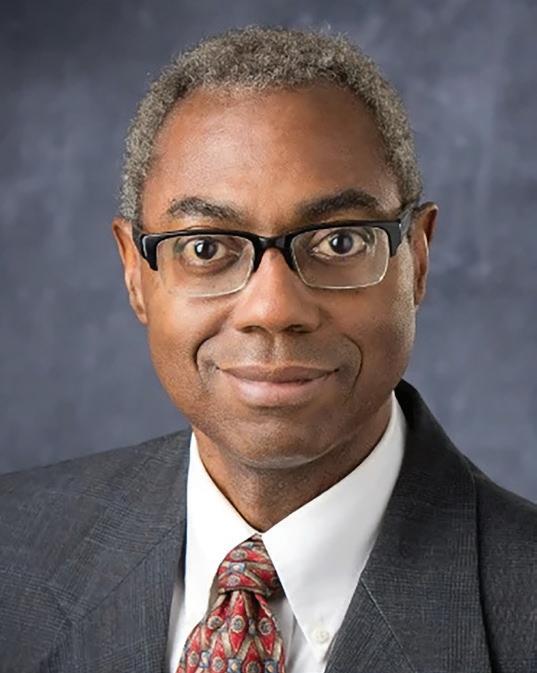
James McKim, who was involved in the original plannng of 603 Diversity and has written essays for past issues, serves as managing partner of Organizational Ignition. He is driven by an intense need to help organizations achieve their peak performance through the alignment of people, business processes and technology. He is recognized as a thought leader in organizational performance, the uses of neuroscience and program management.
After a stint in daily newspaper work, Trisha Nail became NH Business Review’s assistant editor in 2023. She was previously the business reporter of The Keene Sentinel based in the Monadnock Region, following four years of undergraduate journalism studies and community reporting in her native Alabama. She holds a bachelor of arts degree in journalism from Auburn University. Trisha resides in Concord, New Hampshire.
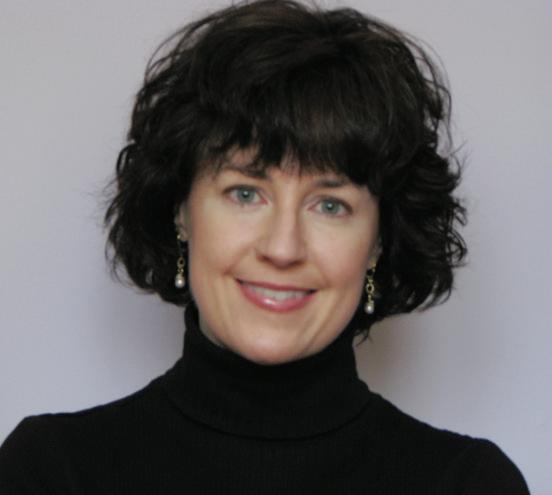
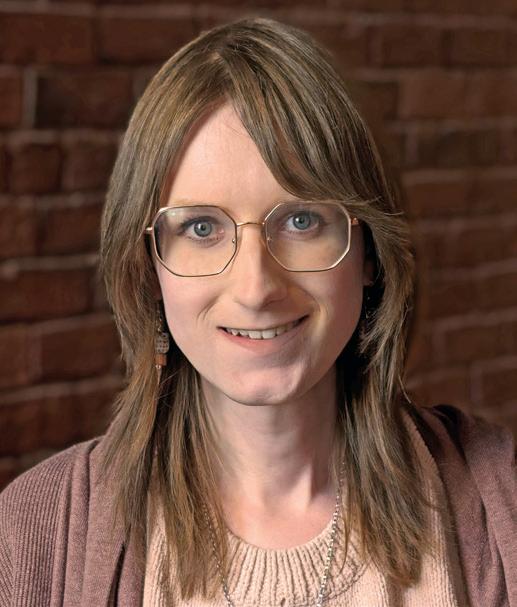
Karen A. Jamrog is a longtime contributor to NH Magazine and other publications in the Yankee Publishing family. She specializes in writing about health and wellness, but equally enjoys covering many other topics, from international wine-making to noteworthy New Englanders.
Raised in a diverse community in Boston, Massachusetts, Suzanne Laurent worked as a registered nurse for the Boston Head Start Program. She moved to Toronto, Ontario, in 1982, and unable to work as a nurse, Laurent pursued a career in photojournalism. She has been a resident of New Hampshire since 1987. She has an extensive award-winning background in journalism. She is also a juried photography member of the New Hampshire Art Association and a published poet.
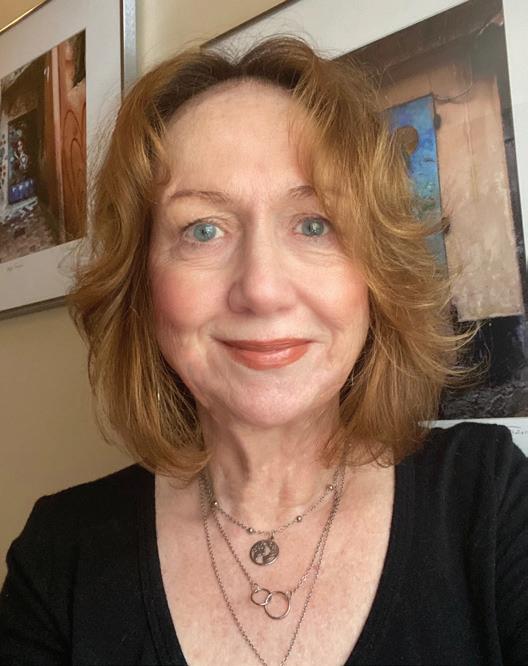
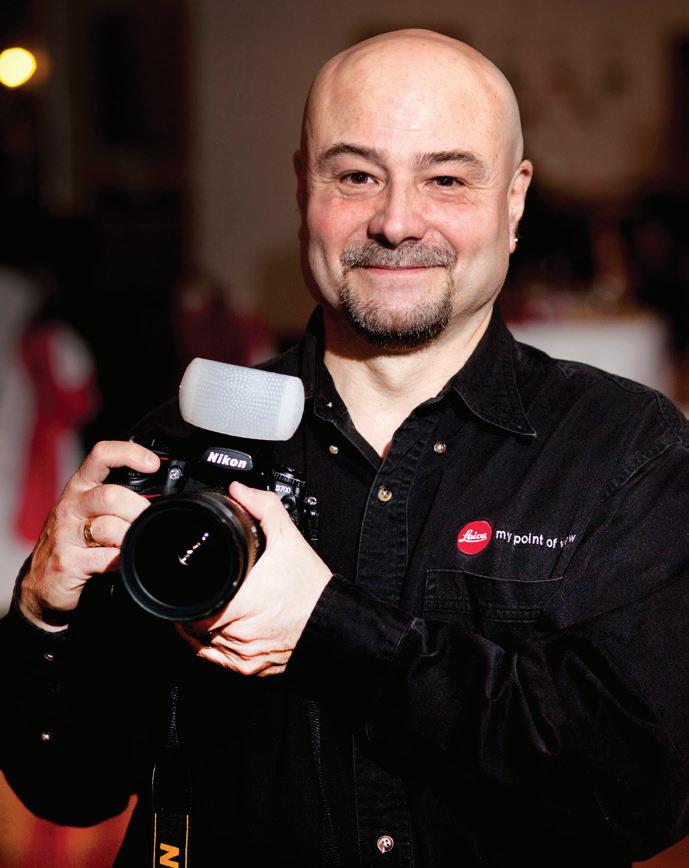
Primary photographer for 603 Diversity is Robert Ortiz of Robert Ortiz Photography. Ortiz began his photographic career at 15, and has chronicled everything from local weddings and events to the lives of the native peoples of the Peruvian Amazon. He lives in Rochester with his wife and son and 15-year-old daughter, Isabella, who is currently in training as his photo assistant.

Advocate, coordinator and educator Yasamin Safarzadeh, a native Angelino and current resident of Manchester, compiled our calendar and wrote the feature on the UNH researchers. Safarzadeh hopes to secure a future for a more diverse young adult population in New Hampshire to ensure a more prosperous and effective future for all. DM her at phat_riot on Instagram.
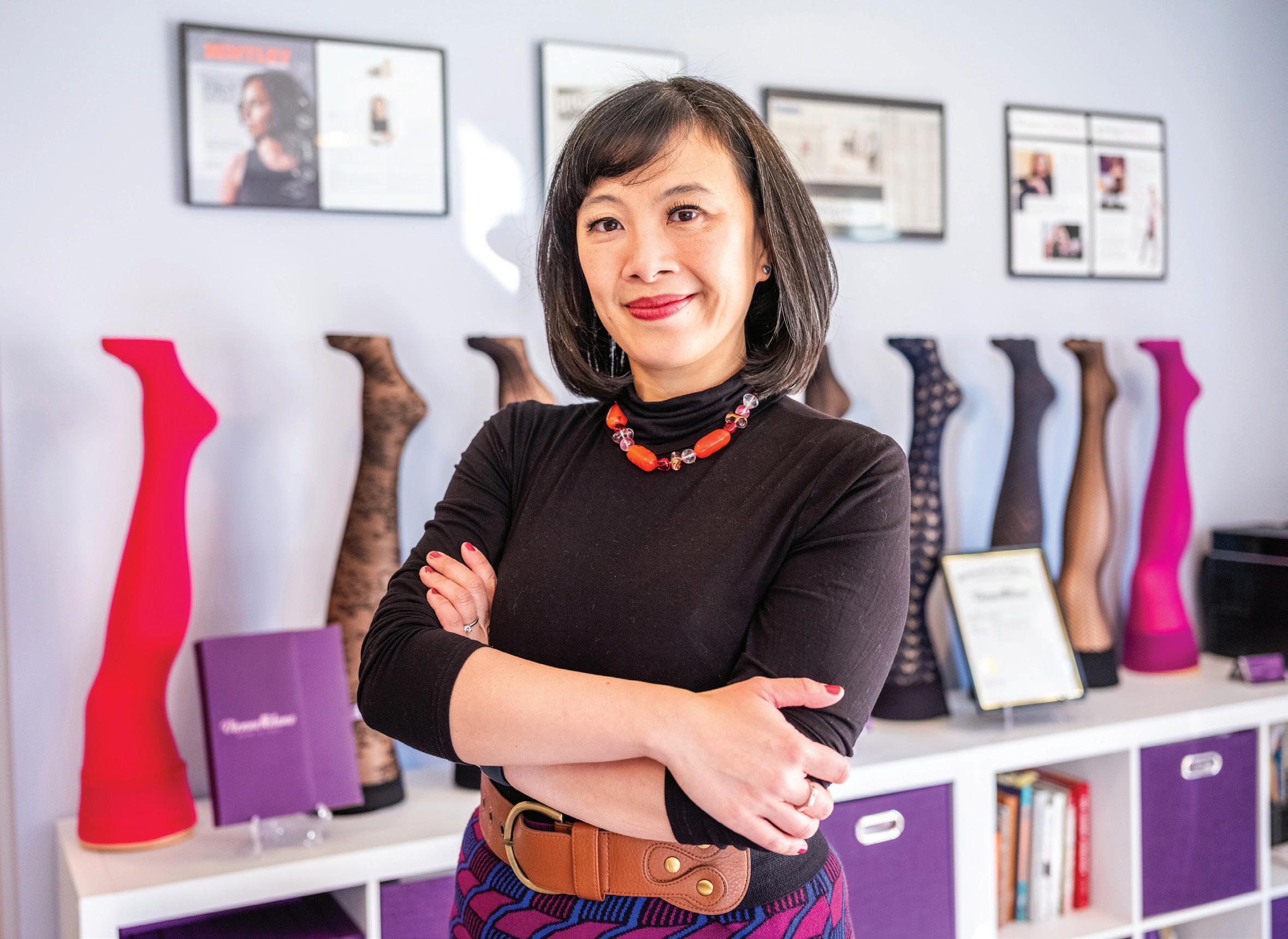
BY SUZANNE LAURENT / PHOTO BY ROBERT ORTIZ
Vienne Cheung Brown’s combined love of fashion, travel and fine hosiery led her to create her own online brand, VienneMilano, sharing her passion with her customers.
“I love wearing thigh-high stockings,” Cheung Brown said. “I’m short, so pantyhose was usually up past my waist. Thigh highs are so much more comfortable.”
Born in Hong Kong, Cheung Brown grew up in Boston, Massachusetts, and now resides in Windham with her husband and two young children. Her online business, started in 2011, is based in Salem.
Frustrated by the inability to find a wide variety of luxury hosiery in the United States, Cheung Brown decided to step up to the challenge — leave her comfortable, but unfulfilling, corporate job, and put all her efforts into developing VienneMilano.
“Stockings are a true fashion complement, as they can define the outfit. Legs are a canvas for color and texture — thigh-highs allow you to use it,” Cheung Brown said.
“Yet, VienneMilano is not just about making a fashion statement — by wearing thigh-highs, a woman gains a little glamorous secret that provides her personality with an extra boost.”
What are thigh-highs? Thigh-highs are hosiery pieces held in place by a comfortable silicone band. The band holds the hosiery in place on the upper leg without the need of garter belts.
Lower-quality thigh-highs use elastic straps to attempt to stay in place. High-quality products instead use silicone bands. Silicone works best, because it gently but firmly adheres to the skin, does not pinch or squeeze uncomfortably, and does not create that
unflattering “muffin top” effect, Cheung Brown said.
“When I couldn’t find thigh-highs that stayed up on my legs, I turned to Europe, especially Italy, knowing it would have this comfortable product,” she said.
All of VienneMilano’s thigh-highs are from Italy, and Cheung Brown keeps them at affordable prices. Her online store also sells items from other brands that her customers are looking for, such as garter belts and lingerie.
“I wanted to make sure the prices for the thigh-highs were reasonable,” Cheung Brown said. “We offer discounts for first-time buyers, and we also offer military service discounts.”
“VienneMilano is a boutique brand,” Cheung Brown said. “We do not always mass produce all of our styles. This allows us to focus on high-quality craftmanship and offer exclusive, limited-edition designs that our customers love.”
“Now that we’ve grown, we want to serve individuals of all sizes from extra small to 3X large,” Cheung Brown said. “We have larger thigh-highs that offer support.”
“With the silicone band, the trick is to wear right size,” Cheung Brown said. “The subject requires a bit of education. This is why we offer education about hosiery, stockings and thigh-highs.”
Fashion shouldn’t mean inequality or suffering, Cheung Brown said.
“That’s why, at VienneMilano, it matters to us how our products are made and where they come from. Italy is known for its
craftmanship, and their fair labor laws are the icing on the top,” Cheung Brown said.
On a more thread-deep level, all of the products are sourced from Oeko-Tex certified suppliers, meaning the materials are free from hazardous chemicals and toxins.
For as long as she can remember, Cheung Brown’s driving force has been uplifting women from all walks of life, eventually choosing fashion as a means to achieve this goal.
Cheung Brown is currently the president of the Windham Moms Alliance, where her goal is to serve moms in the community.
She previously served on the advisory board of Uncommon Threads, a nonprofit focused on uplifting low-income women through style, clothing and, in their own words, an “outside-in, inside-out” approach to building lasting self-esteem.
She has also served on the board of ASPIRE (Asian Sisters Participating In Reaching Excellence), a nonprofit based in Boston. ASPIRE takes on the challenges that Asian American women face throughout everyday life to achieve equality.
“Our motto is ‘every woman deserves to look and feel fabulous,’ and we work hard to fulfill that motto every day in everything we do,” Cheung Brown said. “At the end of the day, stockings make a woman look and feel fabulous. It reinforces the idea that it doesn’t matter your skin color or size — you feel special when you wear them.” 603
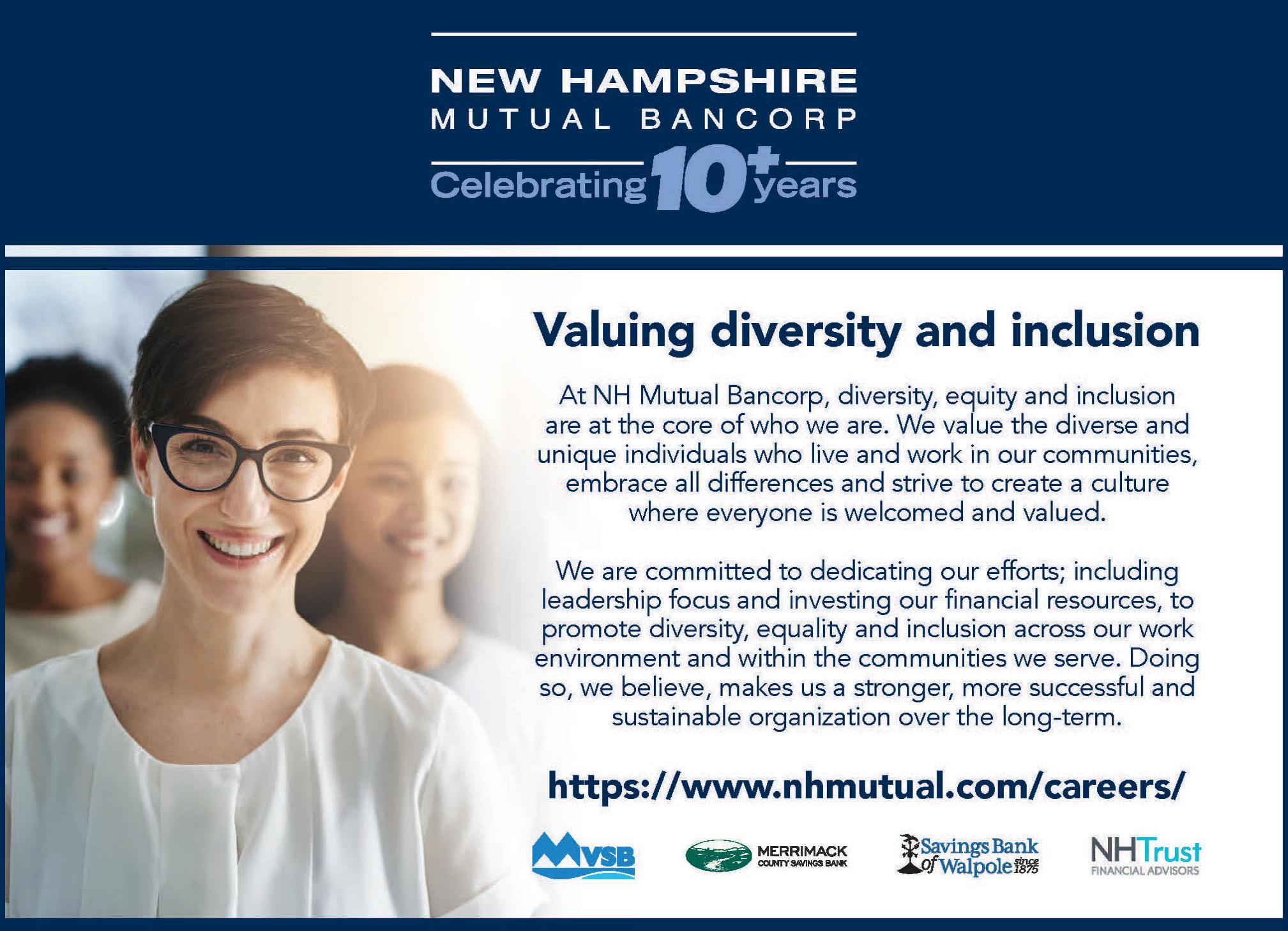
BY SARAH PEARSON
For more than four decades, business leaders worked through what is now Empower Success Corps (ESC) to consult with nonprofits looking to grow. ESC connects executives with organizations who are seeking assistance in strategic planning, fundraising, board building, branding and other services.
ESC was seeing increased requests for consultants who not only have the necessary management know-how but also a lived experience of the communities where the nonprofits are operating, says Andrew Spooner, ESC’s associate director of consulting and catalyst.
“Foundations and government needed to connect with communities in new ways,” Spooner says.
To help meet that demand, ESC created the Catalyst fellowship, now on its second cohort.
Catalyst is a program for mid-career professionals of color designed to develop consulting skills that will advance their careers.
Spooner says the fellowship helps lift the careers of people of color while helping ESC meet the demand for nonprofit consultants.
That was the case for Alisha Robinson of Lebanon, NH, who is a human resources and diversity and inclusion specialist in the health care sector.
“I have been approached by several organizations to share my expertise regarding different aspects of HR and DEIB, but never offered compensation,” Robinson says. “Recently I was approached by a nonprofit to consult on a job description and offered compensation. It got me thinking that I definitely deserved to be compensated for the knowledge I was sharing but had no idea how to do it. When the
opportunity arose for this fellowship, it was the perfect way to learn how to market myself as a consultant and increase my skill set.”
Fellows meet three times a month from January through June going through hybrid training with consulting advisors. After completion of the training, teams of fellows with an ESC lead consultant are assigned to actual nonprofit projects that fit with their professional expertise and interests.
“The training we bring to fellows is what we do best,” Spooner says.
The Catalyst program in also unique in that it targets mid-career professionals while many of the other consultants are either retired or in upper-level authority roles. ESC works to accommodate the Catalyst fellows’ work and personal life needs while working on the consulting projects, since they likely have less flexibility in their schedules than C-suite leaders.
First-year fellows have also returned to provide support and networking for this year’s cohort.
Lisa Carter was a Catalyst fellow in its first year and has returned this year as an advisor.
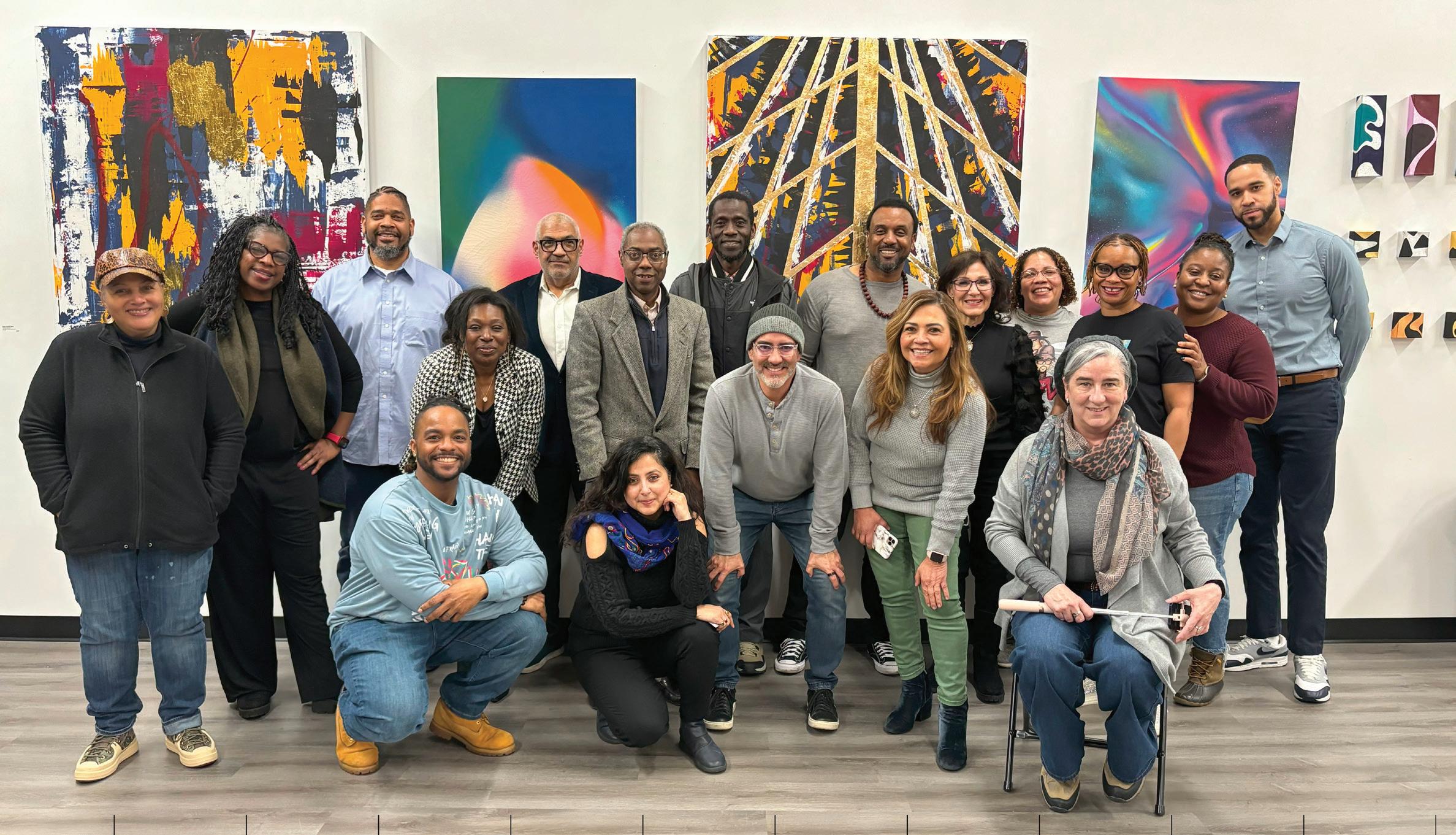
“I had started to consult for nonprofits before the fellowship, but it was becoming increasingly a profitable part of my consulting (firm),” Carter says.
Carter’s background is in marketing, and found the finance and compliance sections of the training very helpful.
“It provided me with the inside view of the operations of a nonprofit business,” she says.
After the training, she was assigned to a consulting project with a Jewish camp with multiple locations in the Boston area. She now leads the marketing training module.
“I think it is crucial for the fellows to understand how to market themselves and deliver their value proposition for their service,” Carter said.
Robinson says that the slate of training modules has been useful to those with and without previous consulting experience.
“I came into ESC knowing nothing about consulting, feeling like I had only ‘played one’ before,” Robinson says. “ESC gave me not only the confidence to know that I am a consultant but also the support and encouragement to grow within my already developed skill set and to gain and learn new skills that make me even more valuable to my community.”
The training is free for the fellows, paid for by sponsors including the NH Charitable Foundation, and there is a rigorous application process that goes through professionals’ backgrounds, hopes for skill acquisition and familiarity with consulting. Fellows come from across New England, and six out of 18 are from New Hampshire this season.
Among the barriers people of color may face are that their networks may not reach as high up, Spooner explains. Among the goals of the fellowship training is to give participants confidence to take their skills to higher management and board rooms.
While many of the fellows continue in their existing careers and do consulting occasionally, Spooner says at least two previous fellows have moved on to full-time consulting roles. 603

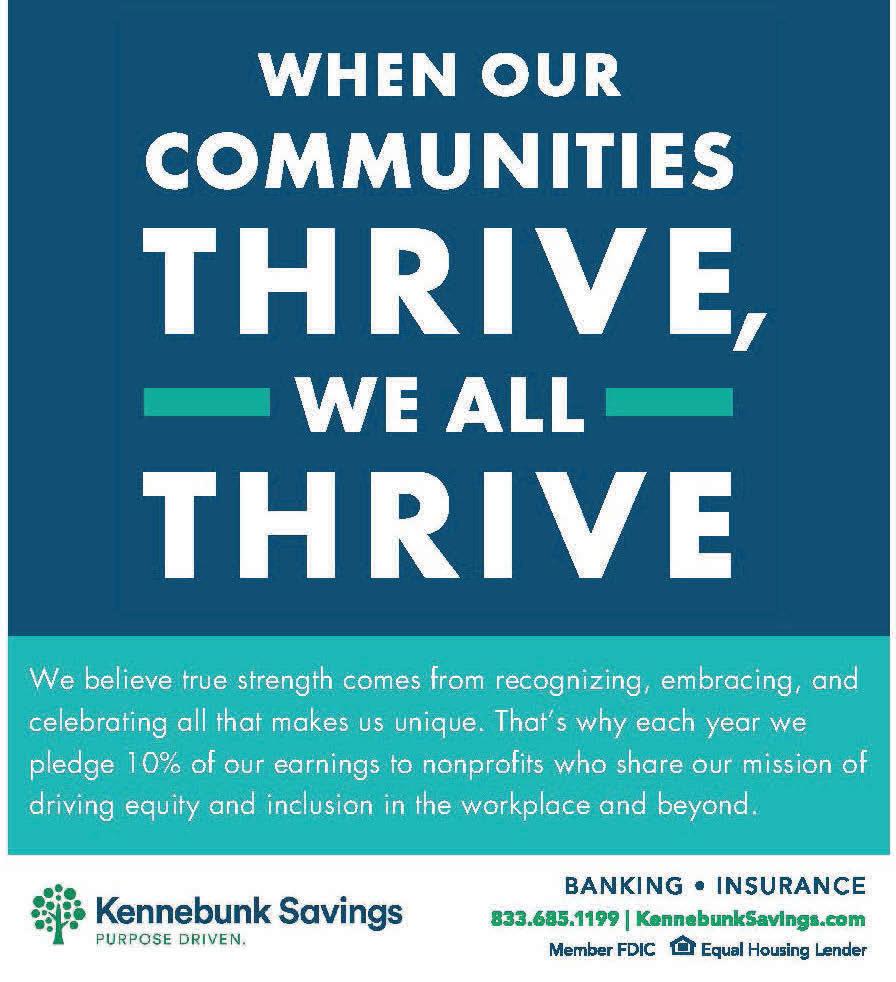
BY ERNESTO BURDEN
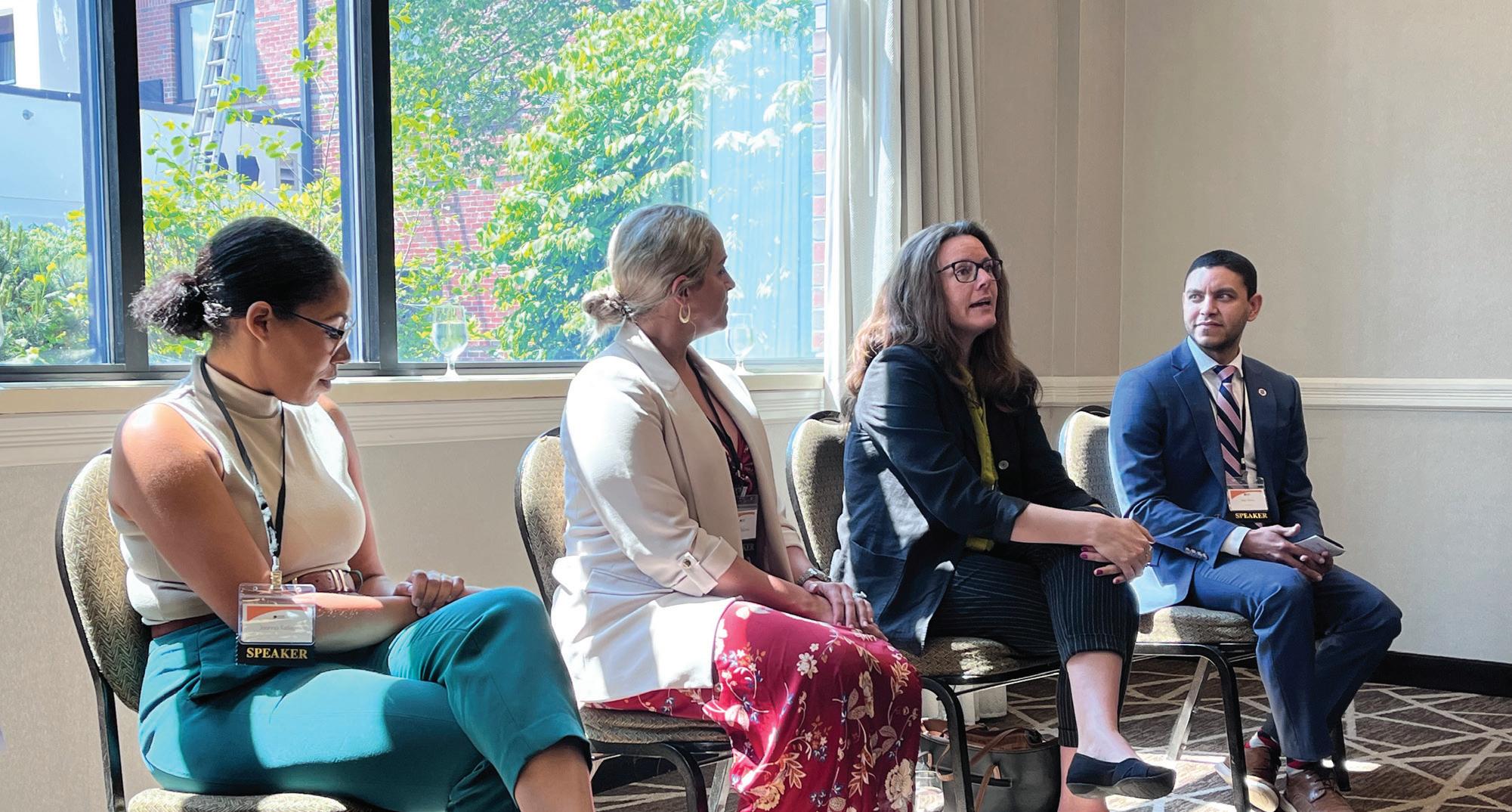
The “Business Growth Blueprint: Empowering Entrepreneurs” panel discussion at the inaugural Shades of Progress conference on May 22 featured panelists
Inaugural conference emphasizes state’s changing demographics, BIPOC entrepreneurship
We need to begin to change the narrative that we’re not a diverse state,” Anthony Poore told a gathering of business leaders at the inaugural Shades of Progress Conference on May 22. Poore, president and CEO at the New Hampshire Center for Justice & Equity, delivered a keynote address that underscored New Hampshire’s changing demographics, emphasizing its burgeoning statewide diversity and the unique challenges faced by diverse populations.
The event was hosted by the Business Alliance for People of Color (BAPOC), which was founded in 2021 to support and advocate for Black, Indigenous, and People of Color (BIPOC)-owned small businesses.
Taylor Caswell, commissioner of the NH Department of Business and Economic Affairs, opened the event, followed by a panel discussion featuring BIPOC business owners and an extended Q&A session with an audience of more than 160 attendees. The conference then broke into workshops covering topics including emerging technologies, entrepreneurship, working
with financial institutions and starting a business.
Many of the discussions, such as the session covering business growth for entrepreneurs, would have felt familiar at any small business conference. Panelist Joanna Kelley, who owns Cup of Joe Coffee Bar in Portsmouth, spoke frankly about the burnout, isolation and loneliness of entrepreneurship. But then went on to discuss how racism adds to those challenges. Cup of Joe was among one of more than a dozen Black-owned, LGBTQ+ allies or Jewish institutions tagged with swastikas in February 2023.
Another panelist, executive women’s coach Anena Hansen, described the discussion as business but from a personal perspective, including experiences of fear and trauma. “It’s everybody bringing our full selves to it,” she said.
In the audience, Ali Sekou, the first Black member of Concord’s city council, commented: “I have to say, I love the honesty.”
Latonya Wallace, one of the founders of BAPOC and its new chair, said in her
closing remarks, “We are celebrating diversity, innovation and the collective pursuit of progress. We are here together from different backgrounds, industries and perspectives. This convergence of minds and hearts is a testament to our collective commitment to shaping a better world.”
She emphasized again the point Poore made in his keynote, detailing: “With the latest census data telling us that the NH’s BIPOC community increased from 2% to nearly 10% ... this, my friends, is why this work and conversations like we had today and moments like this right now need to continue, because the demographics of our state are changing and the work won’t stop.”
Asked whether plans were already in the works for next year’s conference, Wallace replied, “As we are still celebrating the success of our first conference, we’d like to remain in that moment for a while longer. But we would encourage people to learn more about our work at The Business Alliance, learn more about our vision, join as members, and support us during our pop-ups. We are much more than a conference; we are an organization making an impact every day.”
Learn more about BAPOC’s mission and programs at bapoc.org. 603

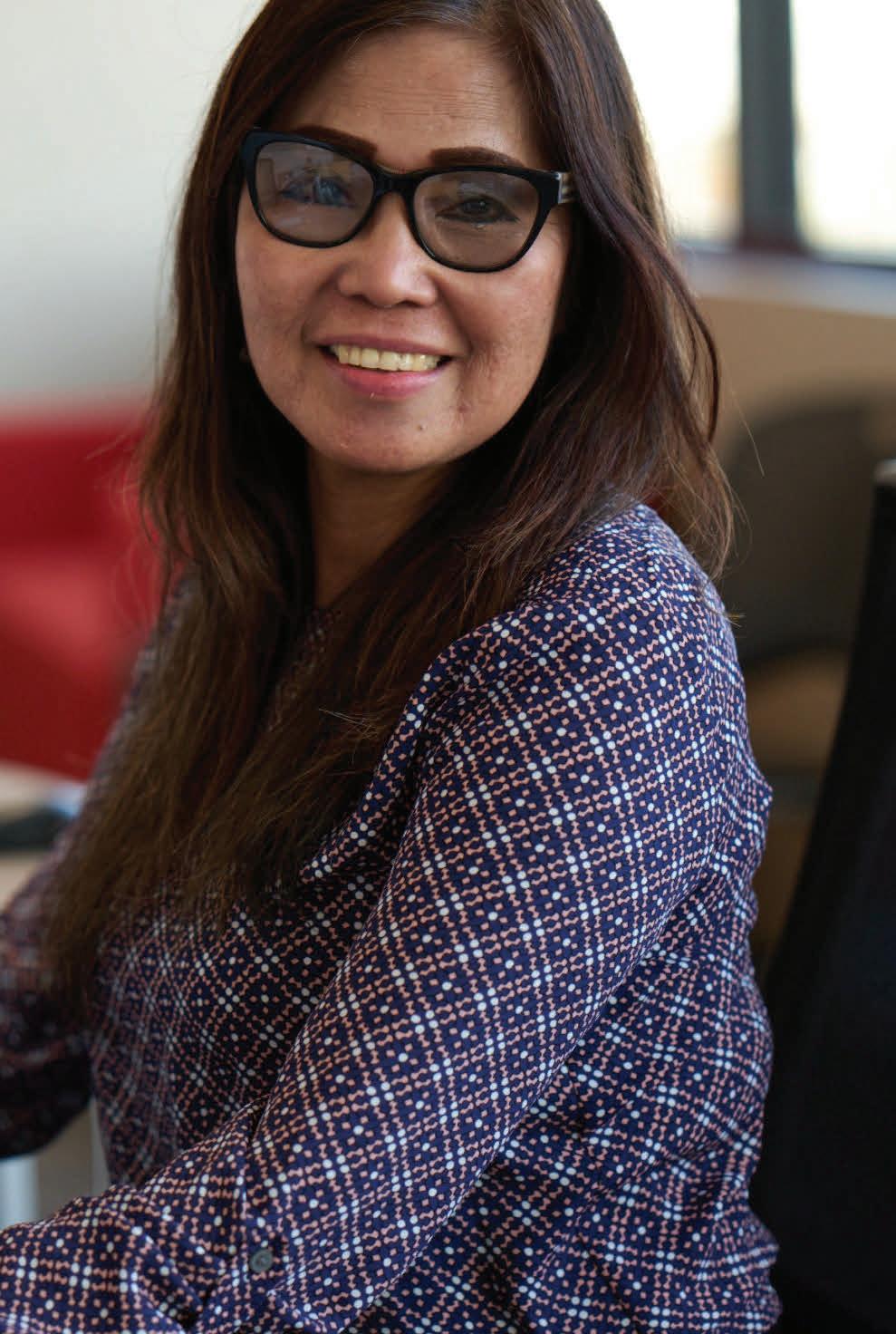
Start your next career journey at Prime Source Foods and experience a welcoming environment centered on success for all. As New England’s largest independent center-of-the-plate protein distributor, we provide an environment focused on employee development, career progression, and opportunities for all.
Prime Source Foods is committed to maintaining a work environment centered on diversity, equity, inclusion, and accessibility, resulting in a positive impact on the products we offer and the customers we serve. We welcome you to bring your authentic self and take your career to the next level!

It’s all in a day’s work for Stephanie
BY KAREN JAMROG/
You know how when you’re worried about doing something, someone might say to you, “Oh, come on — it’s not brain surgery”? Well, on a typical day for Stephanie Ihezie, it might indeed be brain surgery.
Ihezie is about midway through the seven years that she needs to complete as a neurosurgery medical resident at Dartmouth Hitchcock Medical Center before she can continue with her medical career.
Anyone who hopes to work as a doctor faces a long haul of training, but neurosurgery — which involves the brain, spine and other parts of the nervous system — “is one of the most challenging specialties,” Ihezie says.
Not only is neurosurgery technically difficult, she says, but it “demands every part of you,” with long, arduous hours and psychological stressors such as needing to think fast under pressure. And, of course, there’s little room for error.
Ihezie was born in New York to a mother who worked as a nurse and a father who owned an auto parts business. When Ihezie was 6 months old, her parents moved the family to Nigeria, returning to the United States after a couple of years to settle in Texas.
Growing up, she didn’t have a burning desire to be a doctor — although she does recall dressing as a surgeon on career day in elementary school, complete with skull cap, gloves, surgical gown and shoe covers borrowed from her mom.
The spark for Ihezie’s career really came in high school, when she took advanced placement college courses in psychology and biology. Learning about thought processes, how the brain works, what happens in the body on a cellular level and the origins of movement fascinated her. She wondered, “‘How can I combine these things?’”
She attended MIT as a brain and cognitive sciences major, and found that, despite MIT’s large international community, “it was mostly white,” she says. As a Black woman, she experienced “a couple of instances of feeling excluded,” but MIT provided excellent mentors, and her determination was not shaken.
“I came in with a focus and a mission,” she says, driven by her faith, her upbringing and her overarching desire to help people. Her compassion is evident in a number of choices she has made — like when she was balancing a full course load at MIT but agreed to help a family member who wanted to get a bachelor’s degree even though they lacked basic computer skills.
“This person would handwrite all of their (school)work and send it to me, and I typed it,” Ihezie says.
But in Ihezie’s mind, the ultimate and “most direct way to help
people is through medicine,” she says.
She witnessed medicine’s power while still at MIT, when she shadowed a Mass General neurosurgeon who had performed surgery on a boy who was around 6 or 7 years old. Prior to the surgery, a brain tumor had left the boy unable to walk and move normally.
“I saw how after the neurosurgeon treated him,” Ihezie recalls. “The (boy) was walking down the hall to leave the hospital, and people were in the hallway clapping and cheering for him.” The boy “was elated, with the biggest smile on his face.”
After MIT, Ihezie returned to Texas for medical school, where she never wavered from her desire to be a neurosurgeon, although she did check out orthopedics after a mentor suggested that Ihezie consider it. But the day-to-day experience of orthopedics didn’t really grab her. Neurosurgery, in contrast, “felt like a calling,” she says. “The brains and the heart control everything,” she says with a shrug.
As a neurosurgeon, Ihezie performs brain surgery nearly every day of the week. What does it feel like to perform surgery on someone’s brain?
“Amazing, humbling, exciting, terrifying — all of the emotions!” she says. “The brain is a very beautiful organ and powerhouse system that is also quite delicate. I genuinely consider it a privilege to operate on each brain I am entrusted with.”
Ihezie says that “surprisingly,” she doesn’t often encounter overt racism or sexism from patients, but she finds that she “overthinks” her words and interactions with patients and hospital staff, with an awareness of the “preconceived notions people might have about someone who looks like me, based on what they’ve seen and read in the media.”
She tries to foster a team mindset at work and appreciates even the staff members whose jobs “might not be the most glamorous,” she says.
“All jobs matter. I can’t help the patients if someone doesn’t clean the instruments or enter the codes for the insurance company. I can’t do what I do without them, and I take care of them and others when they need to be cared for. We all depend on what other people do.”
She is also keenly aware that some patients, through no fault of their own, face odds that are stacked against their health because they can’t afford medical care, for example, or can’t get to medical treatments because they don’t have a car or are disabled.
Such barriers to health frustrate Ihezie, because they prevent her from helping people as much as she otherwise could.
When she needs encouragement, she draws on the support she’s received from the many role models and mentors she has had.
Despite all the challenges of being a neurosurgeon, Ihezie remains passionate about it.
“I am invigorated by it even though it is exhausting,” she says. “It’s rewarding even though there are days that you don’t like it. It’s deeper than enjoyment. It’s the people I’m serving.” 603
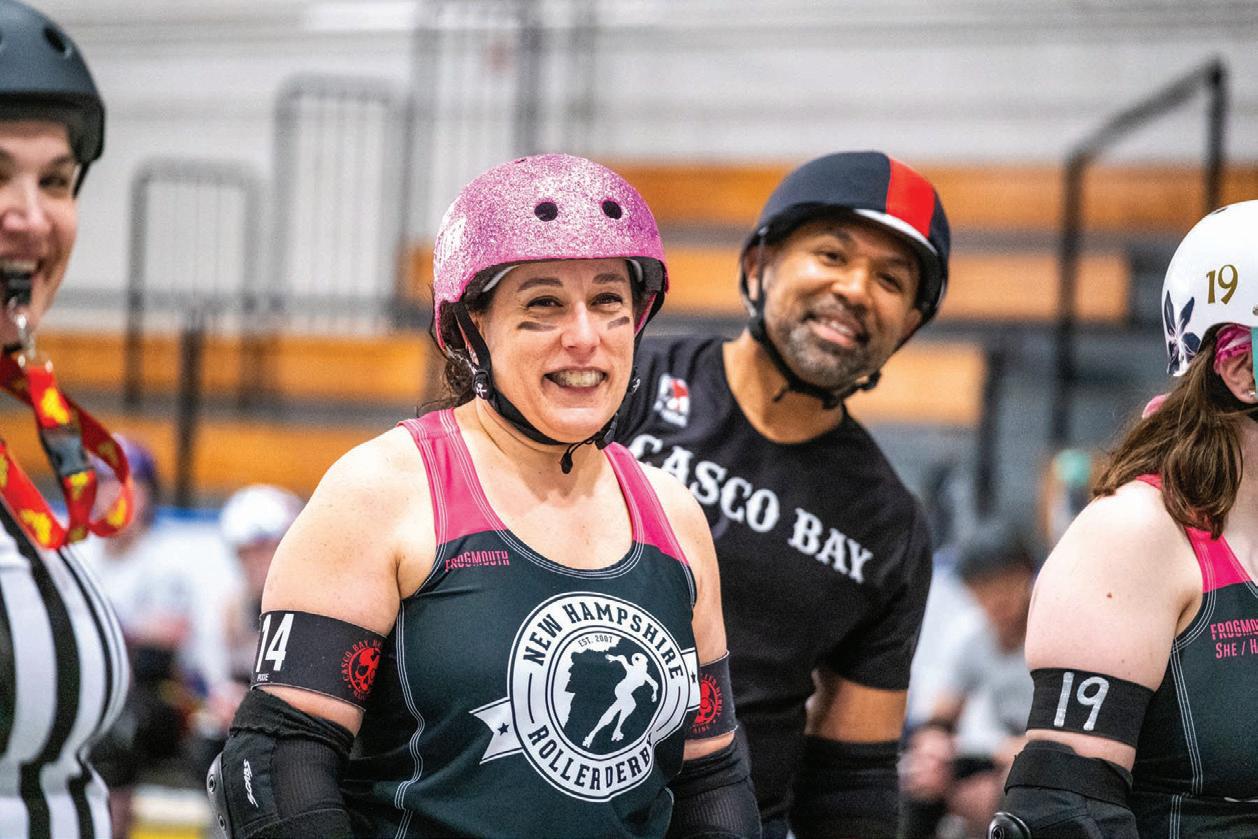
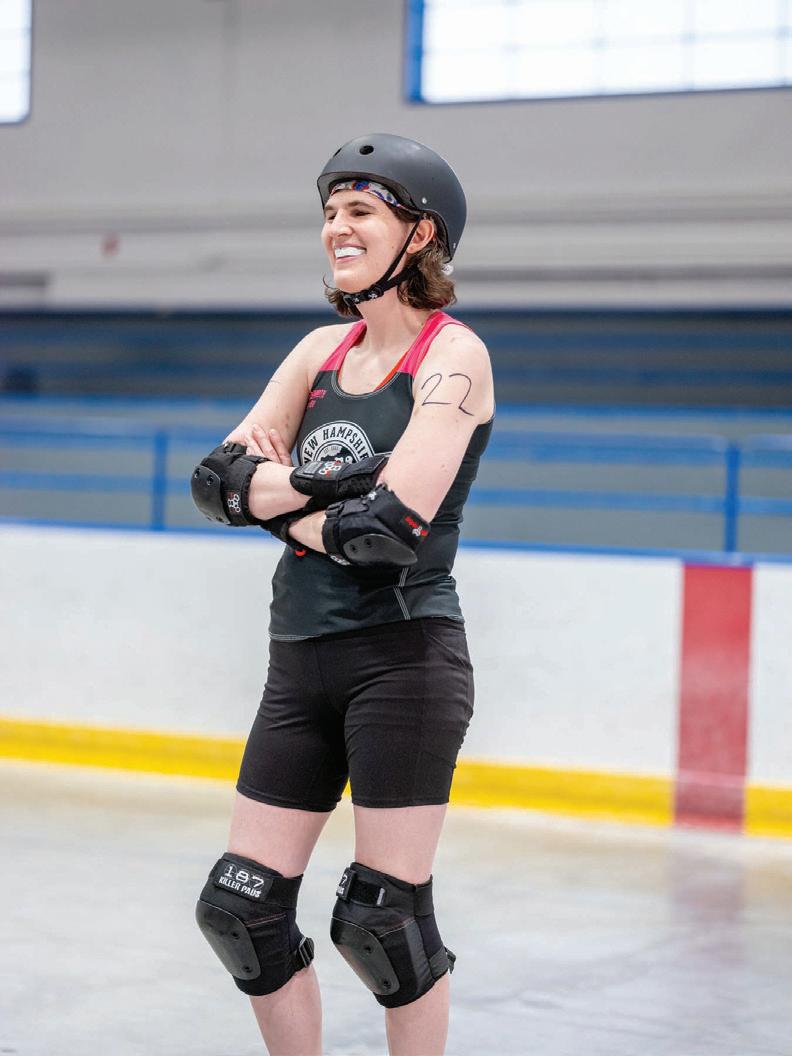
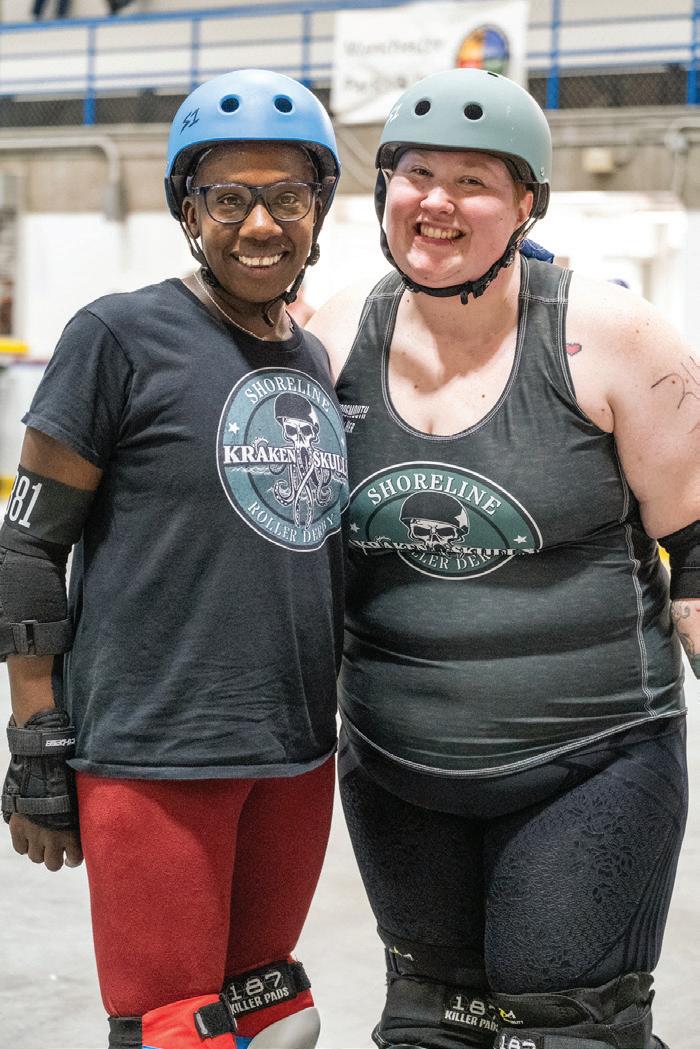
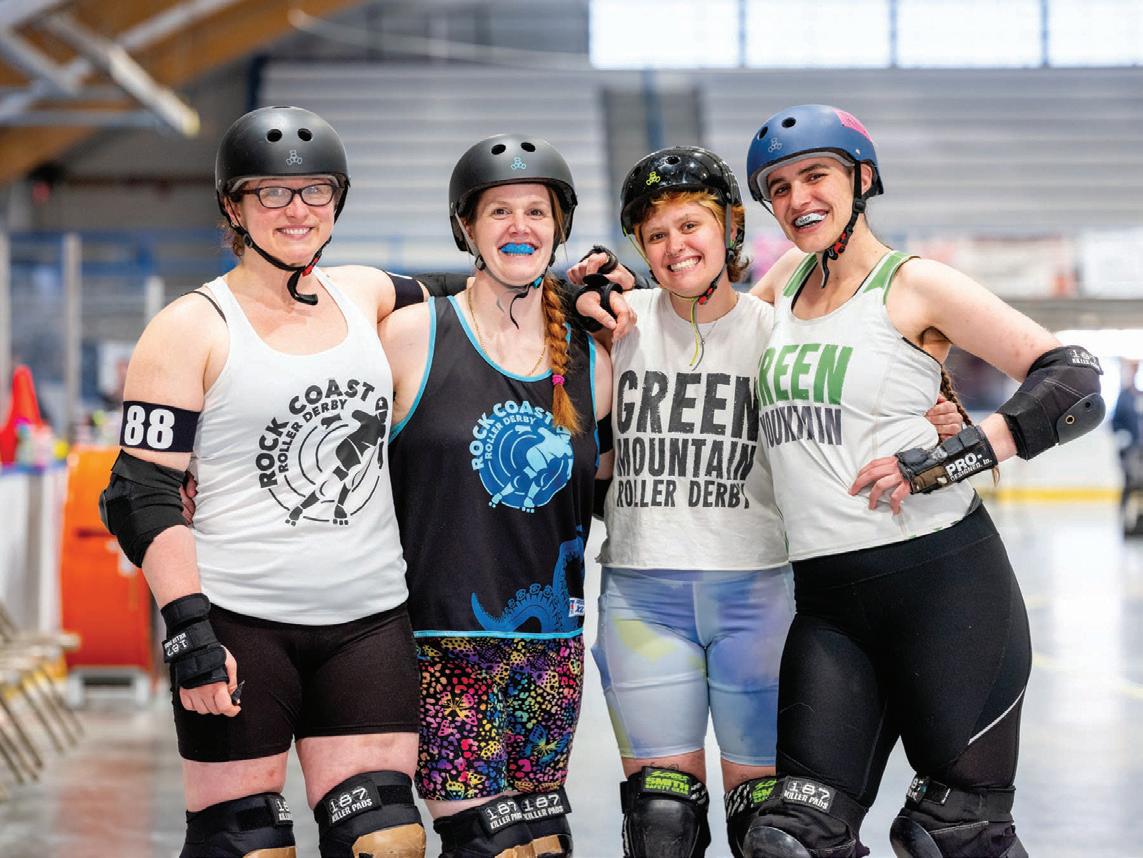
Opposite page, clockwise from left: New Hampshire Roller Derby skater Jena “Pixie Bruiser” McClary, center, is joined on the rink by husband Mark McClary, who is the head coach of New Hampshire Roller Derby and a Casco Bay player; New Hampshire Roller Derby skater Avery “Pell-Mel” Roy; Keisha “Gnarwen” Evans and Ashlee “TuckHerUp” Tucker from Rock Coast Roller Derby and two members of Green Mountain Roller Derby; Belinda “Sargent Bruiser” Jenkins and Magin “Pumpkin Slice” Belliveau, from the Shoreline Roller Derby team. Below: Renee “Hexadecimate” St. Louis, a jammer for Bay State Brawlers.
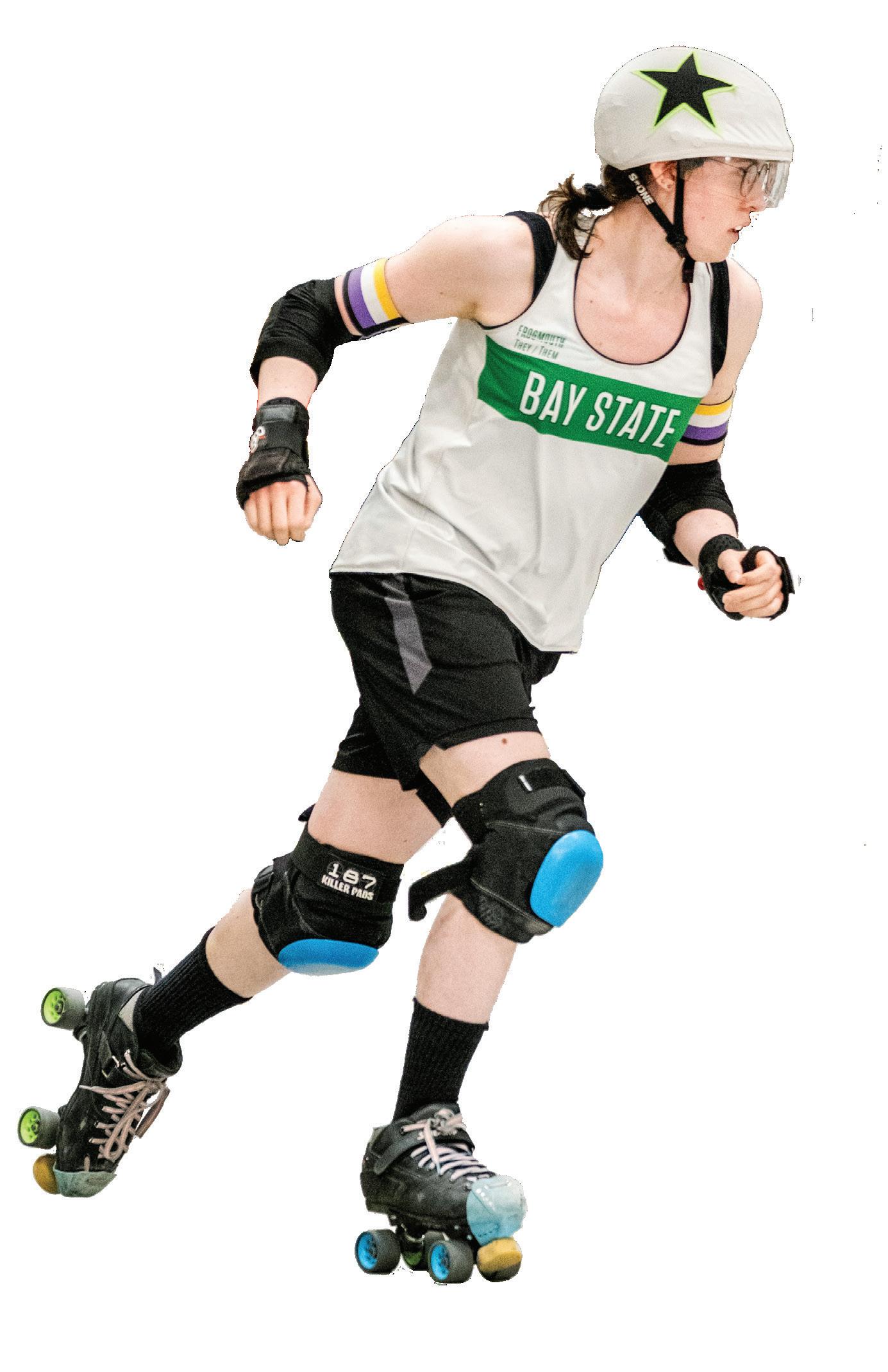
On a Wednesday night in Manchester’s JFK Memorial Coliseum, nearly two dozen roller skaters huddle in the middle of the rink. One skater gives an encouraging pep talk to her team, all clad in tank tops, jerseys and protective sports gear.
Though the skaters are sweating and bruised after two hours of practice, she coaxes a cheer from them: “Skate free or die!” the group yells in unison, their words reverberating around the rink.
The team’s members comprise a range of ages, occupations and gender identities. But it’s flat-track roller derby — a contact sport on roller skates — bringing them all together as the New Hampshire Roller Derby.
The league, a Manchester-based nonprofit, is one of several such teams in the Granite State creating a thriving community where both cisgender and transgender people voluntarily and amicably play a sport together. Others are the Granite State Roller Derby in Concord; Monadnock Roller Derby; and Twin State Derby, representing New Hampshire and Vermont communities in the Upper Valley area.
“I was the kid holding onto the wall in the skating rink, and then I started as an adult with two kids and was like, ‘OK, I can do this,’” said Bekah Kistler, 43, of the Greater Manchester area, who is known to her teammates as “Penalty Bex” — her player name, inspired by an element of the sport.
Kistler, who is cisgender, began playing roller derby in 2010 after a friend invited her into the scene. She says she originally got invested because of the sport’s active energy for adults, and later found social belonging in her team. Kistler says she became acquainted with trans and queer people through her involvement in derby and has become a strong ally thanks to this.
“It was immediately very obvious that it was going to be an open and accepting place.”

“When we get here, we all work as a team,” Kistler said. “There’s a space for everybody in every shape and size, and we find a way to capture the benefits of each skater. It’s just like a family.”
In that sense, trans players say derby gives them an outlet to be both athletic and freely express their gender, without facing an atmosphere of scorn for their identities that has emerged in some sporting communities due to perceptions of gender-diverse people.
Saoirse Cogan initially hesitated to join roller derby due to this. Cogan, 36, now plays for Granite State Roller Derby as “SershaSaurus,” which she said helps announcers and spectators understand how to pronounce her first name.
“It was immediately very obvious that it was going to be an open and accepting place,” said Cogan, who is transgender. “I think one of the biggest encouragements was to find that I wasn’t the first trans skater in our league. It was a real reassurance to show up to one of my first practices and see another trans girl there who was a very skilled skater and to see her really be able to excel with the group.”
In flat-track roller derby, two teams compete for more points than the other on an oval-shaped track. Basic derby games, or bouts, are divided into two 30-minute
periods, according to the Women’s Flat Track Derby Association (WFTDA), an international governing body of the women’s form of the sport.
Those 30-minute periods are subdivided into two-minute segments called “jams,” where the two opposing teams send out five skaters — collectively known as a “pack.” Four pack members are “blockers” and the remaining player is a “jammer.” The jammer on each team starts a jam behind the blockers and scores a point for every opposing blocker they make a skating lap around during each lap.
Jammers start behind the pack, and they must navigate through it and skate around the track to score points on opposing blockers. Then, there’s a 30-second break in between each jam. Flat-track derby is a full-contact sport, and generally, skaters can only use their hips, shoulders and upper arms to contact opponents. Those who make unsafe or illegal plays may receive a penalty, resulting in a 30-second removal.
Research on transgender participation in sports is ongoing in the U.S. and abroad, with one recent cross-sectional study by scholars in the United Kingdom, Spain and Italy indicating trans athletes may be at a physical disadvantage compared to cisgender athletes. The study, funded by the International Olympic Committee (IOC)
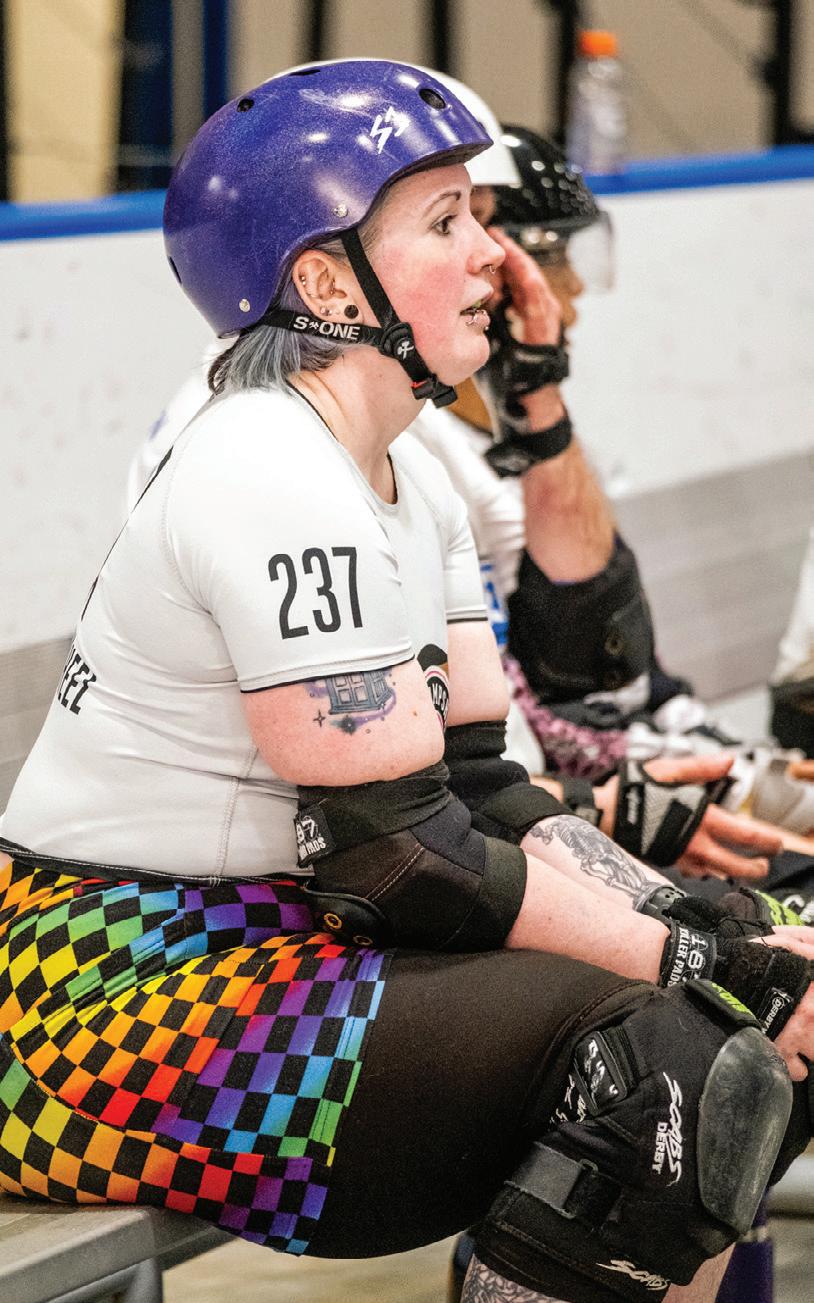
and published in April in the British Journal of Sports Medicine, examined the athletic competence of 35 trans athletes who had undergone gender-affirming hormone therapy and 40 cis athletes. Participants in both groups were actively in competitive sports or physical training three times weekly.
The study found that trans women performed worse than cis women in tests of lower-body strength and lung function and that trans women had a bone density — which is linked to muscle strength — equivalent to that of cis women. The study noted, however, that trans women had greater right handgrip strength than cis women.
Trans participation in sports has hit roadblocks in New Hampshire as the state recently passed a bill preventing middle and high school transgender girls from being included in school-sanctioned girls’ athletics. New Hampshire is the first state in the Northeast to impose such a restriction.
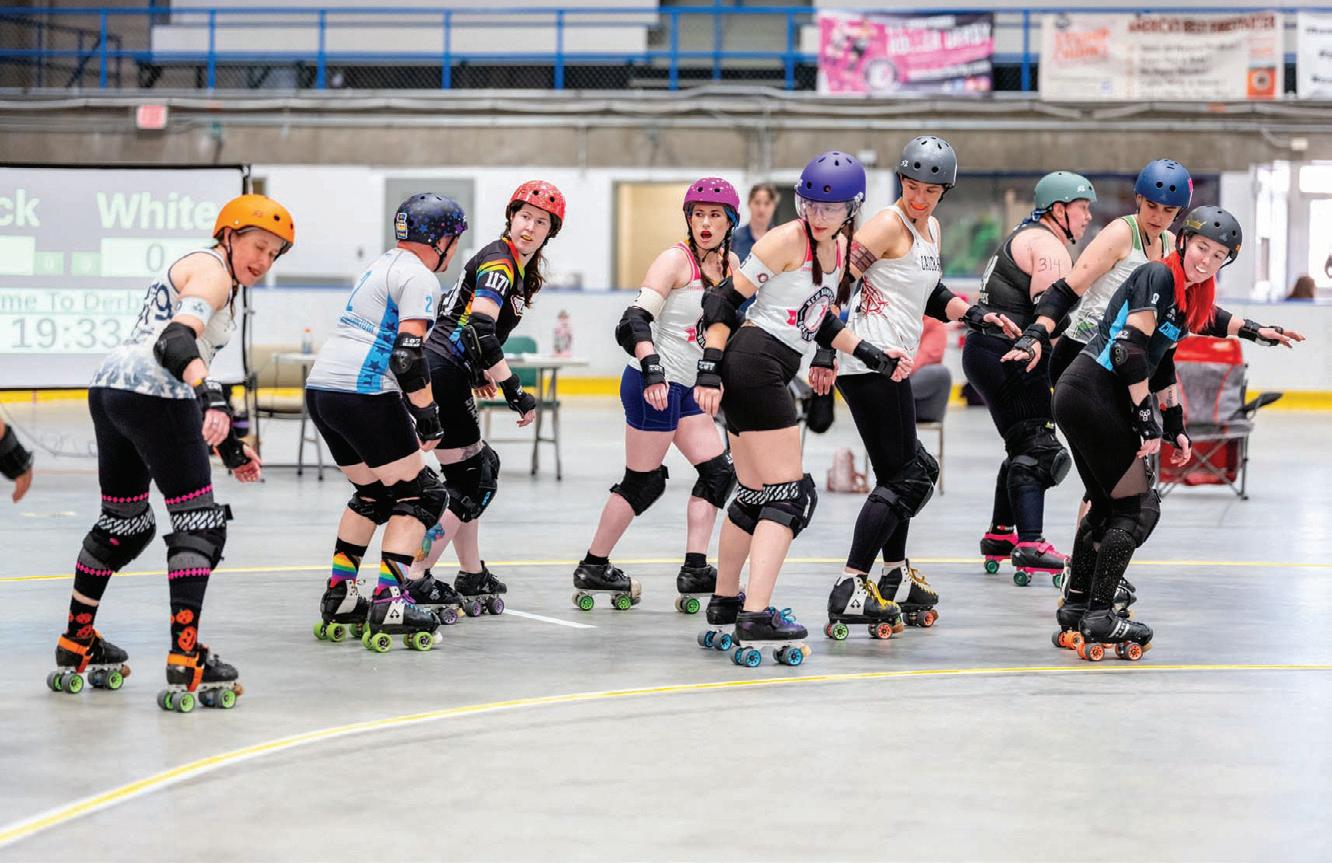
Most New Hampshire leagues are members of WFTDA, as the groups are catered toward women or feminine-expressive players. Co-ed and men’s derby also exist, with many men’s teams internationally governed by the Men’s Roller Derby Association (MRDA). However, no men’s leagues presently exist in New Hampshire, with the nearest MRDA groups in Portland, Maine, and Northampton, Massachusetts.
Neither WFTDA or MRDA requires transgender players to undergo any length or type of hormone therapy.
“Derby has not only the ethos of the sport being more inclusive, but the technical aspects of the sport are very inclusive as well,” Cogan said. “Every different body type has a different form of skating that favors them, and they’re all valuable on the track. Whether you’re 6’3”, or 4’4” or somewhere in the middle like me at 5’4”, we all have a role that we can excel in.”
While there may be gendered associations that set standards for different types of roller derby, the sport as a whole doesn’t limit who can be in which leagues based on their identity, attracting gender-nonconforming players.
It’s an aspect that Katherine Skipper, 36, of Keene, takes solace in as a genderfluid person.
Skipper, whose pronouns are she/ they, plays on Monadnock Roller Derby, under the alias of “Criminal Wrecker” and wheeled into the derby scene in 2011 in the Northampton league — Pioneer Valley Roller Derby — which remains active.
“I identified as a cis woman until pretty recently, so that was not a thing for me back then,” she said. “Knowing that I have
this beautiful supportive community of people who are fine with however I express myself is invaluable.”
They said their favorite quality of roller derby is that the sport welcomes those with or without a history of athleticism.
“It draws in people who were not the jocks in high school but the misfits,” she said. “It really is an island of misfit toys — the people who thought they would never be athletic and they would never be in team sports. We get a lot of people who don’t have an athletic background, don’t really know how to skate or have not gotten to experience the camaraderie and joy of team sports.”
Avery Roy, a 31-year-old trans woman in Manchester, might just be one of those misfits. A relative newcomer to derby, she’s been with NH Roller Derby for about a year and had only ever roller skated for about six months before then.
“I never fit in with team sports; it just didn’t feel good or comfortable, so I think it’s very surprising to be finding this community now at this point in my life,” said Roy, known as “Pell-Mell” to her teammates. “I was involved in some sports as a child, but that wasn’t something I wished to do. I remember several years of Little League (baseball) in which I was generally bored and not involved with things that were happening in the outfield.”
Conversely, 37-year-old Janelle Ellison, of Lowell, Massachusetts, was less out of place in high school sports, saying she was “pretty gifted with athletics.”
“I credit athletics as probably the only reason I was able to survive through high school,” said Ellison, who plays with NH
Roller Derby occasionally and is currently vice president of its governing board. “I was that freshman on the varsity team, so I was able to be a little bit more protected because I had upperclassmen insulate me from the regular high school mentality.”
Twin State Derby skater Grace Alden, 54, said that for trans people like herself the community around roller derby can be pivotal to boosting one’s self-worth.
“With the amount of rejection we encounter in many other parts of our lives, having a group of people who welcome you for who you are as a person — not for what you are — can bring in shared company and kindness and mutual support, and it’s tremendous,” Alden said.
More simply, she says, “It can be lifesaving.” 603


Cities across New Hampshire marked Lesbian, Gay, Bisexual, Transgender and Queer Pride Month in June to honor the 1969 Stonewall Uprising. Parades and activities were held in Concord, Nashua, Portsmouth and elsewhere to show support for the LGBTQ+ community and push for equality. In Manchester, thousands came out to watch the Pride Parade down Elm Street on June 15. The procession concluded at Veterans Park where there was live music and performances as well as vendors.





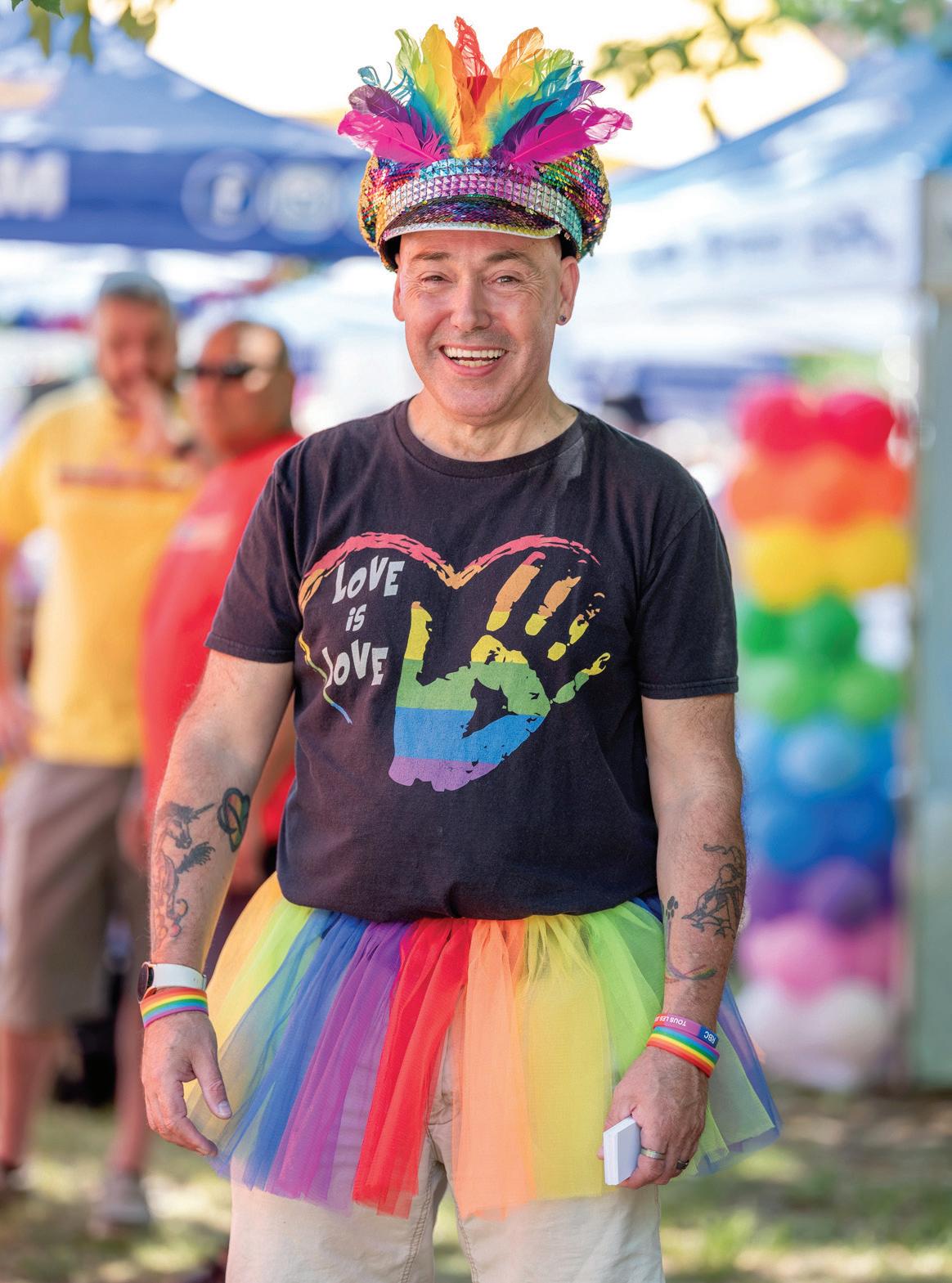

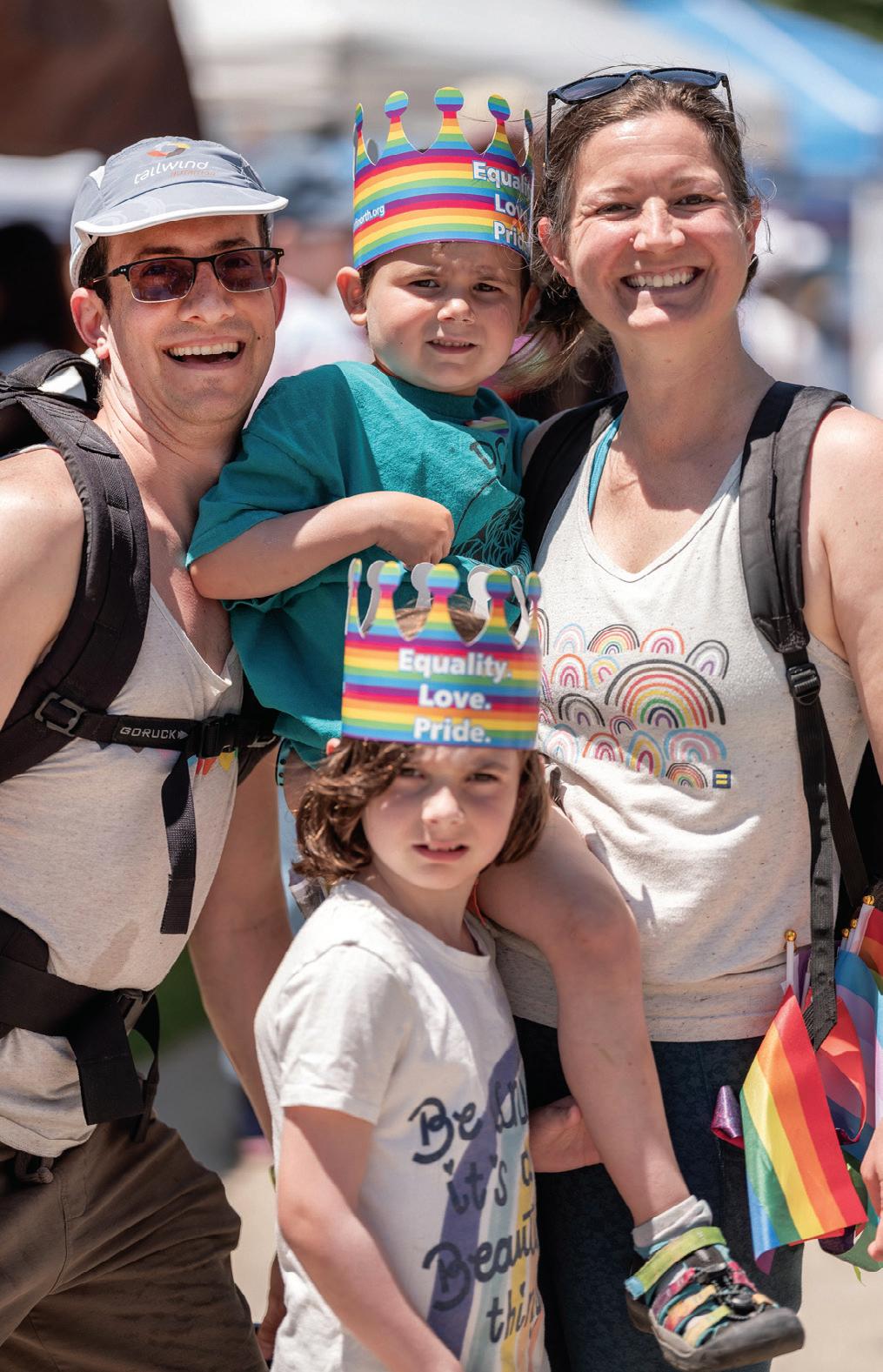
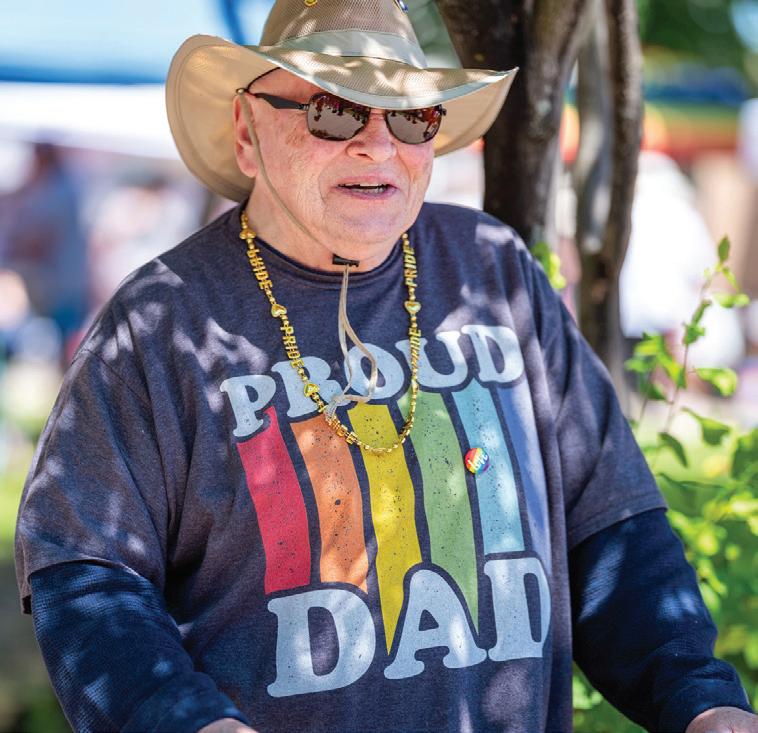
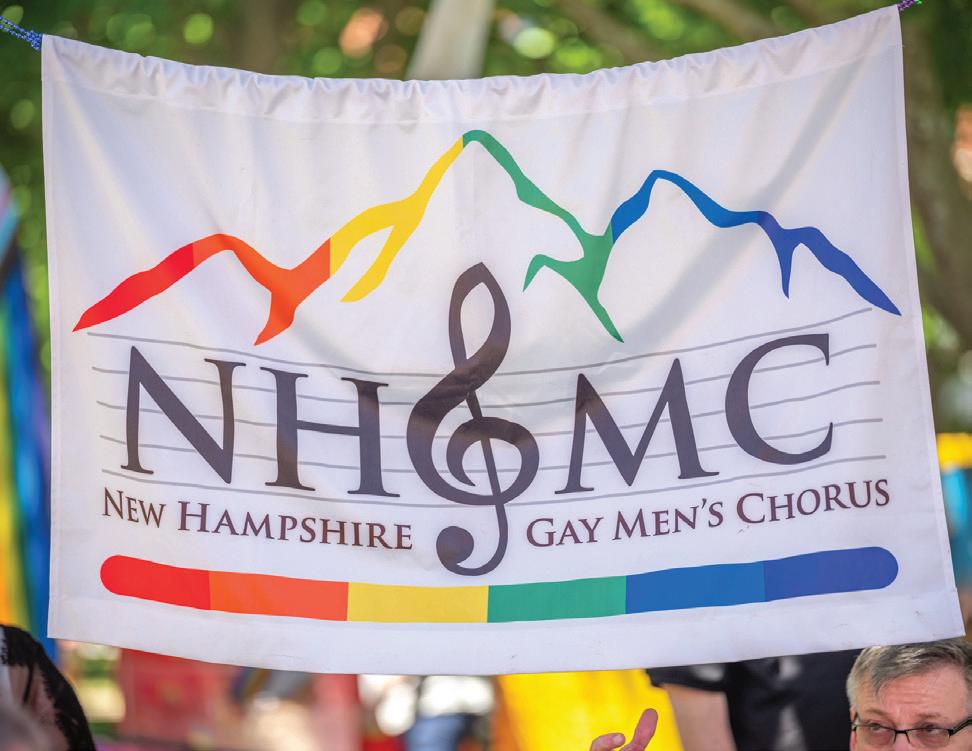



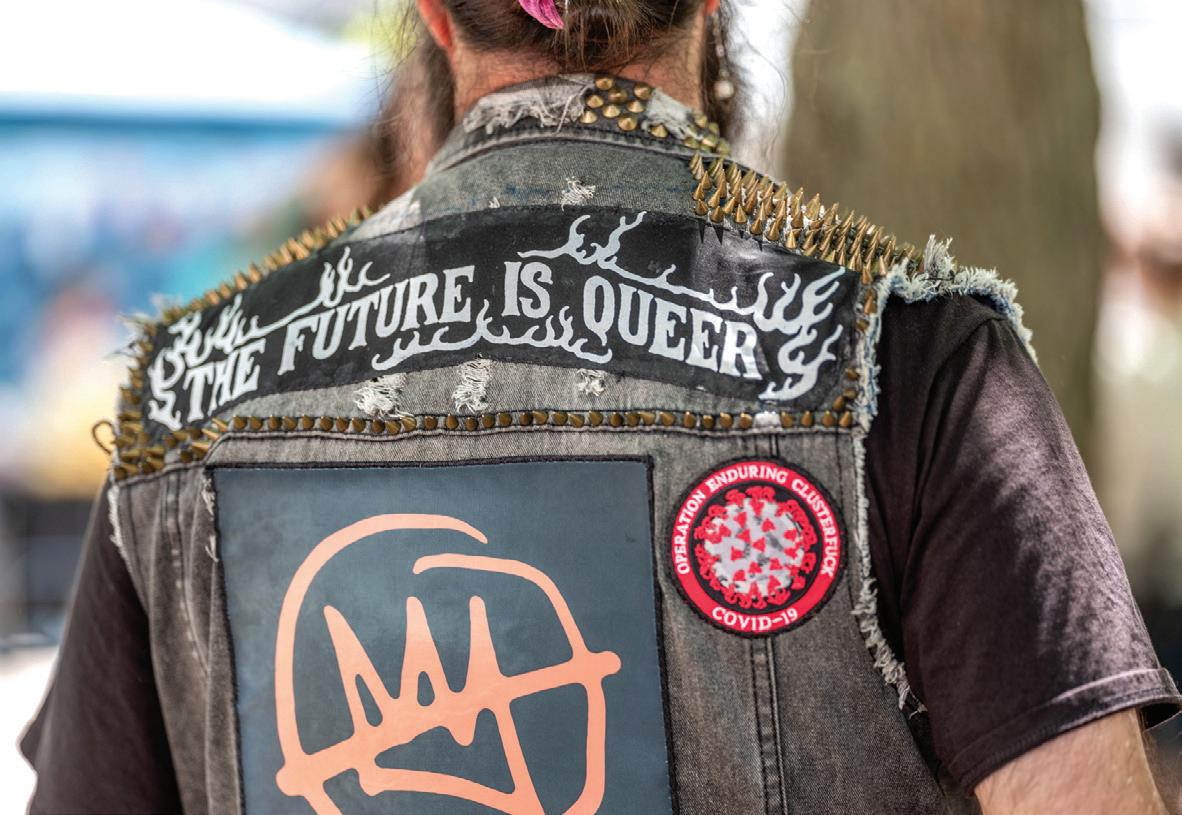
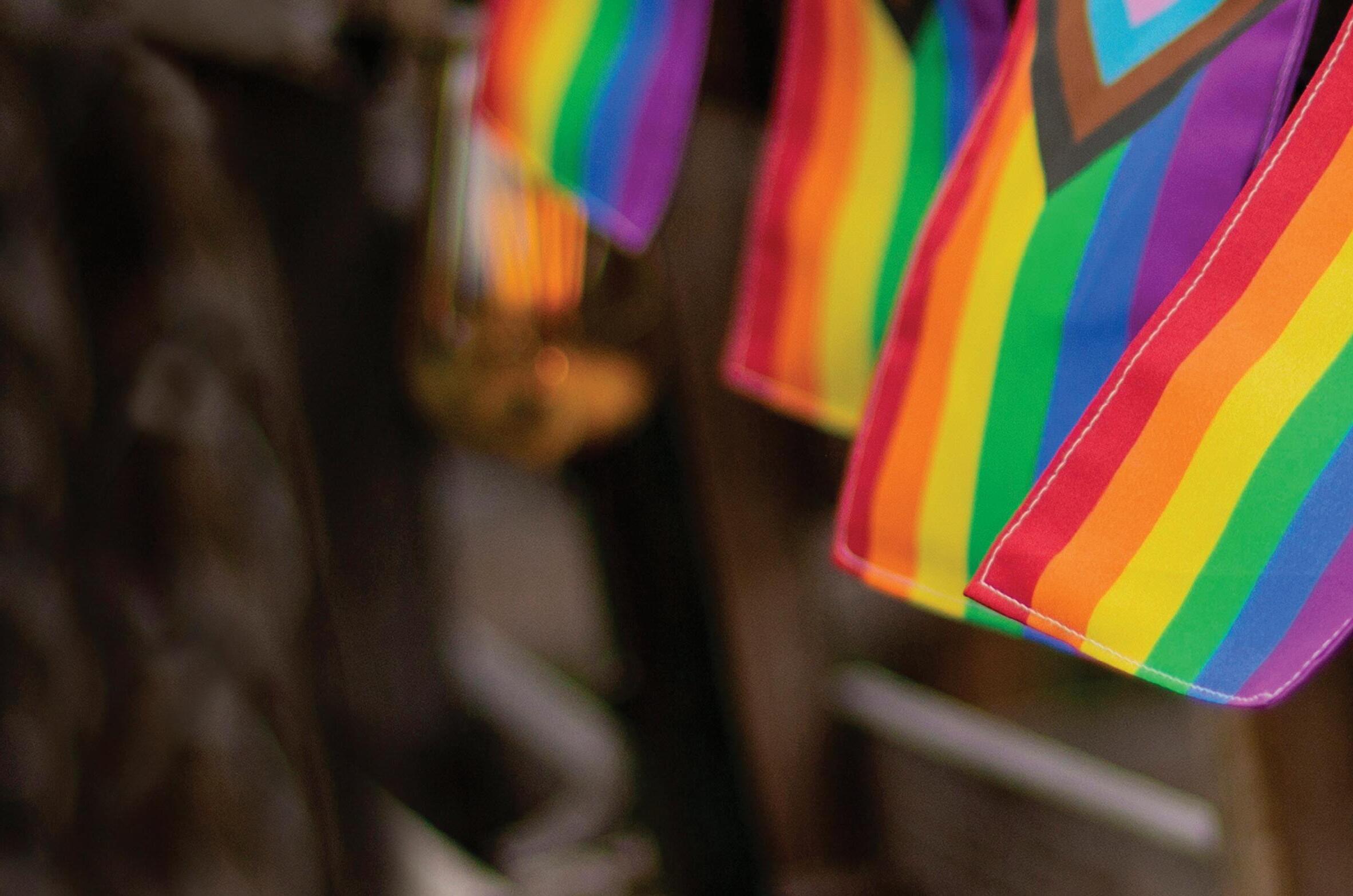
BY SUZANNE LAURENT


While most think of June as Pride month, with multiple celebrations throughout cities and towns in the state, two alternative events take place during September, bursting with their own signature pride.
The rural towns and communities of northern New Hampshire not only support diversity and equality, they embrace it — holding true to the state motto of “Live Free or Die!”
“North Country Pride (NCP) is a nonprofit organization, based in Littleton, where we can all come together to celebrate diversity and honor our LGBTQ+ residents,”
said Jill Kimball, co-chair of NCP.
Towns encompassing NCP include Littleton, Bethlehem, Franconia, Lancaster, Whitefield and the northeast kingdom of Vermont.
“There are a lot of activities in June,” Kimball said. “The Pride Ride began in September of 2020. We had a festival on the riverfront planned, but because of COVID, decided to do a spirited ride through the autumn foliage of Littleton, Franconia and Bethlehem.”
Last year, 65 cars joined the parade, with people along the route waving flags and handing out flowers. The parade ended with an after-party at the Rek’-Lis Brewing Company in Bethlehem.
Earlier this year, NCP received a grant from the New Hampshire Charitable Foundation through the Krakoa NH Fund in Littleton. The $4,375 grant is earmarked for general operating expenses to help assist NCP’s commitment to supporting the queer community at large. This came after disheartening events in

2023 when Littleton Selectboard member and NH state Sen. Carrie Gendreau publicly criticized inclusive artwork sponsored by NCP and went on record to state that the artwork was “not good,” and that they “didn’t want any more of it in their town,” and that the flower and image portrayed in the artwork was “demonic in nature.”
The art, which went up last summer on the side of a Chinese restaurant, featured a subtle rainbow, meant to symbolize inclusivity for the LGBTQ+ community, as well as a blooming iris, dandelions and birch trees.
The controversy grew regionally and nationally, causing negative press for the town, and resulted in the resignation of the Littleton town manager, Jim Gleason, whose son came out to him at age 16. He lost this son to cancer at age 35 in 2016.
Gleason resigned in February 2024, and Gendreau did not file for reelection to the selectboard this year.
“It was a terrible time for (Gleason) and us, but we’ve moved on,” Kimball said. “We’re looking forward to this year’s ride. We’ve

“A lot of LGBTQ+ kids didn’t get to go to their own prom while in high school, so this is for them,”
— Adam Toepfer

changed the original route a little, and North Country Public Radio plays a playlist that coincides with the ride.”
This year’s North Country Pride Ride will be held on Sept. 22, with the after-party held at the Rek’-Lis Brewing Company in Bethlehem. Registration for the ride and after-party is $10 per car.
Adam Toepfer is the president of Keene Pride, a nonprofit organization and passion project he started in January 2022.
This year’s Pride Festival will be held in the Elm City on Sept. 15. Keene has long-been nicknamed Elm City because of the large number of elm trees that were once a main part of the downtown Keene tree population.
Pride festivals are often in June to commemorate the 1969 Stonewall uprising in New York City on June 28,

when a police raid at the Stonewall Inn gay bar turned violent, prompting LGBTQ+ activists to organize demonstrations and protests.
While there are Keene events in June, the main event is the September Keene Pride Festival, billed as the largest Pride event in the region, with more than 5,000 expected attendees and 100 vendors including artisans, nonprofits, live music acts, food trucks, circus performances, drag queens, kings and much more.
“It’s a great time with the kids back at college, and we can include them in our festival,” Toepfer said. “Many small towns do this in different months, as they don’t want to compete with everyone else in June.”
One event that is held in June for Keene Pride is a prom for adults over 18. This year’s prom theme was “Super Queeros,” held on June 29 at Heberton Hall in Keene.
“A lot of LGBTQ+ kids didn’t get to go to their own prom while in high school, so this is for them,” Toepfer said.
The festival’s kickoff event this year is
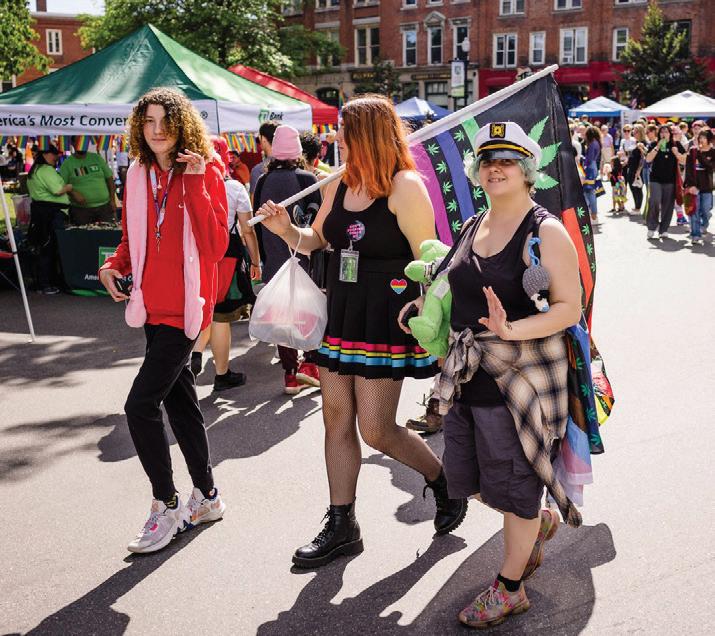
a drag show at the Colonial Theatre on Sept. 7. The first year it was a tribute to Madonna. This year’s theme is a tribute to Britney Spears with a bevy of RuPaul Drag Race All Stars and more.
“I left my hometown in 2005 and spent 16 years in New York City working in the nightlife, entertainment and technology industries,” Toepfer said.
“I returned to Keene in 2021 and found that the LGBTQ+ community was highly under-recognized and underserved. This is how Keene Pride began. I live in Keene nearby my family and am a very happy uncle to four beautiful children.
01-03 Photos from a previous North Country Pride Ride Truck Love. Photos courtesy of Jill Kimball 04, 06 Keene Pride features drag queens, circus performances, music, a prom and more.
Photos courtesy of christopherdavidstudios
05 Beth Leilnau with Keene Pride Board Member Samantha Belle at the 2023 Keene Pride Festival.
Photo courtesy of christopherdavidstudios
BY MIKE COTE / PHOTOS BY ROBERT ORTIZ
Ateam of volunteers from Fidelity Investments spent a rainy morning in May working on landscaping at the Boys & Girls Club of Manchester, pushing wheelbarrows full of mulch.
For annuity specialist Doro Koita, the event was a homecoming. The Central High School graduate spent much of his teen years at the club, playing basketball, working on his homework, and, later, volunteering.
Koita’s path to a full-time job at the company’s Merrimack campus began when he was selected as one of three participants for the inaugural six-week summer fellowship program offered by Fidelity Investments Life Insurance Company (FILA), which was created in partnership with the club.
“I work with phones and financials,” says Koita, who spends his workdays wiring out money and handling phone calls from clients.
This summer, Koita is welcoming the second round of participants and helping to integrate the four high school students with his team.
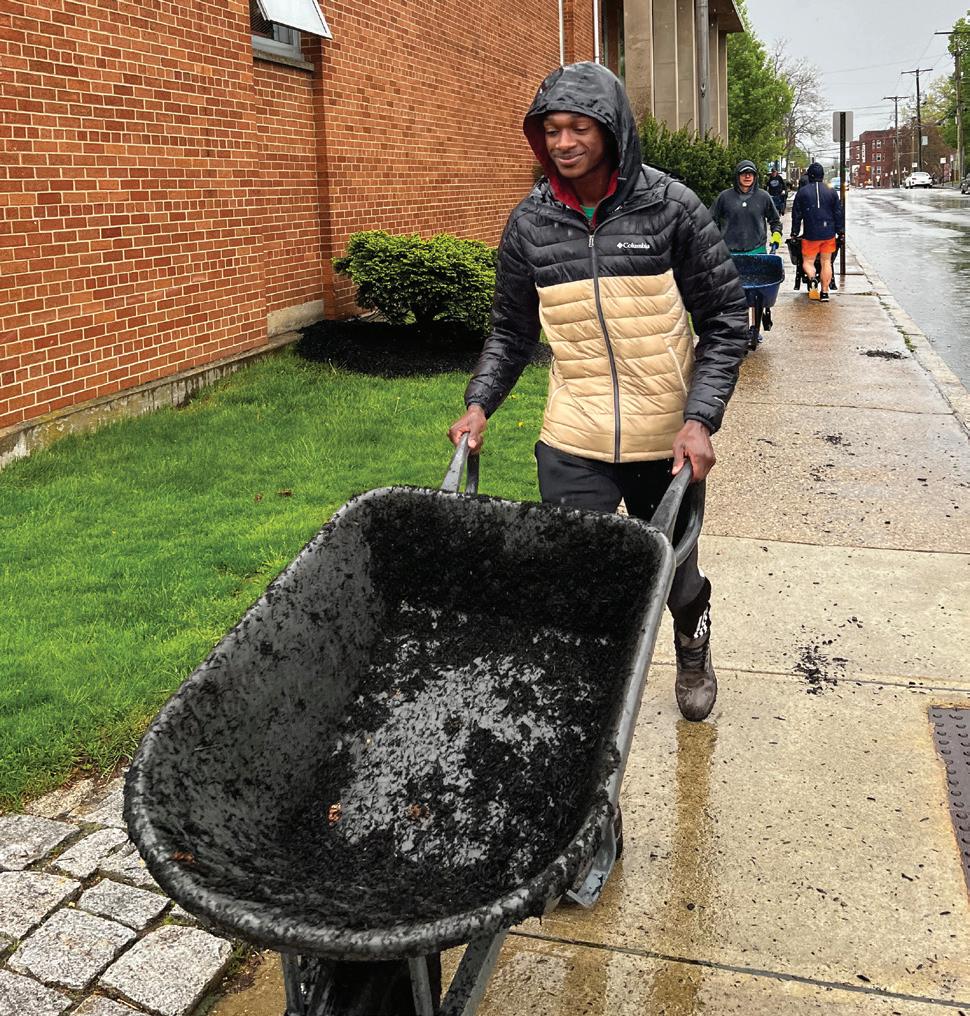
Doro Koita returns for a mulch refill during a landscaping project at the Boys & Girls Club of Manchester in May.
“I’m definitely motivated to help the kids out, because I know about three of them personally,” said Koita, who also has been taking college classes part time. “It’ll be fun to see what they bring to the table and then what we bring to the table for them in the summer.”
The fellowship, new to the company’s New Hampshire campus, was modeled after a similar one Fidelity established in Boston in 2011 with the Boys & Girls Clubs
of Boston and Cathedral High School.
“The fellows do 50% of their day in a program that’s really geared towards teaching them what it’s like to work in a professional environment, and then we take the other 50% of the program, and they’re going to do something for us,” said Deb DiMarzio, head of FILA operational controls and business readiness at Fidelity Investments.
“They’re getting paid,” she added, speaking in a video that was shown at the Manchester club’s annual Foundation of Friends Breakfast in April. “This is a paid fellowship.” DiMarzio, who visited the Boston program as part of her planning for the New Hampshire fellowship, hopes to broaden the local program’s reach.
Transporting students from the Manchester area to Merrimack has been a challenge.“Our biggest hurdle that really differentiates us from the Boston
“I work with phones and financials.”
— Doro Koita

Annuity specialist Doro Koita secured a full-time job with Fidelity Investments in Merrimack after participating in a summer fellowship program for high school students.
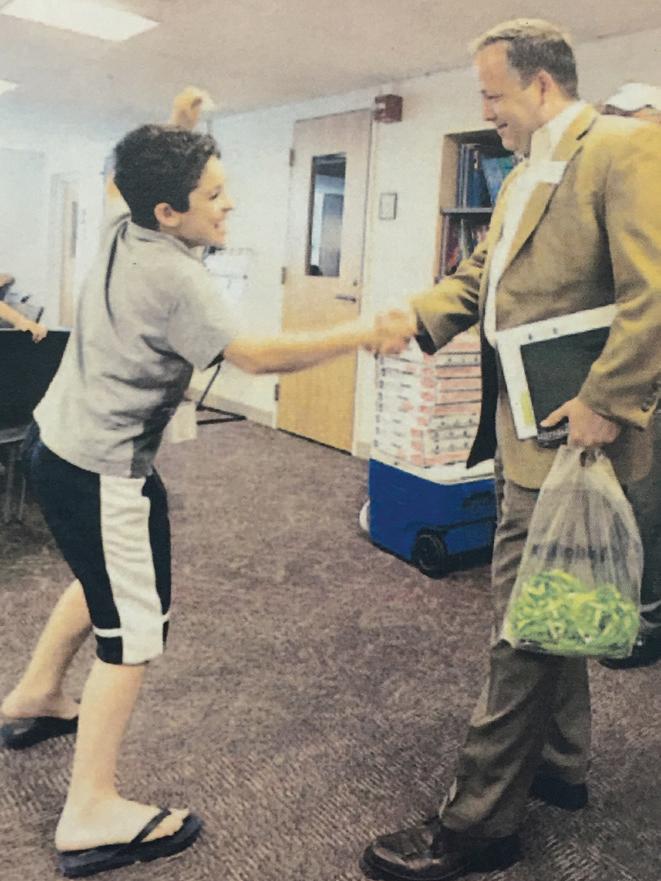
ABOVE: A young Wesley Olmeda shakes hands with Joe Murray, who became his pen pal through a partnership between Fidelity Investments and the Boys & Girls Club of Manchester.
RIGHT: Fidelity vice president Joe Murray with Olmeda, who returned to Fidelity Investments in Merrimack this summer for the second year as part of a fellowship program.
program is the lack of public transportation,” she said during an interview at the club in May.
Diane Fitzpatrick, CEO and president of the Boys & Girls Club of Manchester, sees the fellowship as a step toward increasing the state’s workforce pool — introducing students to career options they might not have considered.
“We keep talking about the challenge of workforce development and trying to figure out a solution to that. The solution is this nonprofit business partnership, especially with youth, getting them exposed to industry options,” Fitzpatrick said. “Those corporate partnerships are so critical, because they’re going to help solve one of the big issues we are facing in industry.”
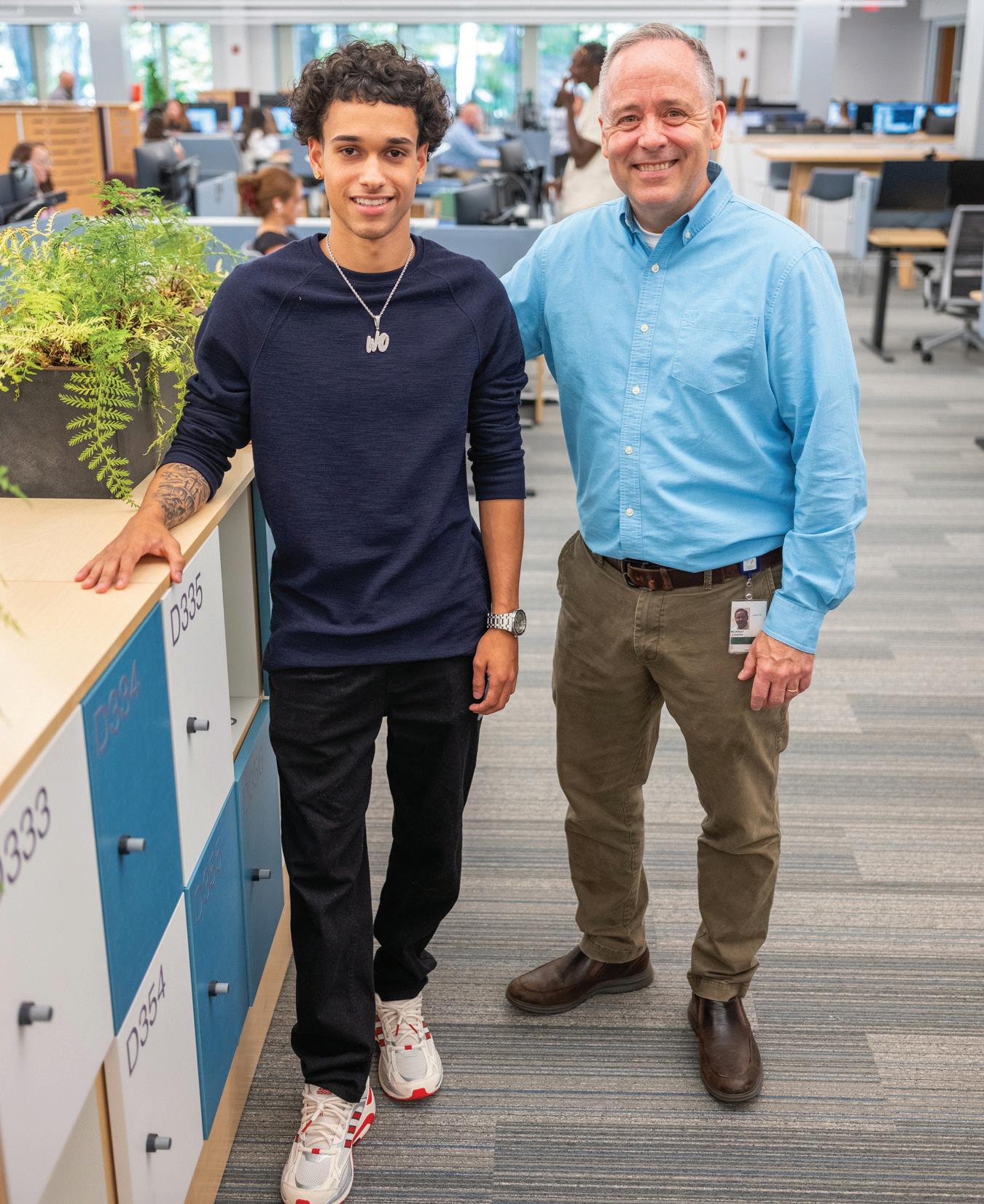
“It was amazing to see that someone I was talking to 12 years ago when I was a club kid... was still there and knew who I was.”
— Wesley Olmeda
Wesley Olmeda, who graduated in June from Central High School, returned for a second year as a fellow this summer.
When Olmeda was invited to the stage at the club’s fundraiser breakfast in April to speak about the program, it sparked a memory for Joe Murray, vice president of government relations and public affairs at Fidelity.
When Olmeda was a third grader, he and Murray were pen pals through a program Fidelity initiated with the Boys & Girls Club. They would exchange letters about once a month, and they finally got to meet when the company hosted a pizza party at the club.
Murray was the last to arrive, which meant Olmeda was the last to get paired with his pen pal. “I saw him sitting by
himself, and I walked into the room, and we both connected. And it was just this wonderful moment,” Murray said.
Fast-forward more than a decade later, when Olmeda was called up to speak before 600 people at the DoubleTree Hotel.
“I had just finished a speech so I was kind of nervous,” Olmeda said, recalling when Murray approached him at the breakfast.
“It was amazing to see that someone I was talking to 12 years ago when I was a club kid and when I first started living here — who was there for me and who I could express myself to — it was great to know that this person was still there and knew who I was.”
Now if Olmeda and Murray meet for a pizza party, it might be at Fidelity’s cafeteria.” 603
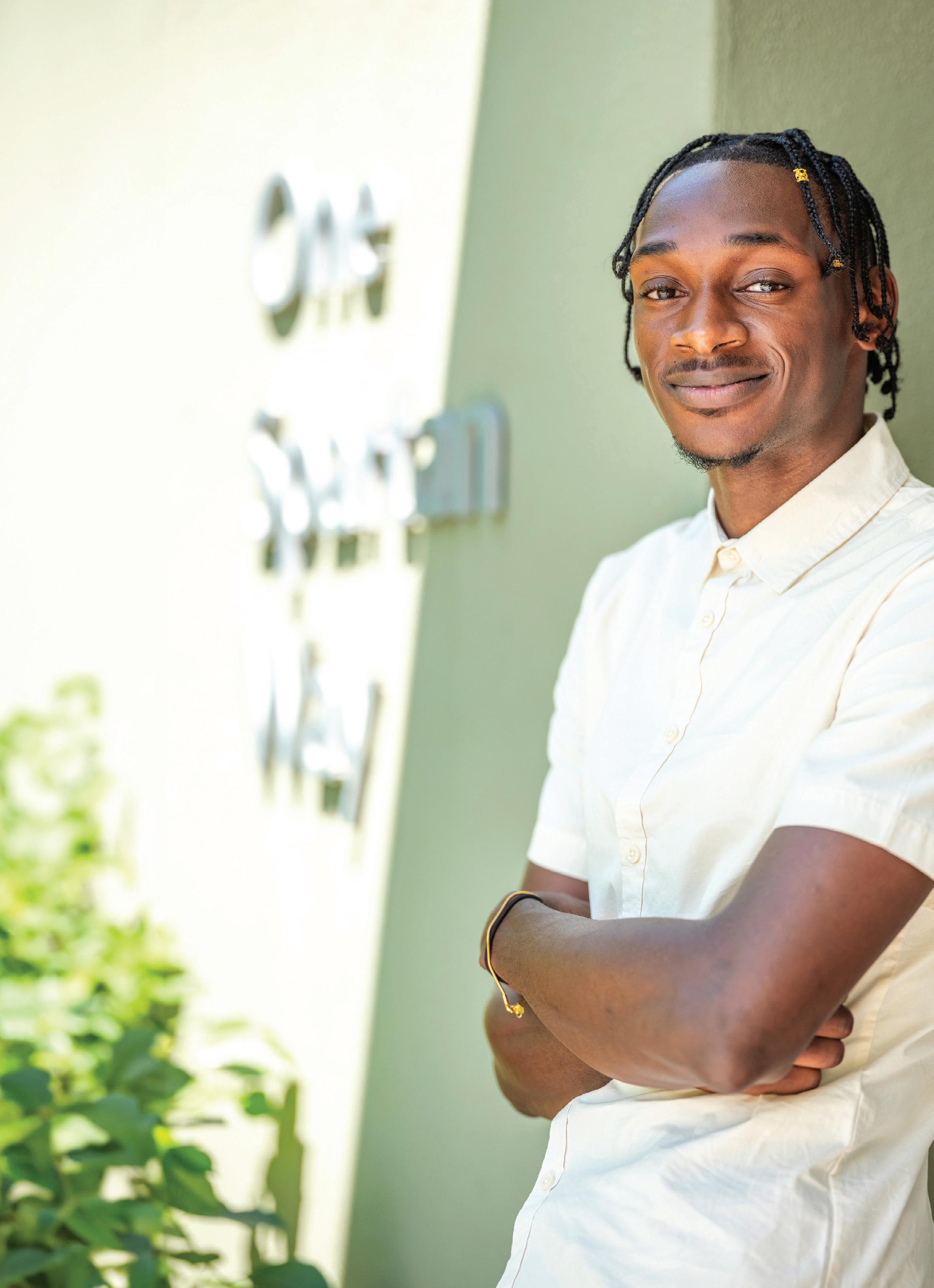
BY DORO KOITA
My name is Doro Koita. I am an annuity new business specialist at Fidelity Investments. I am originally from Philadelphia, Pennsylvania, and moved to New Hampshire during high school, where I attended and graduated from Manchester Central High School.
During high school, I spent most of my time at an after-school program at the Boys & Girls Club of Manchester. I spent a majority of my time there making friends, playing basketball, and becoming the person that I am today.
The Boys & Girls Club was like my second home; I could go there to do my hobbies, get help with any school-related matters, and make lots of connections with the right people. In 2023, I was a 21-year-old club alumnus and a volunteer. I was attending Manchester Community College and majoring in accounting.
One day at the club, staff member Rudi came up to me telling me about the FILI (Fidelity Investments Life Insurance) Fellow Internship program that Fidelity provided to Boys & Girls Club members. At first, I wasn’t that interested, but many people were saying maybe I should try it out. I became a little bit more curious about this program and asked the people who were close to me about it. This made me feel more comfortable about making my decision, because it came from the people who cared about me and my future.
On my very first day at Fidelity, my nerves and emotions were all over the place. The campus was huge and very up-to-date, and everyone looked professional and well put-together. The associates in the program were very kind and willing to help. They made me feel at home and treated me like family. Throughout the weeks I obtained lots of observations and gained knowledge and skills that would be useful for my future. I also had lots of fun networking with new people, job shadowing and participating in the events that Fidelity and my business unit provided.
As the program was ending, I was pulled aside to be told that I was being offered a job opportunity with the New Business group. This was a huge opportunity for me. I felt thrilled and grateful about it. On the other hand, I had to make a huge life decision: either to transfer to a university as a full-time student, or take the job offer and be a part-time student at my current school. This was a very stressful and nerve-racking decision for me, because this decision would determine my life.
Again, I went to the people who were close to me to see what they would say, but I was also aware that I would have to be the one deciding to do what’s best for me. I ended up taking the position as an annuity new business specialist. I am currently 22 years old, attending Manchester Community College studying accounting, and currently employed at Fidelity Investments. I am also a part of the FILI Fellow Internship program, but now I am on the other side. I am involved in helping to make the Internship experience even better for the incoming fellows.
I would like to first and foremost thank God for everything and would also like to thank the Boys & Girls Club of Manchester and Fidelity Investments for all the opportunities that they have given me, letting me be myself and for all the great experiences.
BY YASAMIN SAFARZADEH / PHOTOS BY ROBERT ORTIZ
Researchers study invasive species and plastic pollution to promote healthy aquaculture

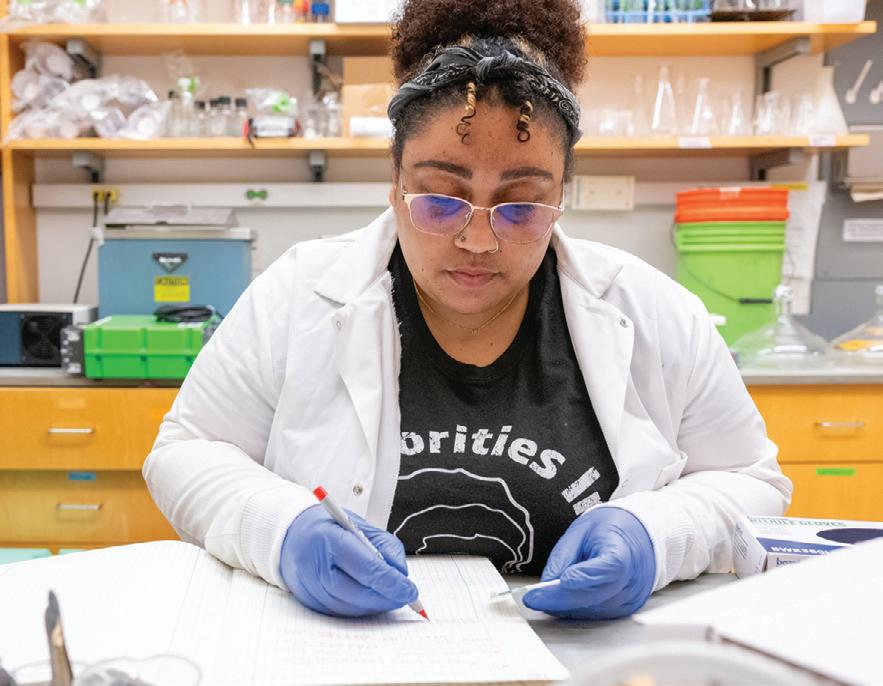
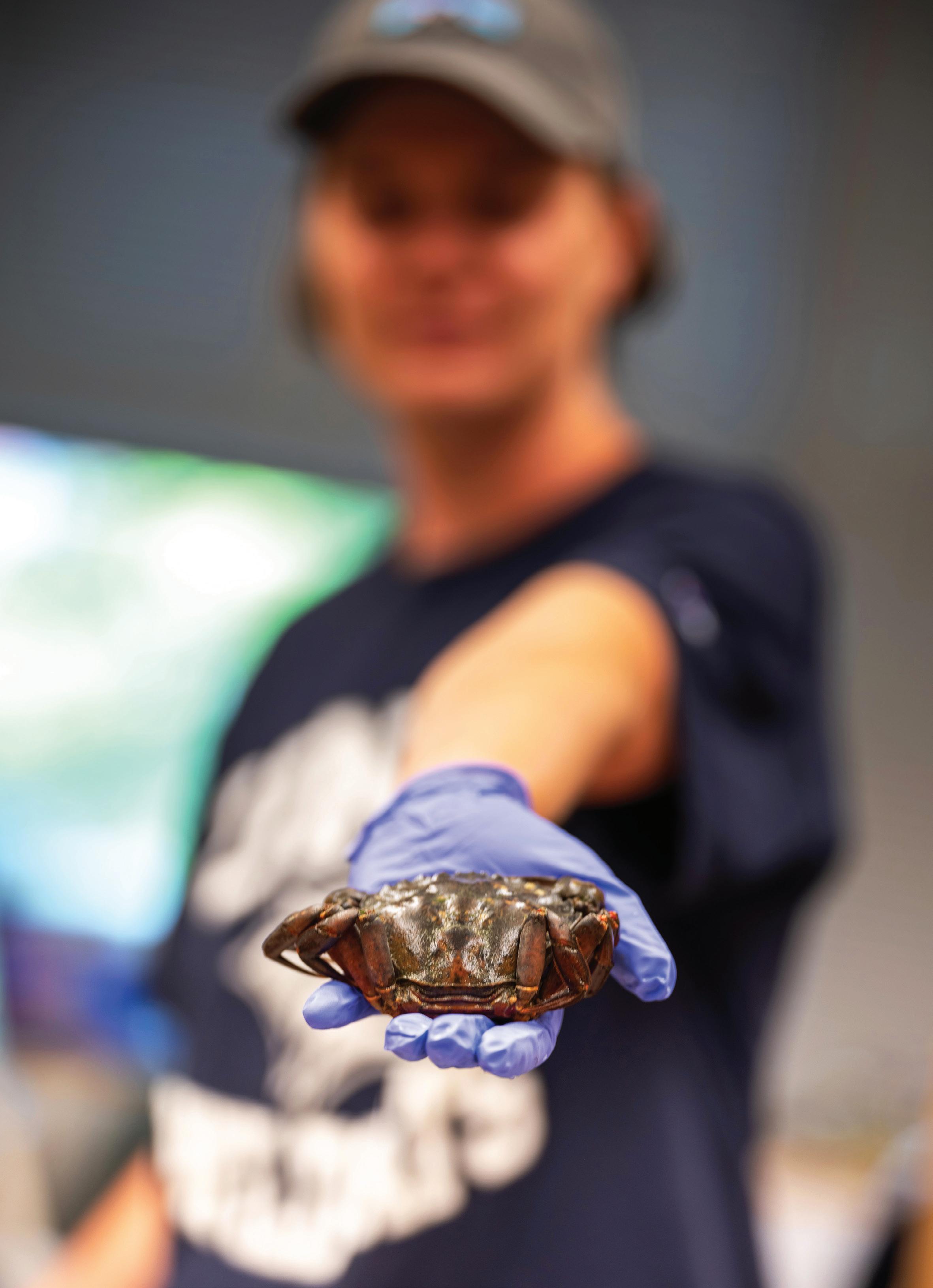
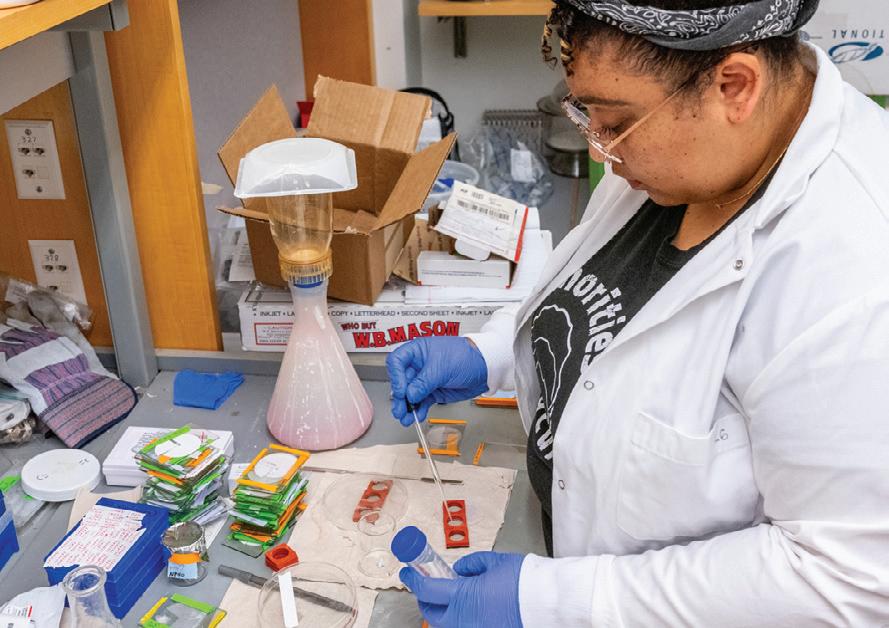
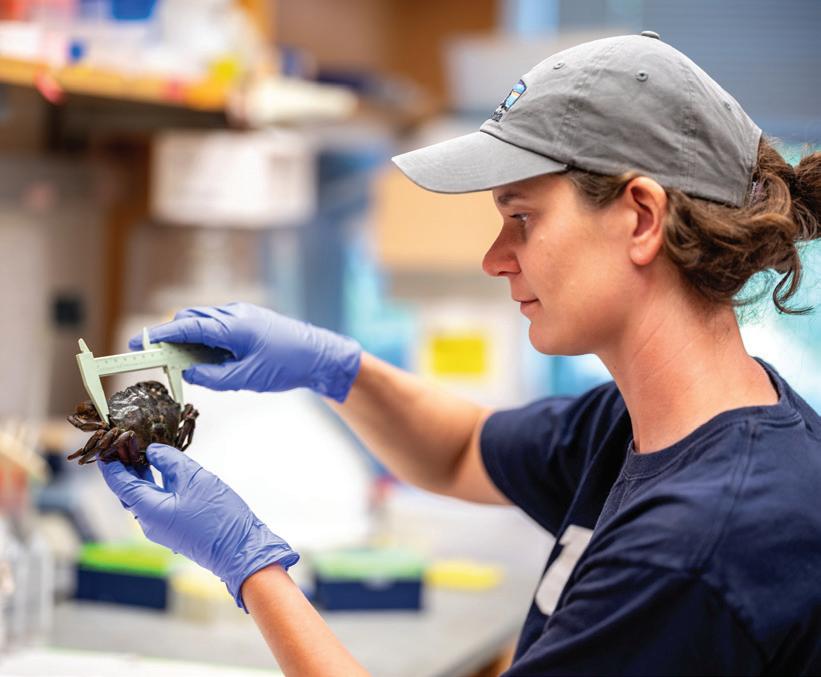
is an economic field that is too often overlooked, not only historically but as a potential booming industry that has many needs and concerns to sustain and grow.
Last summer, the MyTurn program worked with the Nature Conservancy for an innovative youth mural internship, sending its participants to meet scientists from the University of New Hampshire: Taja Sims-Harper and Kelsey Meyer. The two doctoral candidates so inspired the creative interns that when the murals were finished at West High they were chock-full of aquatic life.
Sims-Harper and Meyer took time to sit with 603 Diversity to share how their studies seek to improve coastal habitats along Great Bay and beyond.
The following are edited conversations from earlier this summer.
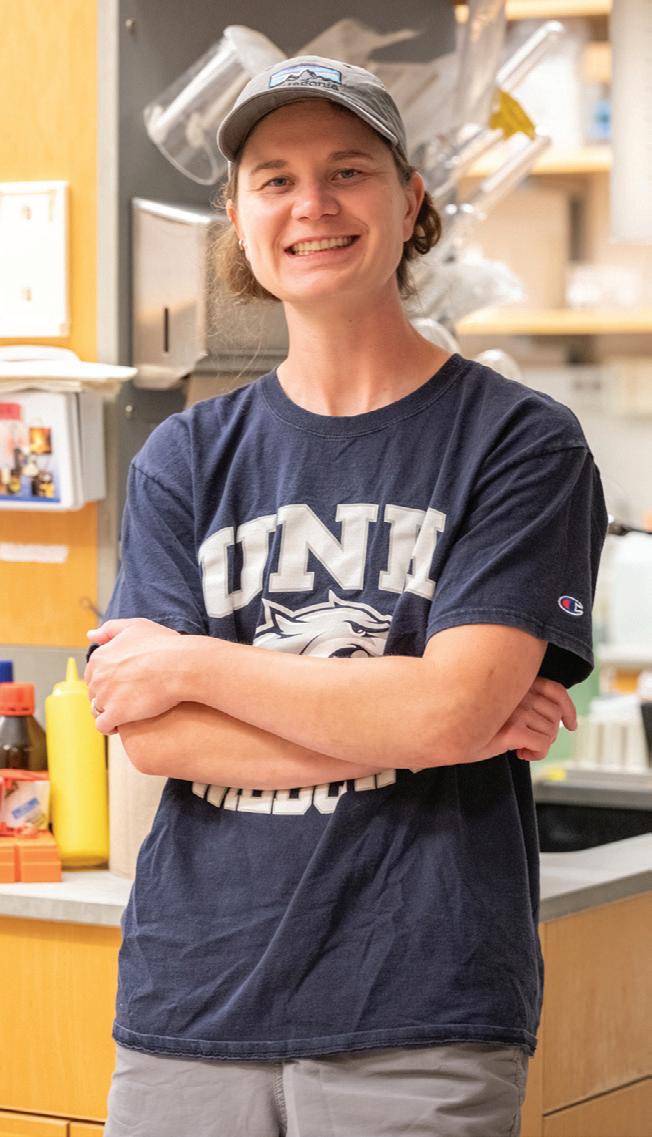
Kelsey Meyer is a doctoral student in the College of Life Science and Agriculture’s biological sciences: a marine biology Ph.D. program. She currently spends a lot of time traversing Great Bay in a small
boat, collecting invasive green crabs, baiting traps and monitoring tiles for oyster spat.
603 D: Where do we begin? What and how do you study for your Ph.D.?
Meyer: Green crab stuff. I pull their guts out to dissect what’s in their stomach.
My Ph.D., essentially, has four foundations, one of which is the social science aspect, where I send out a survey to all the NH oyster farmers inquiring how green crabs are affecting their farms. This is important because I want to know what the farmers’ interests are and what their concerns are so that I can better direct my research.
In addition to this, for the last two years, I have trapped green crabs at oyster reef areas and oyster farms to assess where they are congregating. I was always curious about this arm of research, and right before I started my Ph.D. program, I was helping with my now advisor’s project on spat (oyster larvae) collectors and noticed there were never really a lot of spat, but there would usually be green crabs in the cages with the collectors.
This sparked my interest: How green crabs may be affecting natural oysters, and are green crabs affecting the local oyster farmers and the oyster industry in New Hampshire? There has not been a lot of work on this in NH estuaries, but there is the NH Green Crab Project, which is educating the public about green crabs, using citizen science, and tracking their molting/finding potential markets to utilize this invasive species.
603 D: How does this relate to their guts?
Meyer: I would extract DNA from their stomachs and send it to the UNH Genome Center, and they can tell us every single thing that is in the DNA, which is how
we assess their diet. What the genome sequencing revealed was that they are scavenger types, like if they can eat it, they will. But out of the common organisms in their diet, oysters were not on the top of the list.
The Chesapeake Blue Crabs may be more of an issue due to climate change. Warmer waters are really changing how an ecosystem functions, as well as ocean acidification — this can make the shells softer and more vulnerable to predation (the preying of one animal on another), especially smaller oysters when they interact with large crabs.
The last foundation of the project is green crab predation on oysters using various oyster size comparisons to crab size combinations.
603 D: Now, how does this relate to the aquaculture industry?
Meyer: The bottom line is green grabs are eating oysters to a certain degree. There are other shellfish that are more vulnerable like mussels, soft-shell clams. NH’s oyster farming is growing — it’s not as large as Maine or Massachusetts — but it is becoming a bigger industry and has a lot of potential to yield a healthy income for many New Hampshirites as well as providing ecological benefits. I want to help this industry grow, whether it is with the dissemination of information or assisting in research.
603 D: What are some of your hopes for the future or a fantasy regarding this work?
Meyer: Something that would be very cool ... if green crab harvesters were to partner with oyster farmers. That way they can help clear out some of the green crabs on the farms. Green crab harvesting can provide a food source for humans, bait for other industries and even compost
or fertilizer. It is a natural product that can be utilized in many different ways. I would also like to add: Support your local oyster farmers!
603 D: Are you staying in New Hampshire when your project is done, and when will that be?
Meyer: I want to stay in New England, and I have one more year left.
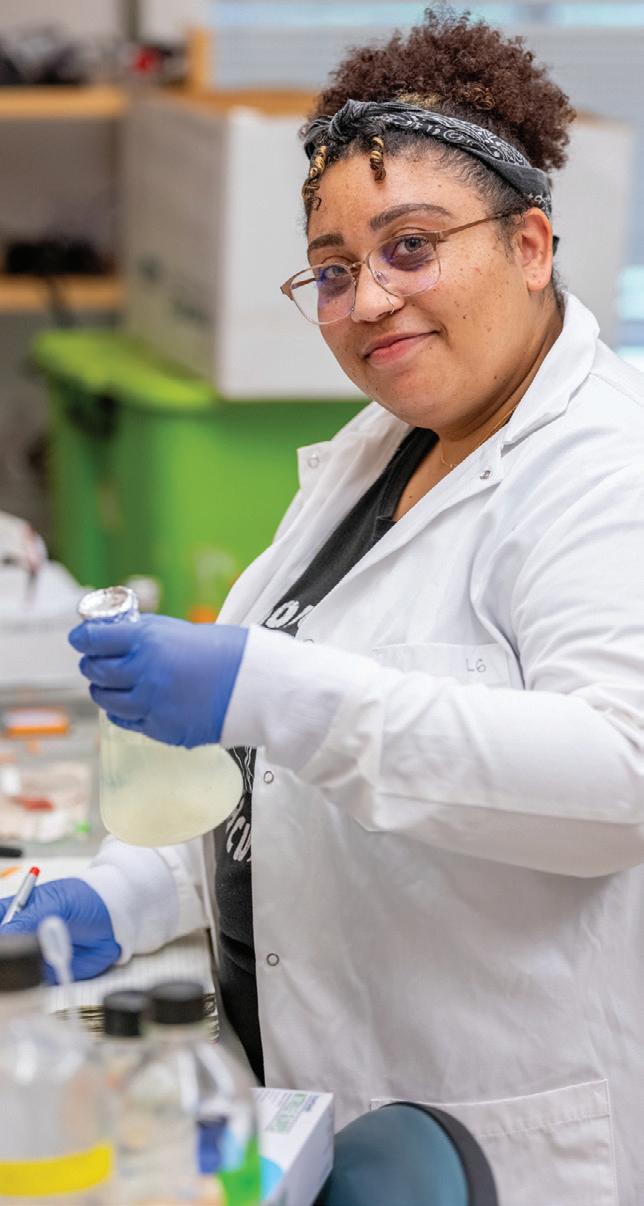
Taja Sims-Harper is also a doctoral student in the UNH marine biology Ph.D. program. She conducts her research on microplastics in oysters and other marine life in Great Bay in the lab of Bonnie Brown, professor of ecological genetics and the chair of the Department of Biological Sciences. She earned her bachelor’s degree in marine science from the University of Maine.
603 D: How does your work intersect with that of Meyer’s?
Sims-Harper: A lot of our studies cross over. As far as when we collect
water samples, what we can use them for, when Kelsey collects green crabs, she gives me a few, for instance. What I am working on is documenting the amounts of microplastics within the oyster populations and what the effects on the oysters and their consumers are.
I also work with NH Fish and Game. They gave me fish to see if there were plastics in the fish as well. Just to get a sense of how much plastic is present in these specimens and how it affects them.
603 D: Why are oysters so important?
Sims-Harper: Oysters are the filtration system of our local biomes. These studies we have been conducting are very important to my knowledge database, because I started my own oyster farm recently. Due to the demands of Ph.D. requirements, however, I had to expand my studies and add fish and crab into the observations to see if it was a food chain issue as well.
603 D: Could you illuminate some of how that works?
Sims-Harper: So, if fish ingest plastics, then crabs eat fish, then people eat crabs, it inevitably affects the whole food chain. What does this mean for each species in the food chain? We have found that the oysters do, in fact, have plastics in their body. Now we have to figure out how that affects humans, because we eat the oysters we’re studying.
One would think that the oysters we study in the wild are healthier than those we study which are farmed, but this is not the case, at least from a consumption perspective, as farmed oysters are tumbled. This means they are removed from the water for up to 24 hours to dry out a bit and so we can scrape off tunicates (little irksome creatures) and sponges (the alive kind). All of this is helpful in creating healthier oysters. Floating cages are integral in this process, which is a practice commonly used in other states that have a more teaming aquaculture economic sector. But for New Hampshire, common practice is still hindered by rules
against floating cages solely for aesthetic purposes.
603 D: Studies in microplastics in marine life are common globally, but it is relatively new for the Great Bay. Are there tensions in this type of research?
Sims-Harper: We can’t run from plastics, so now we should study how it affects us.
603 D: In regards to the format of your Ph.D., how does it all fall together?
Sims-Harper: The first chapter is on collecting water samples from 2018-2022 to obtain a time series in order to establish a data set. I am looking for things like how much plastic, where is it accumulating, and then we are running modeling software, which can detail up to three days before and after the particle was collected, where it was going and where it had been!
The second chapter is comparing samples from the wild to samples that were farmed. I added samples from New Jersey and Maine to get a larger data set. Overall, we found that farmed oysters had up to 50% less plastics.
The third segment is the experiment. I am looking at depuration, a process which basically is putting shellfish in massive tanks of super clean water to see if they can filter out the toxins in their body. This process is usually reserved for shellfish, which are from regions containing nonpotable species or areas where they are not allowed to be farmed. I want to see if this process can be used to clean out plastics from the oysters.
603 D: This was so informative! Does anyone else have your back?
Sims-Harper: My mom is my biggest advocate. She reminds me a lot, even when I am in a big impostor mental state, that this is the stuff I am passionate about and that I have invested years into this work. She reminds me to finish the Ph.D. I started. She reminds me that I have my farm already, and she reminds me that this work and research I do will be disseminated back to my community and my people. 603


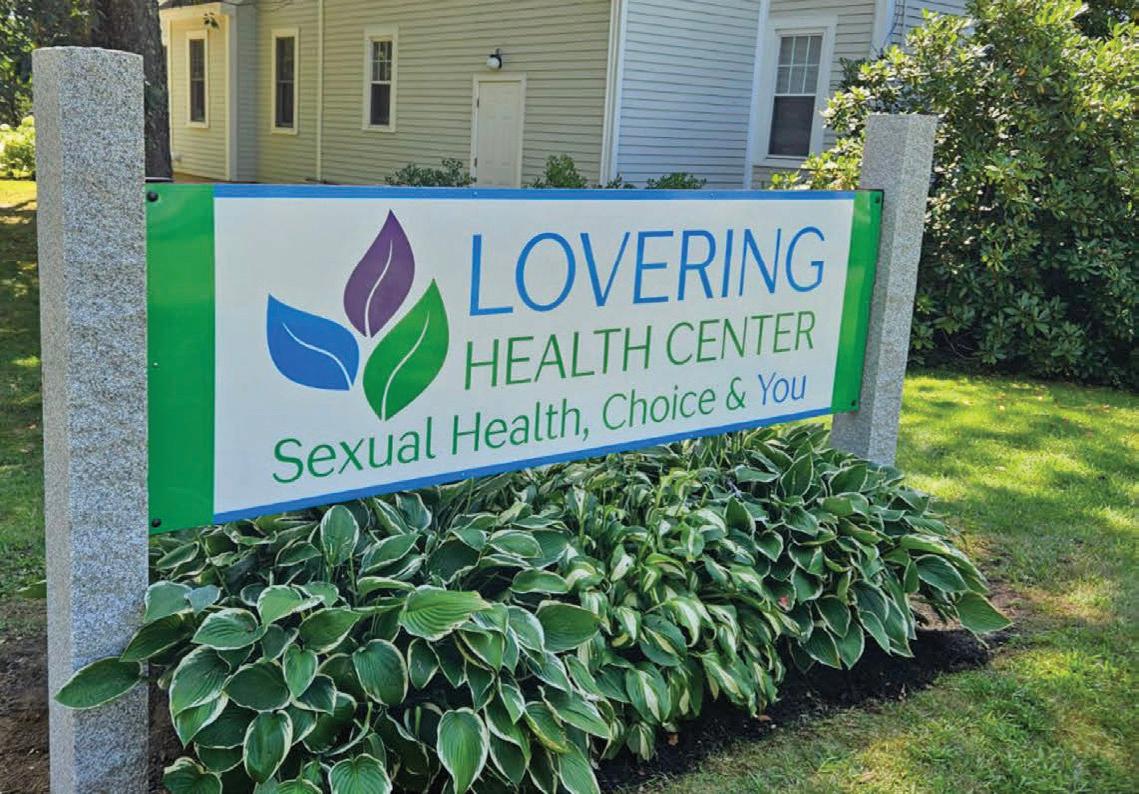








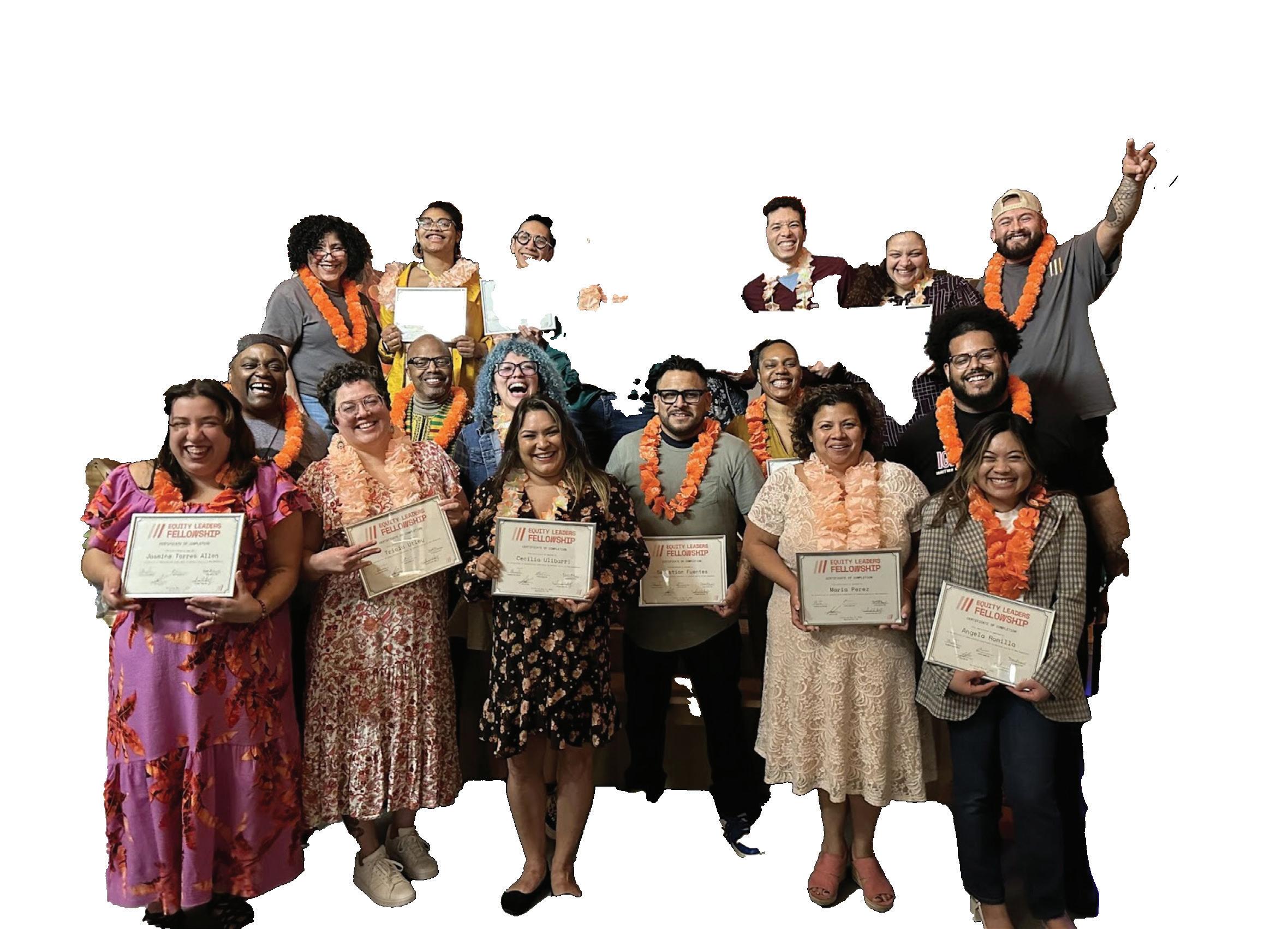
BY AMARA PHELPS
Stubbornly stuck in time like the hearty rock it takes its moniker from, the Granite State can feel behind waves of modern culture and social progress. For the communities of color in New Hampshire who are looking to honor their heritage in a region with an overwhelmingly white majority, this can ring especially true.
Equity Leaders Fellowship (ELF), a New Hampshire-based program designed by leaders of color for leaders of color, works to uplift their voices in Granite State institutions. As a free program for aspiring leaders of color looking to advance professionally and personally, ELF emphasizes the value of sharing space with like-minded Black, Indigenous, People of Color (BIPOC) individuals. It has a dual goal of building understanding of equity and social impact while building a network of engaged community fellows, alumni and advisors.
The program attempts to remove barriers to participation for fellows who may lack experience in continuing education and leadership development, while deepening the conversation on what it means to lead with an equity-focused mindset.
ELF prioritizes skills of self-advocacy and diplomacy to empower the fellows to find their voice and mobilize within their network. With those skills, they can create change in their community and the workplace. A major feature of the ELF experience is board exposure, where fellows are matched by their interests to local nonprofit committees and boards for an insight into the operations of professional decisions.
Guided through legalese, jargon and sessions by their board champion — an individual selected from the board to mentor and steward the ELF fellow during their six-month tenure — candidates are invited to sit in on voting
sessions and subcommittee meetings. Many fellows over the last decade have been invited to retain full-time positions with their placements, with some even rising in ranks of responsibility. Each move reinforces the tenacity of the web of connections ELF holds, enriching the wealth of resources and social capital available to its members.
Leadership team member Dottie Morris offered inspiration in her keynote speech at the fellowship’s recent 10-year anniversary gala, reflecting on the ways in which ELF’s mission have begun to resemble that of an Olympic relay. Her analogy was that the key to success lies not always in being the fastest on the track, but in the swift and purposeful passing of the baton between hands of leadership for a brighter future.
Securing this handoff of insight and strategy is integral in ensuring that people of color continue to have a seat at the table and grow their impact and reach in these spaces.
Guest panelists of peer experts aim to ignite passionate and critical conversations among fellows during the six months of programs. These sessions and the interactions that come from them drive the ELF mission; amassing and engaging a network of mentors, advisors, board members, and alumni to uplift one another’s missions and goals.
The program recently graduated its 10th cohort of fellows, racking up an alumni account of over 115 participants since its conception in 2014. This expansive and impressive list of alumni, which included the program’s six founders as well as its foundational cohort, forms an ecosystem of mentorship, guidance and trust for new recruits to rely upon on their journey. The community surrounding ELF has become unified by creating a more equitable world via their own projects and ideas.
Although fellows are tireless civic servants, self-care has become a core element of the energy that thrums through their programming and culture. Many fellows have expressed how the
group’s meetings have become a refuge after finding themselves engulfed in New Hampshire’s predominantly white neighborhoods and institutions.
Swimming upstream, these leaders are often pushed to the wayside, feeling isolated due to micro-aggressive behaviors. Affinity groups and spaces like these allow individuals to collaborate, conceptualize and create together to provide much-needed healing and community to people of color.
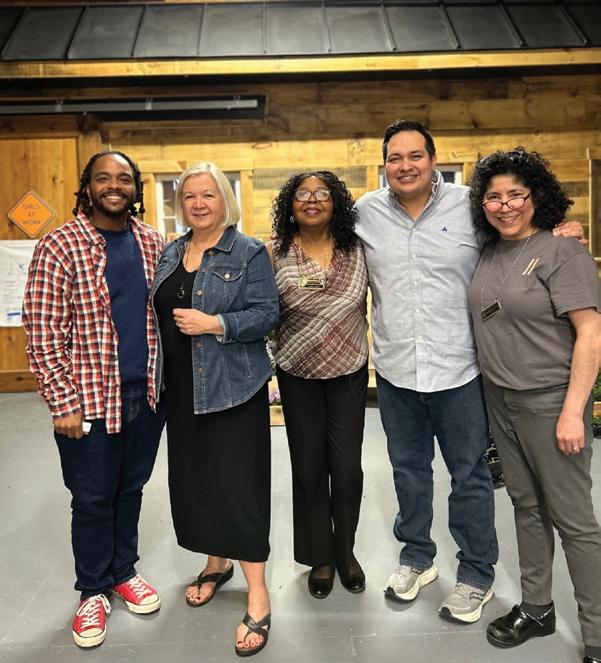
The momentum of ELF’s intent rolls onward unrelentingly as they are already preparing to begin its 11th cohort in September. ELF plans to strengthen the roots it has already planted. Hoping to further cement its hybrid capability and expand further in reach with more accessibility, it has no plans to uproot from the Granite State.
As a product of the grassroots desire and need in the BIPOC community of New Hampshire, ELF’s determination to ensure a just future for all retains its focus on serving the community it was created from. ELF’s critical programming will continue to unify people of color in New Hampshire as it passes the torch onward and upward.
To learn more about the program, apply to be a member of the next cohort, or engage an ELF fellow on your board, contact Jason Bonilla, ELF program director, jbonilla@equityleadersfellowshipnh.org. 603
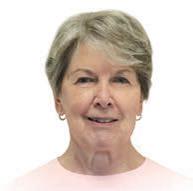


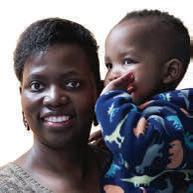


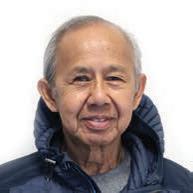

HERE FOR ALL.
At the Y, we are committed to ensuring every community member achieves their full potential. Our flexible membership program enables all individuals and families to become active members. Our join fees, membership dues, and program fees are income-based to ensure anyone can enjoy the Y, regardless of income.
Youth Development
Healthy Living
Social Responsibility
Family Strengthening
The Granite YMCA www.graniteymca.org
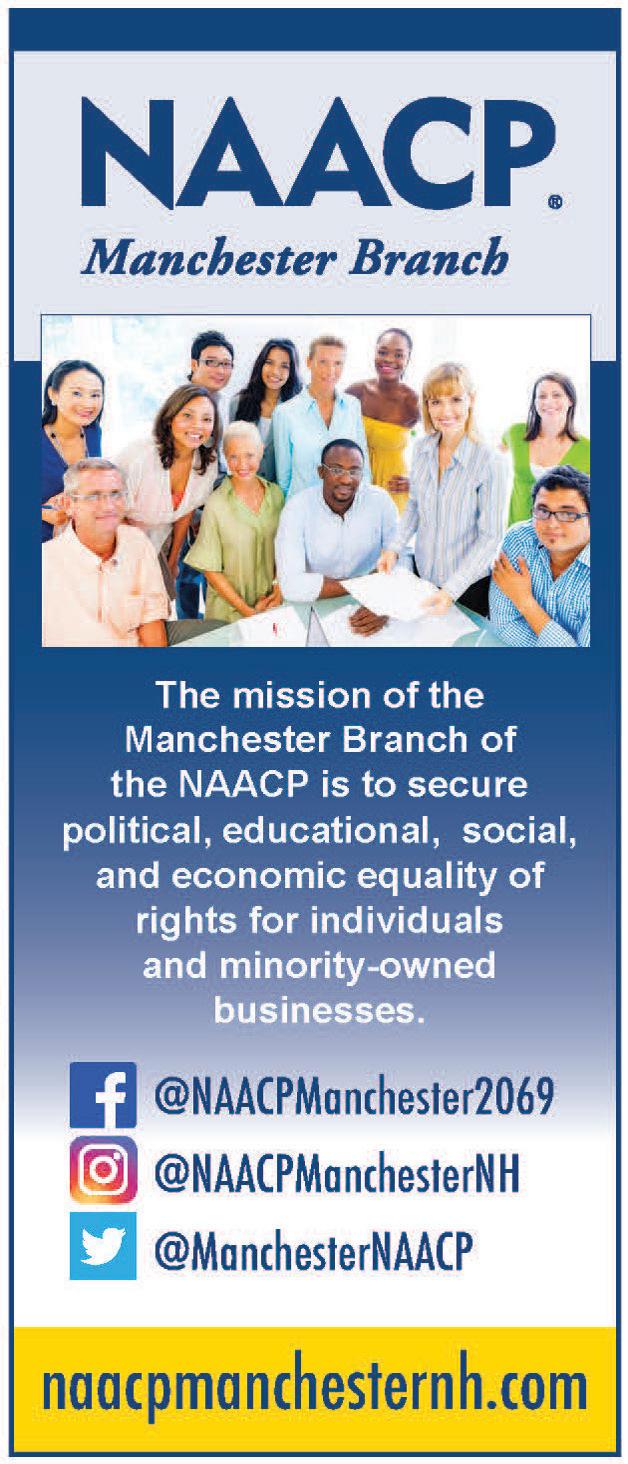

The struggle for civil rights and LGBTQ+ rights in the United States, including in New Hampshire, share deep historical connections, with both movements fighting against discrimination and for equal treatment under the law.
While the civil rights movement of the 1950s and 1960s focused primarily on racial equality, it laid important groundwork that the LGBTQ+ rights movement would later build upon.
As highlighted in the recent PBS three-part series “Disco: Soundtrack of a Revolution,” the modern LGBTQ+ rights movement is often traced to the 1969 Stonewall riots in New York City, when LGBTQ+ patrons of the Stonewall Inn fought back against police harassment. This watershed moment occurred just a year after the assassination of civil rights leader Martin Luther King Jr., at a time when the tactics and successes of the African American civil rights movement were still fresh. Many early LGBTQ+ rights activists drew direct inspiration from civil rights protests, adopting similar strategies of civil disobedience, public demonstrations and legal challenges.
Both movements faced fierce opposition and violence from those resistant to social change. Just as civil rights activists endured beatings, arrests and murders, LGBTQ+ rights protesters also faced police brutality and hate crimes. The AIDS crisis of the 1980s further galvanized the LGBTQ+ community to organize and demand government action, much as the civil rights movement had done in response to racial violence and injustice.
Legally, the LGBTQ+ rights movement followed a similar trajectory to the civil rights movement, gradually chipping away at discriminatory laws through court cases and legislation. The Civil Rights Act of 1964 banned discrimination based on race, color, religion, sex and national origin. While sexual orientation and gender identity were not initially included, this landmark law established an important precedent of federal protection for minority groups.
The intersectionality between racial and LGBTQ+ identities has become increasingly recognized, with many individuals belonging to both communities.
Black LGBTQ+ leaders like Bayard Rustin played crucial roles in both movements, though they often faced discrimination within each. The concept of intersectionality has helped foster greater solidarity between different marginalized groups fighting for equality.
New Hampshire has been at the forefront of LGBTQ+ rights in many ways. The state repealed its sodomy laws in 1975, decriminalizing same-sex sexual activity. This early action placed New Hampshire ahead of many other states in recognizing the rights of LGBTQ+ individuals.
In 1998, New Hampshire took another significant step by implementing anti-discrimination laws based on sexual orientation. This protection was expanded in 2019 to include gender identity, further strengthening the state’s commitment to LGBTQ+ rights.
As with the ongoing struggle for racial equality, the fight for LGBTQ+ rights in New Hampshire and across the country is far from over.
The push for relationship recognition followed a similar trajectory to the national movement. New Hampshire began offering civil unions to same-sex couples on Jan. 1, 2008. While these unions provided many of the same state-level protections as marriage, they did not confer federal benefits. Same-sex marriage became legal in New Hampshire on Jan. 1, 2010, making it one of the early adopters of marriage equality before the 2015 Supreme Court decision that legalized it nationwide.
New Hampshire has also been progressive in other areas of LGBTQ+ rights. The state has allowed adoption by same-sex couples since 1999. In 2019, New Hampshire banned conversion therapy for minors, protecting LGBTQ+ youth from this harmful practice. The state has also taken steps to recognize nonbinary gender identities, offering a gender “X” option on driver’s licenses and IDs since 2020. The Episcopal
Church of New Hampshire was the first in the global denomination to elect an LGBTQ+ bishop.
Public opinion in New Hampshire strongly supports LGBTQ+ rights. A 2022 poll found that 82% of New Hampshire residents supported same-sex marriage, while 88% supported discrimination protections covering sexual orientation and gender identity. This level of support indicates a significant shift in public attitudes over the past few decades.
However, challenges remain. In January 2024, the NH House of Representatives passed two bills that advocates consider attacks on LGBTQ+ rights. These bills, which would affect LGBTQ+ people in schools and other settings and make it more difficult for transgender teenagers to access certain health services, demonstrate that the fight for equality is ongoing even in states with strong LGBTQ+ protections.
Looking to the future, New Hampshire continues to grapple with evolving LGBTQ+ rights issues. The state has made significant progress in many areas, but recent legislative actions show that there is still work to be done to ensure full equality and protection for LGBTQ+ individuals.
As with the ongoing struggle for racial equality, the fight for LGBTQ+ rights in New Hampshire and across the country is far from over. However, the historical successes of both movements provide a road map for progress.
By learning from the past and adapting to new challenges, advocates for equality can work toward a future where all individuals are treated with dignity and respect, regardless of their sexual orientation, gender identity or race. 603

A central part of McLane Middleton’s statement of core values is our commitment to diversity, equity & inclusion. It’s what we believe in.
As part of that commitment, we’re proud to be certified in the Mansfield Rule - a national initiative aimed at closing the diversity gap in the legal profession.
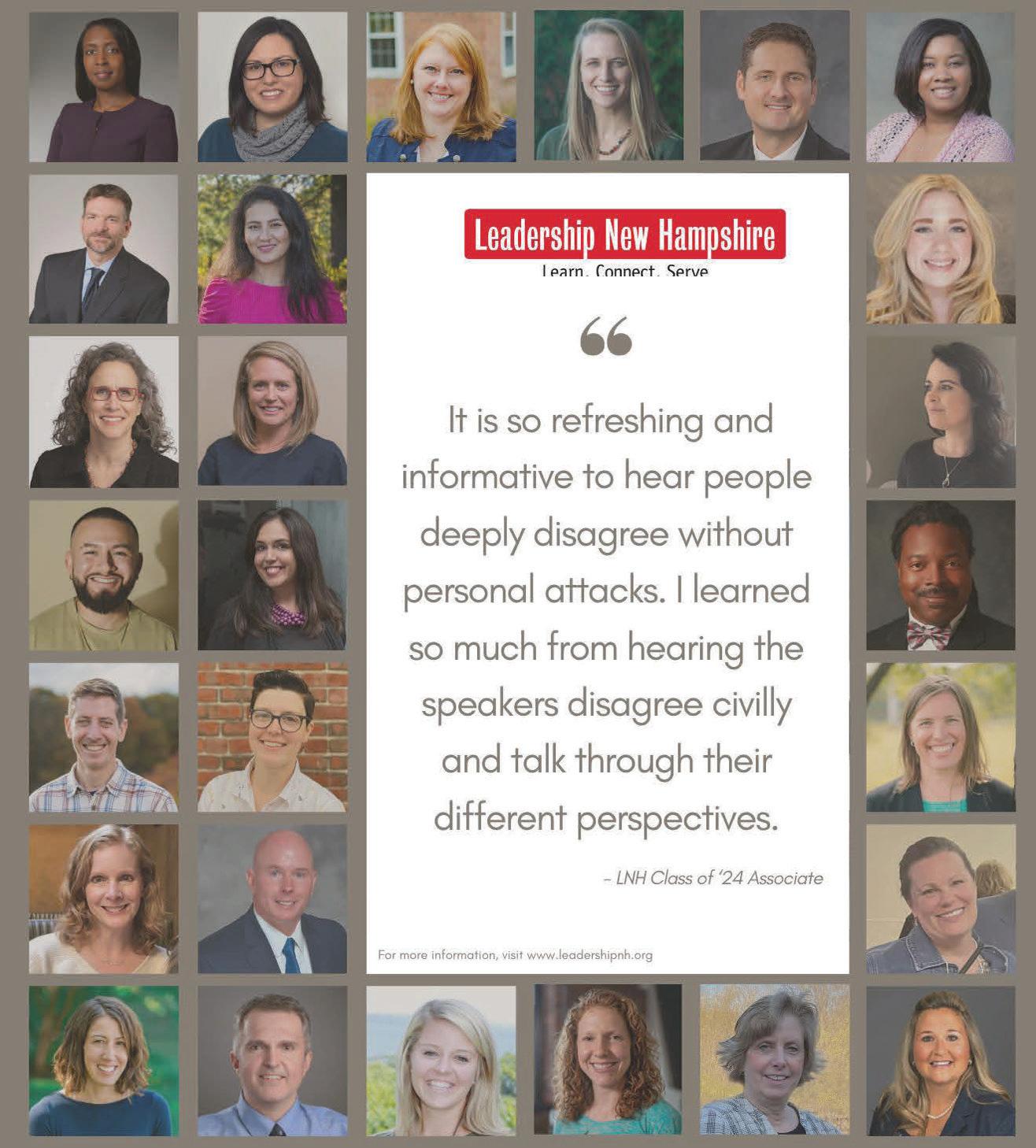
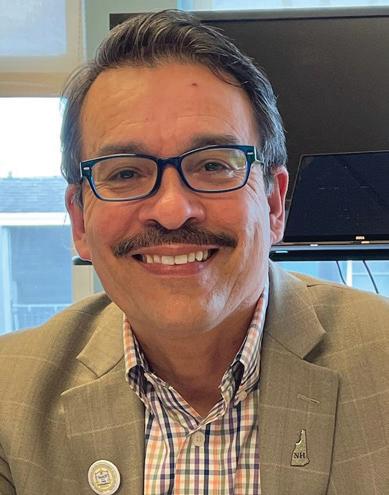
In recent years, an enhancement in support of our NH BIPOC communities is the appearance of publications like 603 Diversity published by Yankee Publishing and championed by publisher Ernesto Burden. Ernesto had the vision and saw the benefit of such a publication, and we should all be thankful to him and Yankee Publishing for taking the risk.
In a brief conversation with him at our BAPOC Conference on May 22 (highlighted on page 12), he informed me that some questioned why such a publication was needed. Such questioning is not surprising to me, but it requires a response.
If you know anything about the history of knowledge dissemination, you know that communities and cultures evolved with the acquisition of knowledge, first through storytelling and then through the reading of pamphlets, books and newspapers. Today, this knowledge continues to be disseminated via television and radio, magazines, podcasts and the internet, which create and carry programming covering every human curiosity.
It has been evident from the beginning that communities of every language and cultural tradition sought inclusion, knowledge and representation via vehicles that shared their histories, politics and traditional sensibilities. If you read history, you soon realize that much of that history is the interaction between diverse cultural and linguistic traditions. This, in turn, fueled the further creation of knowledge and advancement of humankind. That rubbing up against, tolerance and permeability is in large part why we have made so much progress as a human species. Our American cultural tradition is no different. From the very start, America benefits from the diversity that has washed up on its shores or walked across its borders. From English and Scottish to Irish, African, Italian, Russian, Spanish, Greek or Latin American, and so many more cultural traditions, America has been a cross-
roads of different traditions and ways of viewing the world. That we have some semblance of a monoculture is a miracle. Each of those cultures has had its own sources of communication and learning which connects them back to the larger culture.
This tradition continues today. Just browse through your TV channels or turn the radio dial. The internet has every imaginable way to communicate to every subpopulation on our American shores and every place and hamlet in between. We still have not accepted, despite all the evidence in the history books, that America is a diaspora and amalgamation of sorts — and there lies our strength.
This, my friends, is the special sauce that makes America special and unique. It is a strength that the larger culture makes space for creating unity in spaces: be they geographical, artistic or literary, represented by smaller cultural communities different from the larger culture. It is that tension that continues to drive the great experiment (our nation) forward.
Those who ask why have a publication like 603 Diversity do not appreciate or know how America has been built and how we got here. Diversity has always been the strength and the glue that makes us unique and powerful. It questions, it creates, it surfaces mediocrity, it creates tension from which new things are born and it helps us reach for the stars. Our democracy has endured, because only in a democracy can such diversity flourish.
So, no one should feel threatened. The monoculture that unites us all will survive because of our differences. Because of our differences, we need to speak and act via a connecting tradition that represents us all. That is why 603 Diversity is not a threat and why we need it, because it connects us all and because it is a great magazine.
Support it. 603



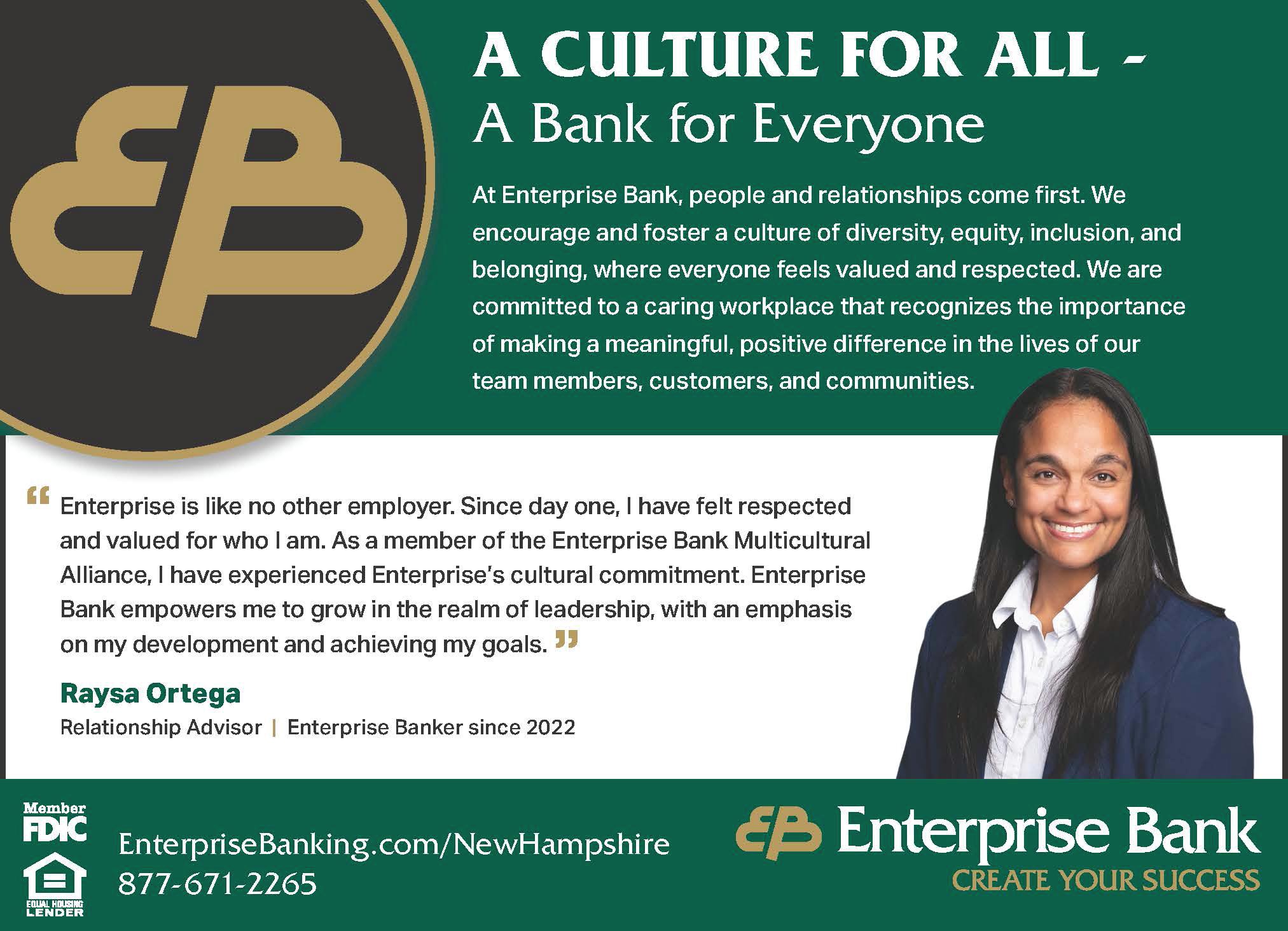
Courtesy photo

BY ALBERTO RAMOS
Whetherit is taking a virtual museum tour to learn more about Latino history, supporting local Latino-owned restaurants or listening to the music of Latino artists, there are many ways you can celebrate Hispanic Heritage Month and immerse yourself in our rich culture.
I identify as Cuban-German American. My father immigrated to the United States from Cuba when he was 18, and my mother immigrated to the United States from Germany when she was three. I had the privilege of growing up in a multicultural family where being Latino was celebrated, and I was encouraged to learn Spanish and connect with my Cuban heritage and family. I’m grateful for growing up with Spanish-speaking caretakers, visiting Cuba and meeting several family members.
One thing I didn’t grow up celebrating or learning much about in school, however, was Latino history in the United States. Indeed, many of the great figures some American historians have chosen to cast as history’s protagonists rarely have names like Garcia or Rodriguez. As a result, it can be easy for some to assume that the story of Latinos in America is somehow separate from the story of America, but it is crucial to remember that Latino history is a critical part of American history.
Many Latino figures were integral to the founding of our nation. For example, the Spanish-born naval officer who served in the American Revolution, Jorge Farragut (born Jordi Farragut Mesquida), or his son David Farragut, who was a Union Navy officer during the Civil War and later became the U.S. Navy’s first admiral. Or Luis de Unzaga y Amézaga, the governor of Spanish Louisiana who provided early support to the Continental Army by covertly sending supplies and intelligence. To truly celebrate American history, we must celebrate how much Latinos have contributed and continue to contribute to that history.
Hispanic Heritage Month, also referred to as Latino Heritage Month, recognizes the accomplishments and rich history of the Latino community within the United States from Sept. 15 to Oct. 15. It was first celebrated as Hispanic Heritage Week in 1968 under President Lyndon Johnson. In 1988, President Ronald Reagan helped expand Hispanic
Heritage Week into a 30-day recognition by signing it into law. Hispanic Heritage Month is celebrated during the months of September and October to coincide with independence celebrations in several Latin American countries.
The Latino community is woven inextricably into the fabric of our American culture. According to the 2020 U.S. Census Bureau data, Hispanics and Latinos comprise more than 19% of the U.S. population, making us the largest ethnic minority in the U.S. According to the same census data, there are more than 63,000 Hispanics and Latinos living in New Hampshire. Data from the New Hampshire Center for Justice and Equity show that the Latino population in New Hampshire has grown by more than 60% in the past decade.
Here are some recommendations for celebrating Hispanic Heritage Month in New Hampshire:
1. Visit a virtual Latino history exhibit
The new Smithsonian National Museum of the American Latino advances the representation, understanding and appreciation of Latino history and culture in the United States. While the Smithsonian is currently in the process of securing its own building, there are several ways to engage with the museum. The Molina Family Latino Gallery at the National Museum of American History is the first Smithsonian exhibit dedicated entirely to Latino contributions to the United States. A virtual self-guided tour of the inaugural exhibit ¡Presente! can be viewed online. You can support the fundraising for the new building at latino.si.edu/donate.
2. Practice your Spanish
There are several ways to engage with other Spanish speakers through the state. “Latinos en New Hampshire” is a Facebook group for Latinos and others interested in speaking Spanish with people throughout the state. There are even more localized groups online. You may also wish to take a Spanish course with one of the many apps or online resources available.
3. Support Latino-owned businesses
Odysea Coffee Roasters in Bristol near Newfound Lake is one of my favorite places to get coffee in the state. They source their coffee
beans from co-founder Francisco Galeano’s family farm in Honduras. They also serve delicious food for breakfast and lunch. This Hispanic Heritage Month, Plymouth State University is collaborating with Odysea Coffee to introduce students to quality, craft coffee that is ethically sourced.
Another one of my favorite spots in New Hampshire is Casamigos Mexican Restaurant in Tilton and Concord. They serve a variety of authentic Mexican dishes and drinks, and I’ve never been disappointed with what I’ve ordered. My wife and I often like to share the Molcajete. They are opening a sister restaurant, Casa Lago Cantina, in Tilton. Arándano Farm in Belmont offers organic-fed, pasture-raised chicken, grass-fed pork, eggs, naturally grown vegetables and microgreens. Co-owner Angela also owns Gluten Free or Die Bakery.
Both businesses can be seen at several farmers markets.
4. Read a book from a Latino author Some of my favorite Latino-authored books include Gabriel Garcia Marquez’s “Cien Años de Soledad” (100 Years of Solitude), Paul Ortiz’s “An African-American and Latinx History of the United States,” and Carlos Eire’s “Waiting for Snow in Havana.” Penguin Random House also has a great curated list of books to read for Hispanic Heritage Month, which includes “The Vanishing Maps” by Christina Garcia and “Solito” by Javier Zamora.
5. Listen to music from Latino musicians Oftentimes, when people think about Latin music they think about dancing music like Cumbia, Reggaeton and Salsa. But some of my personal favorite Latino musicians include José González, No Te Va Gustar and Euge Grosso. These art-
ists expand the definition of what “Latin music” can be.
6. Watch a movie about Latino lives
One of my favorite recently released movies, “La Sociedad de la Nieve” (Society of the Snow), shares the incredible true story of the Uruguayan rugby team whose plane crashed in the Andes Mountains in 1972. Those who survived the crash worked together to stave off frigid temperatures and starvation while stranded in the mountains. Other great films include the biopic “Selena” (1997) and the coming-of-age romantic comedy “Música” (2024). At Plymouth State University, we are planning to host a movie night for students as part of Hispanic Heritage Month.
As you celebrate Hispanic Heritage Month this year, remember that Latino history is American history. 603

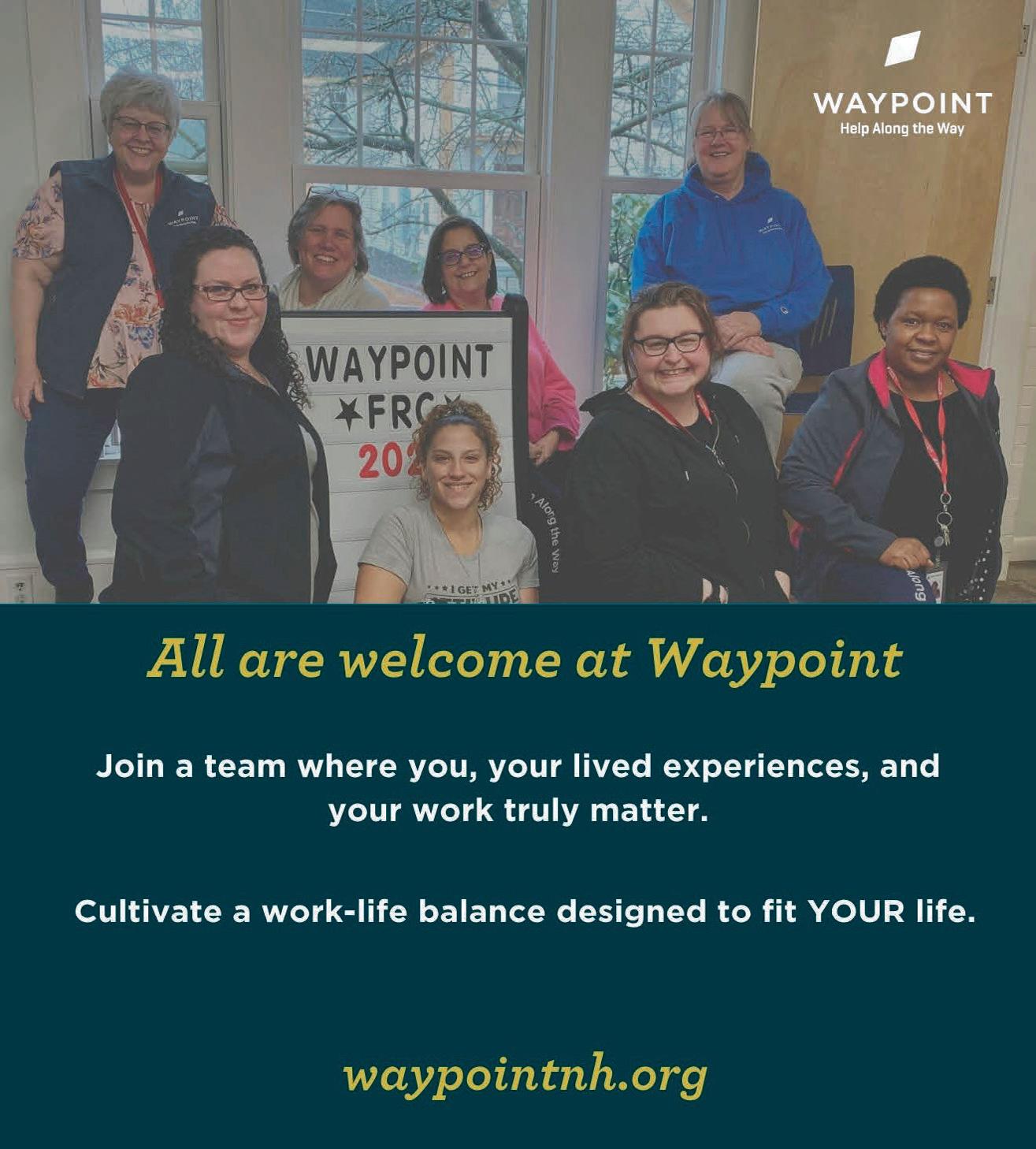

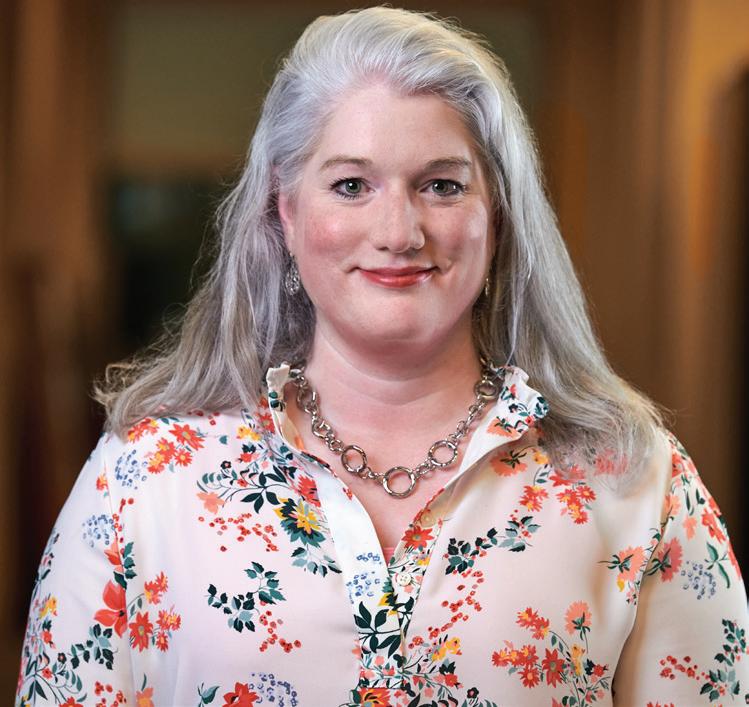
Sanborn Solutions is your go-to source for LGBTQ+ diversity and inclusion support. Through training and consulting, we can help your organization enhance its LGBTQ+ cultural competency and best practices.
Sanborn Diversity Training Solutions www.sanbornsolutionsllc.com (603) 434-0068


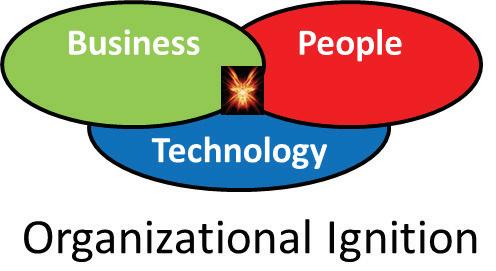
Organizational Ignition helps organizations reach and sustain their ignition point through the integration and alignment of business processes, people and technology. Work with senior management to implement efforts that leverage strengths, eliminate weaknesses, capitalize on opportunities, and minimize threats.

Organizational Ignition, LLC www.organizationalignition.com (603) 540-3988



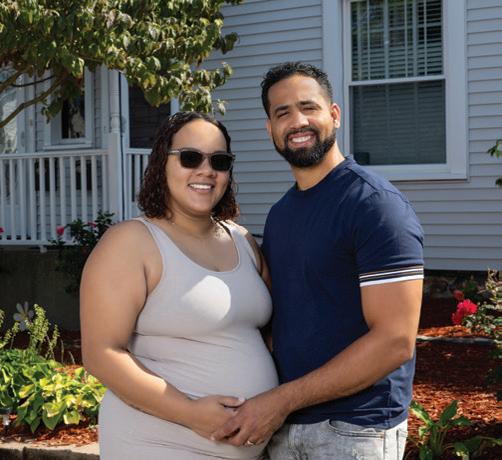

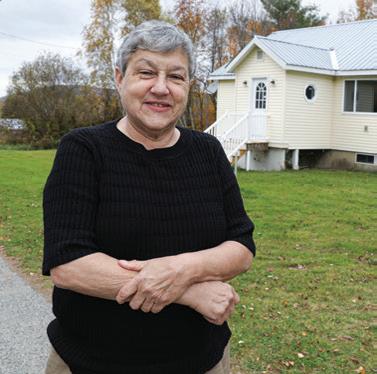


AUGUST 18
New England BIPOC Fest will celebrate food, art, culture and community. By bringing our community together, they hope to cultivate conversation and collective action about the important threads of equity and social justice that hold us all together. Through celebration and joy, BIPOC Fest unites a wide array of community to highlight the rich and diverse histories that make up New England. (newenglandbipocfest.com)
You are cordially invited to CommuniTea, the BWINH Social Club’s monthly virtual meetup for Black women, femmes and nonbinary people in New England happening the third Thursday of every month. Join us for some camaraderie and fun from the comfort of wherever you are. We’ll play games, laugh and get to know each other. Come as you are, this is casual and informal. Don’t forget your tea cup filled with whatever you’d like to have in it. (Join the Facebook group at facebook.com/groups/bwinhsc or fill out the interest form at linktr.ee/)bwinhsc.)

AUGUST 17
To submit multicultural or changemaker events for the next issue, send them to editors@603diversity.com.
COMPILED BY YASAMIN SAFARZADEH / COURTESY PHOTOS
For the fitth annual Manchester Grows Multicultural Art and Plant Festival, the group has teamed up with MyTurn, Waypoint, Opportunity Networks and other partners including Culture Keepers from the Haudenosaunee Nation of Akwesasne to bring you the third annual MyTurn summer mural unveiling. This year with lead artist Yasamin Safarzadeh and her crew under Positive Street Art. Join us for food, sports, music and special guests including Cozy Throne. 12 to 3 p.m., Sheehan-Basquil Park (manchestergrows.org, yasamin@positivestreetart.org, positivestreetart.org, and social media @PositiveStreetArt)
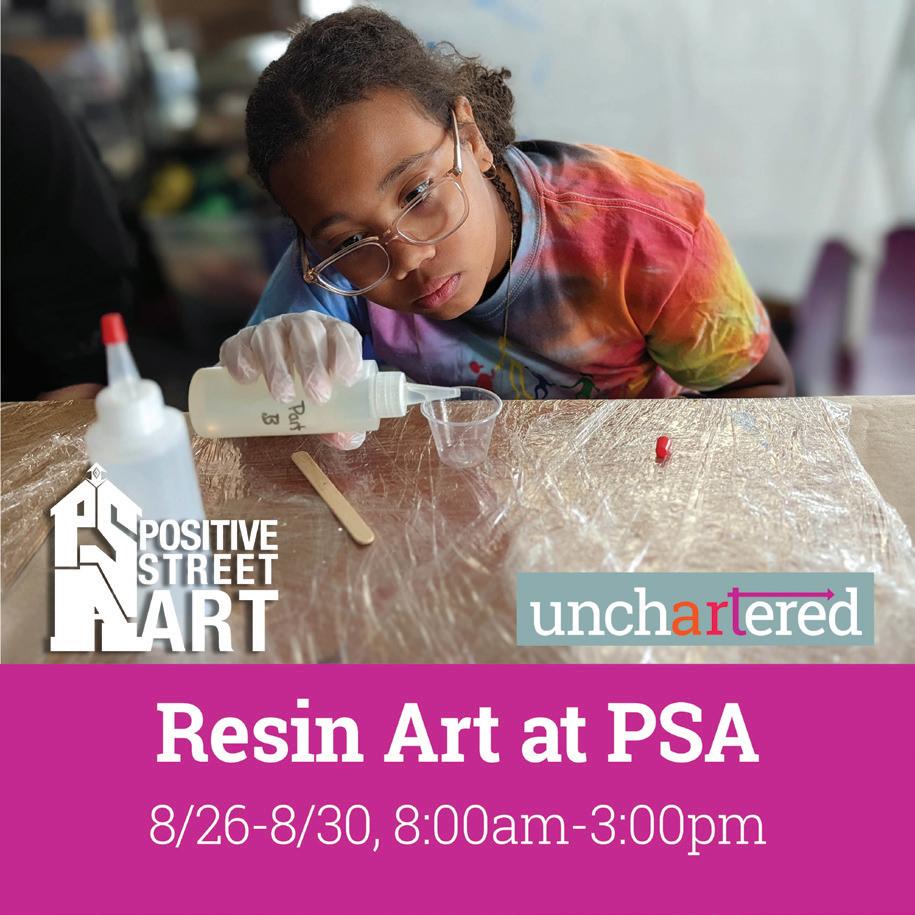
AUG. 26 TO 30
Sign up for a daily, week-long experience! Your student will take Unchartered’s Summer offerings in Positive Street Art’s amazing gallery, classrooms and dance space in Nashua, New Hampshire. Students will learn about color, physics, old-school airplanes (yep, weirdly enough), a little chemistry and lots of art-making. 8 a.m. to 3 p.m. (ambernicole@unchartered.org, 540-724-6724, unchartered.org)
AUG. 25, SEPT. 8
Stanford Cross guides this living tour of “Prince Whipple and the 1779 Petition,” an intimate understanding of Prince Whipple, the brave men who stood with him in signing the Petition of Freedom, and his personal insights into the debates for Independence and his service in the NH militia. The tour takes you to significant sites of his life after freedom, including his family home and the First Ladies African Charitable School established by his wife, Dinah. Discover the lesser-known side of Prince Whipple as an influential event manager. 2 to 3 p.m. (Blackheritagetrailnh.org)
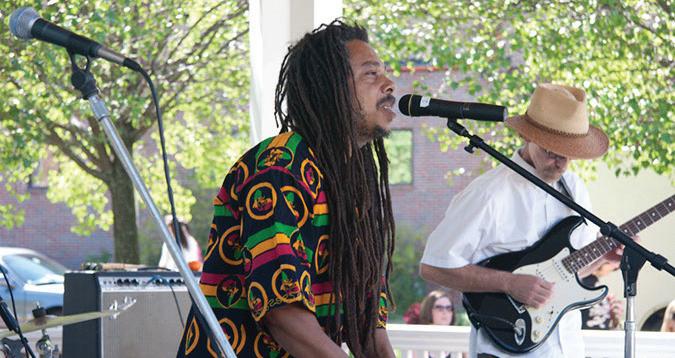
SEPT. 7
The festival, held at Rotary Park and City Hall, highlights the music, arts, crafts and cuisine of our diverse community from our earliest days to recently arrived New Americans. The festival was conceived and is supported by the Laconia Human Relations Committee as well as many local businesses and personal sponsors.10 a.m. to 3 p.m. (laconiamulticulturalfestival.org, on Facebook @LaconiaMulticulturalFestival)
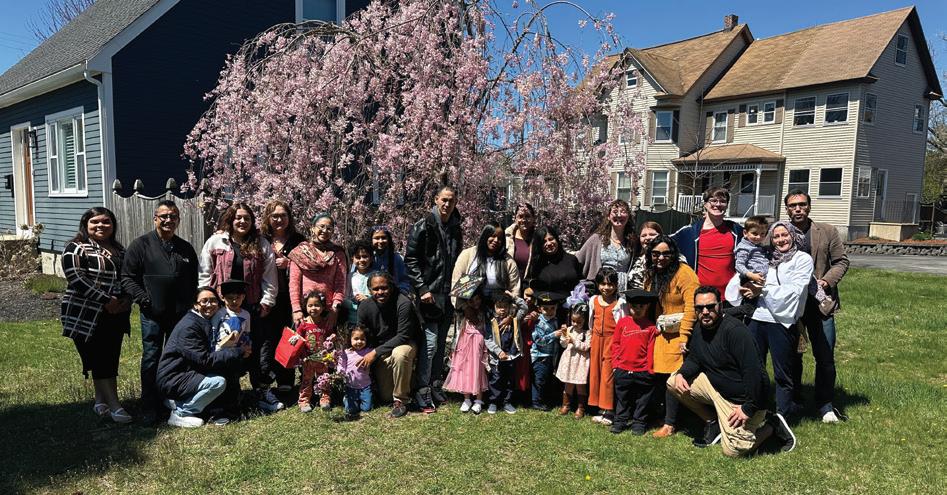
Come see the newly renovated Arlington Street Community Center! Thanks to grants from the CDFA and CDBG, they have been able to make the main floor ADA-compliant complete with new bathrooms, floors and a new accessible entrance. We will be celebrating past events and programs as well as envisioning new opportunities together. 5 to 7 p.m. (Ascc@nashuanh.gov and asccnashua.com)
22
The festival is a vibrant event that celebrates the rich diversity of the capital city. Its mission is to promote cultural understanding and appreciation through a variety of programs and events, including art demonstrations, music and dance performances, and more. We welcome everyone to come and experience the beauty and wonder of our many cultures. 11 a.m. to 5 p.m., Keach Park. (concordnhmulticulturalfestival.org, 603-568-5740, Connect@ConcordNHMulticulturalFestival.org)
NOV. 20
NH Songa hosts the Immigrants In New Hampshire’s Workforce conference. Moving Together Conversations build connections and establish new relationships among local businesses and the immigrant community. They lead to win-win strategies that deepen the inclusion of immigrants and benefit the businesses that support our local economy. Through a one-day conference, attendees will discuss a range of topics from understanding the immigrant community, immigrant talents empowerment, workplace inclusion, DEIJ benefits to the companies, Challenges and Op portunities in NH Welcoming, affirming the contribution of immigrants with facts, state of the state towards immigrant inclusion, policies, and practices to integrate immigrants into the workforce, and the way forward to maintain the momentum. 9 a.m. to 4 p.m., Grappone Conference Center (nhsonga.com, hello@nhsonga.com, (603) 219-5940)
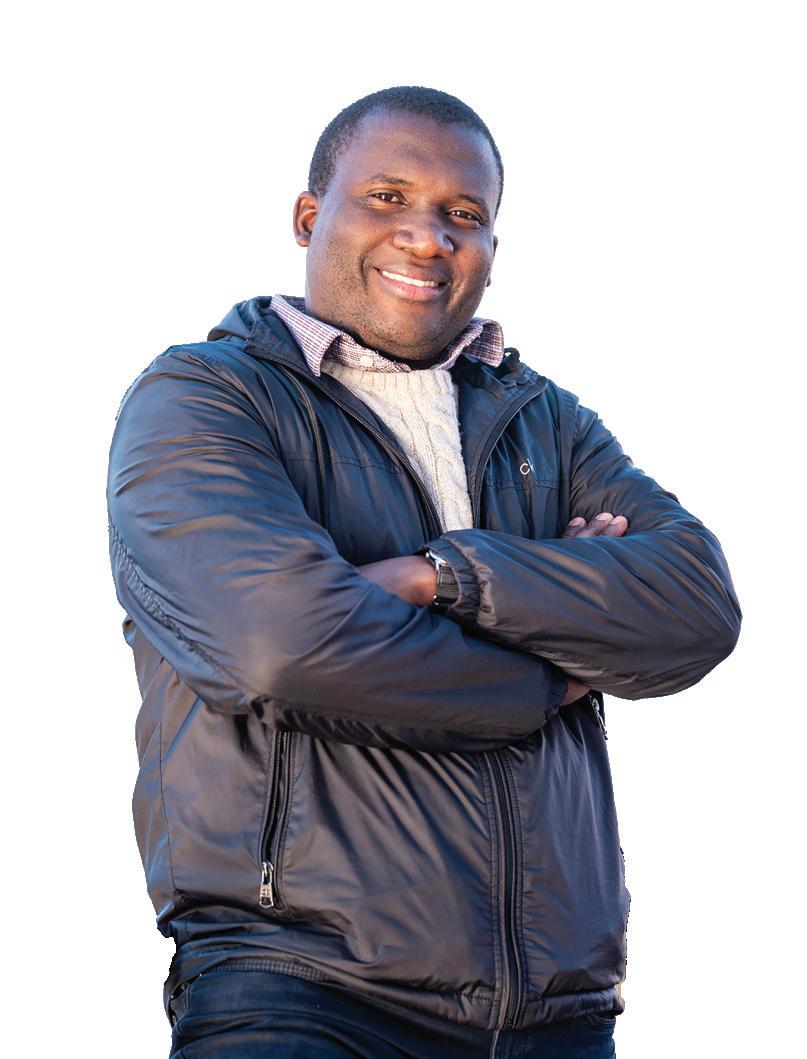
BY LISA CARTER
This spring marked a significant celebration for the Black, Indigenous, and Person of Color (BIPOC) communities in New England as Black Lives Matter NH hosted its Excellence Awards event.
The awards honor outstanding individuals over the age of 14 from various fields, including arts, education, activism, entrepreneurship and more, recognizing their invaluable contributions to the region.
In 2023, the Granite State’s three Black Lives Matter chapters merged to form a single statewide nonprofit: Black Lives Matter New Hampshire.
“This year to incorporate the merger, our awards were held in Manchester with double the attendance from prior years versus the Seacoast,” said Tanisha Johnson of Exeter, co-founder and board chair of Black Lives Matter New Hampshire.
The event was hosted by Lionel Loveless, a board member of both the Business Alliance for People of Color New Hampshire and Black Lives Matter New Hampshire and owner of Officially Knotted Bowties in Stratham.
“(Hosting) the BLM Excellence Awards was special to me, because it was a program celebrating my community that was not available to me when I moved here eight years ago,” Loveless said. “Celebrating the amazing changemakers of color brought me a sense of pride and honor that I hope all people of color in New Hampshire can experience.”
The event featured a keynote address by Flo Nicolas, founder and chief data and innovation strategist at Get Tech Smart.
Nicolas’s keynote theme was a cautionary tale about the dangers of setting unrealistic expectations for Black excellence.
“While we gathered to celebrate the achievements of remarkable individuals in our community, I emphasized that the bar should not
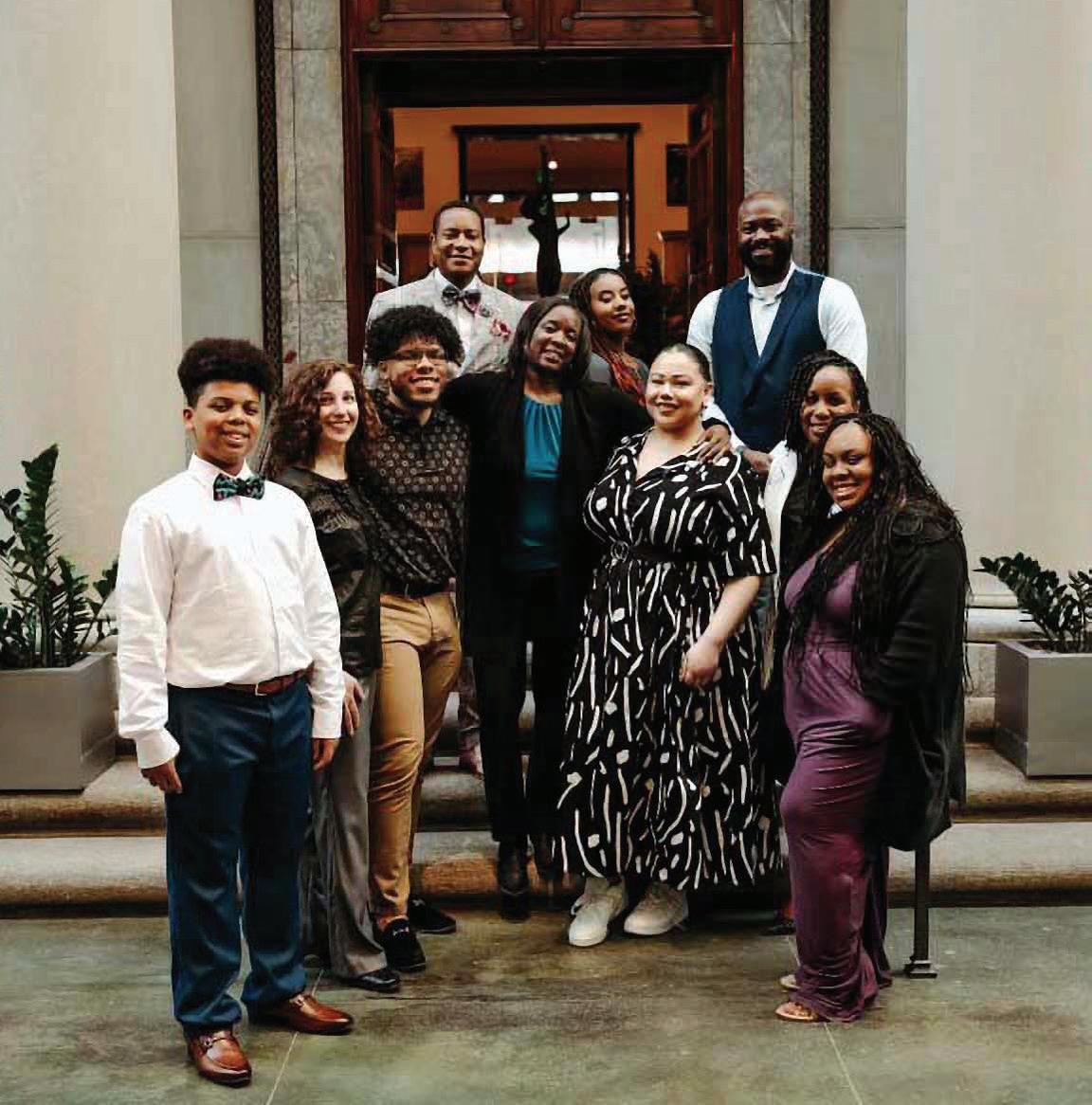
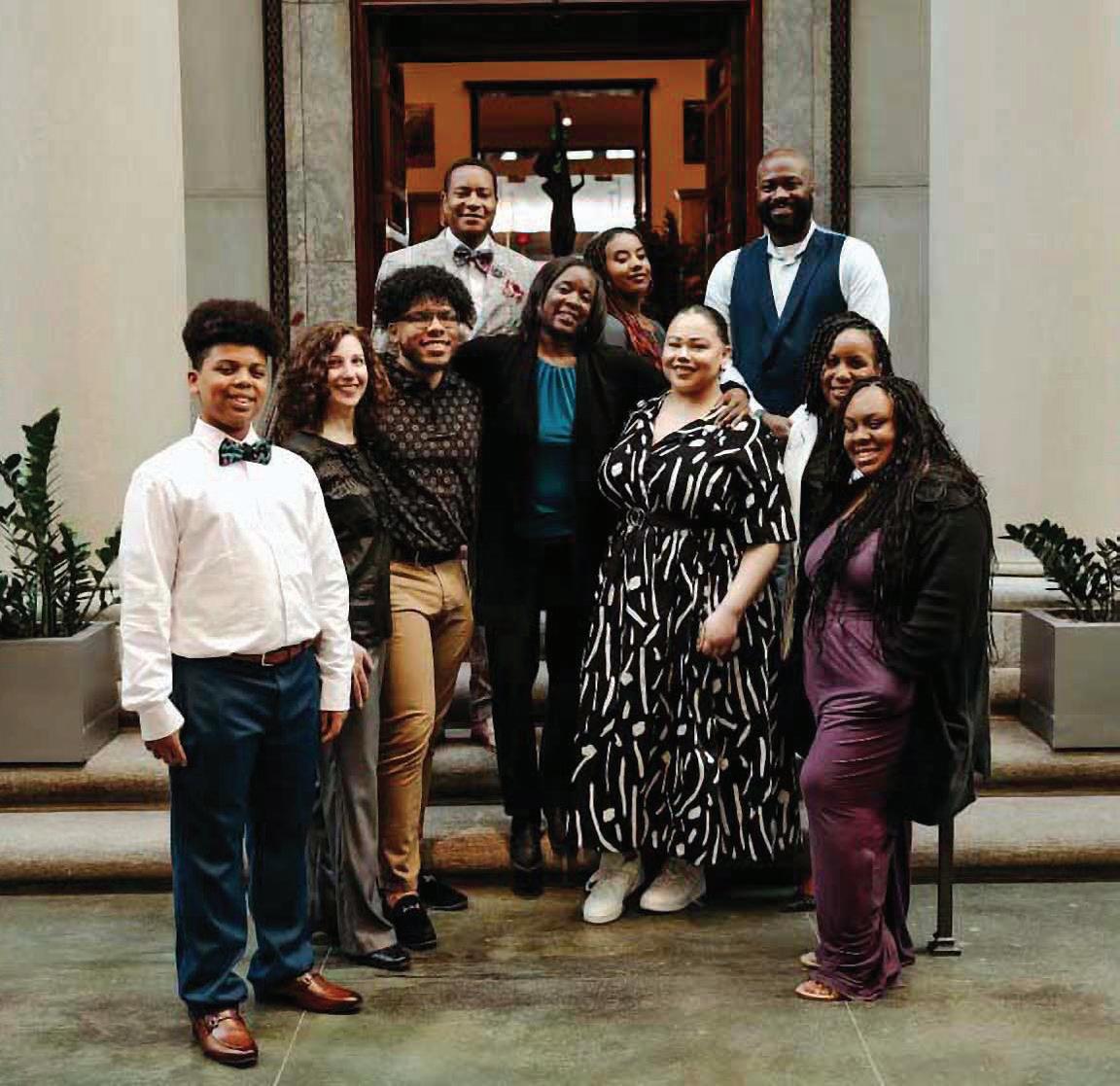
be set so high that it implies only the extraordinary can succeed and that failure is not an option,” Nicolas said. “My goal was to encourage them to continue making a positive impact on their community and advocating for meaningful change. This keynote stood out because it focused on recognizing the often-overlooked individuals who I consider the underdogs. I appreciated the intentionality behind these awards, which ensured that we celebrated and elevated the work of ordinary people, cheering them on as they continue their efforts.”
Seven individuals were honored at the Excellence Awards. Among them were Coyijocalyeea Grimes, who received the Youth Trailblazer Award for her voter engagement work with AFSC NH; Tinotenda Duche, a senior at the University of New Hampshire, who was recognized for her academic brilliance and passion for social justice; and Shantel Palacio, a doctoral candidate at UNH, who was awarded for her groundbreaking research in Leadership and Policy Studies. Other honorees included Diannely Antigua for Excellence in Artistry, Tina Kim Philibotte for her leadership in education, Sarah Krzyzanowski for her accomplishments as a business owner, and Journee LaFond for their extensive community impact and advocacy. The event highlighted the profound contributions of these individuals, celebrating their achievements and inspiring future generations.
“Our awards are the same categories, but this year we had so many nominations of BIPOC leaders, it was a challenge to choose as all were worthy,” Johnson said. “Our community impact leader is always a special award we honor, and this year we were happy to honor Journee who has done so much to make the LGBTQIA+ community more inclusive across the state.”
For more information on Black Lives Matter New Hampshire, visit blmnh.org. 603

